R P L S L T E A G R E X N C U S E N R P N A E O N E P M E A L S J P X N P A R I C H T K S V P A V A R E P O S T E R S R L M E I C S U J Y R Z E G O I F N D H E B H U A A P A H C E T W I N L A K N Y A D T A E I O E T I B R S A P L U T S O R L A C O O C R S D A I I N K L T A O W R G I V O A S U E I T K D I A W N Z G O V O I S L P N H S N X C A N O U E T A C M H R S N M I S A T Q K T F
and Suggestions to Reduce Them PAGE 24 Communicating Your Research Experiences When Applying to Graduate School PAGE 14 When Bad Things Happen, Could Big-Picture Thinking Help? PAGE 36 Leveraging Technology for Health Promotion PAGE 40 SUMMER 2023 | VOL 27 | NO 4
The Hidden Costs of Applying for Graduate School
CONTENTS –––––––––––––––––––––––––––––––––––––––––––––––––––––––––––––––––––––––––––––––––––––––––––––––––––––––––––––––––––––––––––––––
–––––––––––––––––––––––––––––––––––––––––––––––––––––––––––––––––––––––––––––––––––––––––––––––––––––––––––––––––––––––––––––––
WWW.PSICHI.ORG

SUMMER 2023 | VOLUME 27 | NUMBER 4
EDITOR Susan Iles susan.iles@psichi.org
WRITERS/EDITORIAL ASSISTANTS
Bradley Cannon bradley.cannon@psichi.org
Elisabeth Barrett elisabeth.barrett@psichi.org
DESIGNER Janet Reiss janet.reiss@psichi.org
Published by Psi Chi, the International Honor Society in Psychology.
Founded September 4, 1929, at the Ninth International Congress of Psychology, Yale University, New Haven, Connecticut. Member of the Association of College Honor Societies. Eye on Psi Chi ISSN 1092-0803 (print) and ISSN 2164-9812 (online), is published quarterly by Psi Chi, the International Honor Society in Psychology. All contents ©2023 by Psi Chi. The publication schedule follows the academic year: fall, winter, spring, and summer. All opinions expressed in signed ar ticles are those of the author(s) and do not necessarily reflect those of the editors and/or Psi Chi.
EDITORIAL OFFICE:
Psi Chi Headquarters
Street Address: 651 East 4th St., Suite 600 | Chattanooga, TN 37403
Telephone: +1-423-756-2044 Fax: +1-423-265-1529
Email: psichieye@psichi.org | Website: www.psichi.org
Permission must be obtained from Psi Chi to reprint or adapt a table or figure; to reprint quotations exceeding the limits of fair use from one source, and/or to reprint any portion of poetry, prose, or song lyrics. All persons wishing to utilize any of the above materials must write to the publisher to request nonexclusive world rights in all languages to use copyrighted material in the present article and in future print and nonprint editions. All persons wishing to utilize any of the above materials are responsible for obtaining proper permission from copyright owners and are liable for any and all licensing fees required. All persons wishing to utilize any of the above materials must include copies of all permissions and credit lines with the article submission.
Advertisements that appear in Eye on Psi Chi do not represent endorsement by Psi Chi of the advertiser or the product. Psi Chi neither endorses nor is responsible for the content of third-party promotions.
PSI CHI Board of Directors
SOCIETY PRESIDENT
Merry Sleigh, PhD presidentelect@psichi.org
PAST-PRESIDENT
Ngoc H. Bui, PhD president@psichi.org
PRESIDENT-ELECT
Shawn Charlton, PhD presidentelect@psichi.org
EASTERN REGIONAL VICE-PRESIDENT
Jamie Bodenlos, PhD easternvp@psichi.org
MIDWESTERN REGIONAL VICE-PRESIDENT
Cosette Fox, PhD midwesternvp@psichi.org
ROCKY MOUNTAIN REGIONAL VICE-PRESIDENT
Jennifer Grewe, PhD rockymtnvp@psichi.org
SOUTHEASTERN REGIONAL VICE-PRESIDENT
Tammy Lowery Zacchilli, PhD southeasternvp@psichi.org
SOUTHWESTERN REGIONAL VICE-PRESIDENT
Lisa Rosen, PhD southwesternvp@psichi.org
WESTERN REGIONAL VICE-PRESIDENT
Louise Chim, PhD westernvp@psichi.org
EXECUTIVE DIRECTOR
Martha S. Zlokovich, PhD martha.zlokovich@psichi.org
ABBREVIATIONS
APA American Psychological Association
APS Association for Psychological Science
EPA Eastern Psychological Association
MPA Midwestern Psychological Association
NEPA New England Psychological Association
RMPA Rocky Mountain Psychological Association
SEPA Southeastern Psychological Association
SWPA Southwestern Psychological Association
WPA Western Psychological Association
––––––––––––––––––––––––––––Features
28· MENTAL HEALTH Advocacy Considerations for Addressing Children and Adolescent Mental Health Concerns
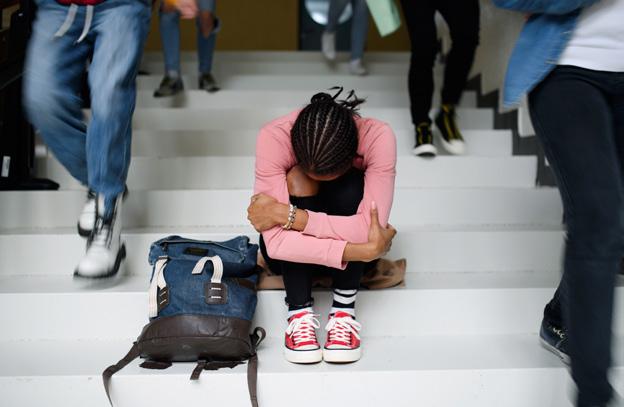

Ashley Diaz, PhD
32 · MENTAL HEALTH
Social Justice and Mental Health: Linking Societal and Relational Issues Matters
Manijeh Daneshpour, PhD, LMFT
20 · INTERNATIONAL Psi Chi Enters China
John Privitera, PhD, and Ge Han R P L S L T E A G R E X N C U S E N R P N A E O N E P M E A L S J P X N P A R I C H T K S V P A V A R E P O S T E R S R L M E I C S U J Y R Z E G O I F N D H E B H U A A P A H C E T W I N L A K N Y A D T A E I O E T I B R S A P L U T S O R L A C O O C R S D A I I N K L T A O W R G I V O A S U E I T K D I A W N Z G O V O I S L P N H S N X C A N O U E T A C M H R S N M I S A T Q K T F 24 · GRADUATE SCHOOL
Adam
2 EYE ON PSI CHI SUMMER 2023 COPYRIGHT © 2023 PSI CHI
The Hidden Costs of Applying for Graduate School and Suggestions to Reduce Them Rebecca A. Weiss, PhD, and Kabrianna Tamura, MA
Columns
7 · PSYCHOLOGY IN THE HEADLINES
Building a Common Thread: Integrating Mental Health Across Our Interactions

Shawn R. Charlton, PhD
12 · FACULTY SUPPORT
Compassion Fatigue as a Growing Concern for Faculty: What It Is and Why It Matters

Seungyeon Lee, PhD
14 · THREE HEADS ARE BETTER THAN ONE Questions (and Answers) About Communicating Your Research Experiences When Applying to Graduate School
Jocelyn Turner-Musa, PhD, Mitch Prinstein, PhD, ABPP, and Julie Radico, PsyD, ABPP
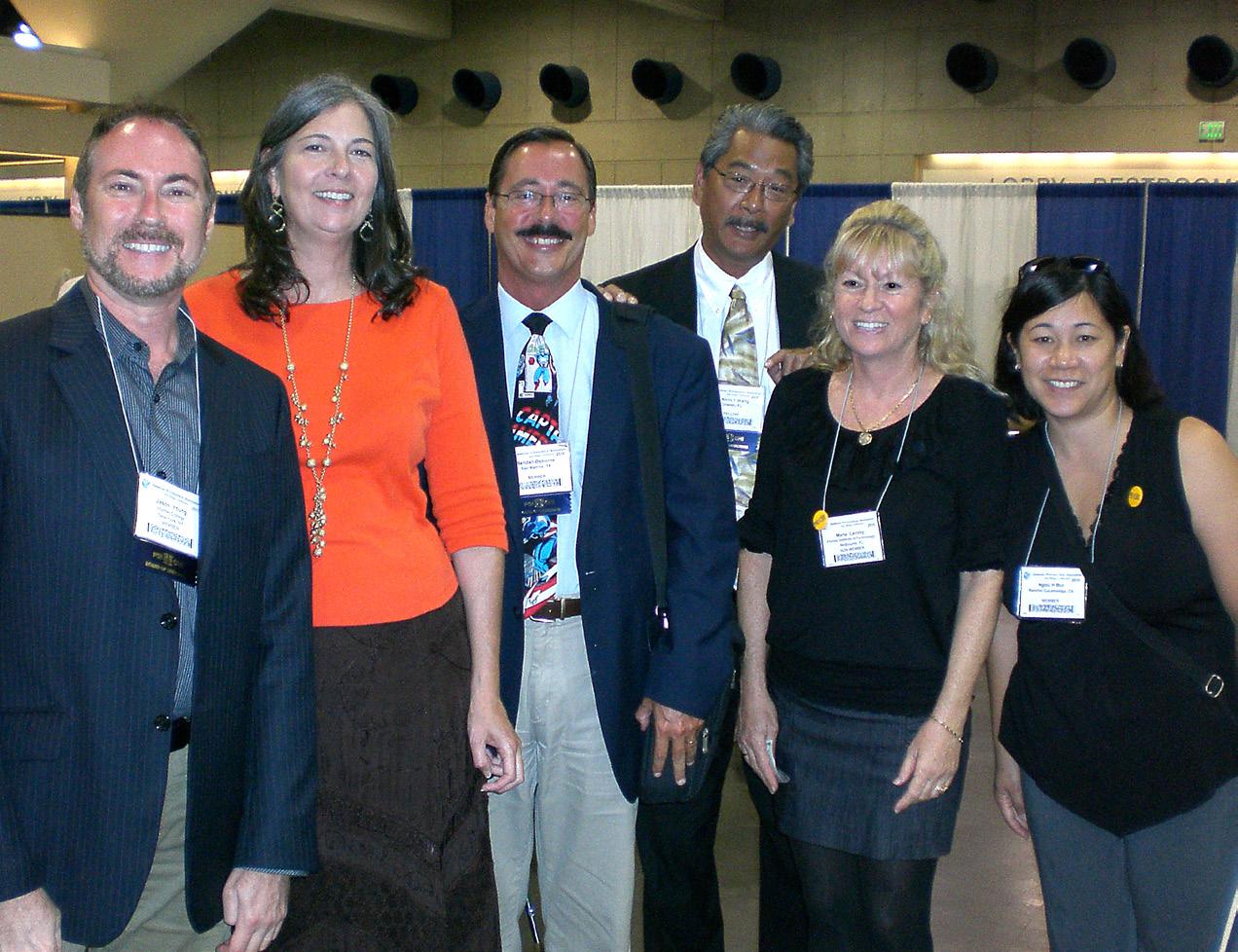
17 · CAREER ADVICE
Surround Yourself With Support: The Importance of Mentors, Advocates, and Sponsors
Diane A. Safer, PhD
36 · DISTINGUISHED LECTURER When Bad Things Happen, Could Big-Picture Thinking Help?
Interview With Marlone Henderson, PhD by Bradley Cannon
Health Promotion
Interview With Sherry Pagoto, PhD by Elisabeth Barrett
CONTENTS
40 · DISTINGUISHED LECTURER Leveraging Technology for
3 SUMMER 2023 EYE ON PSI CHI COPYRIGHT © 2023 PSI CHI Departments 04 President's Message 48 Chapter Activities Advertisements 16 Psi Chi Chapters In Need 35 CSPP Alliant University 39 Christian Ladd Hall Scholarship for Mental Health Advocacy 52 Psi Chi Store
44 · PSI CHI HEADQUARTERS Looking
Back on a
Legacy Interview With Martha Zlokovich, PhD by Bradley Cannon
Leading Into the Future: An Interview With Dr. Marianne Fallon
Merry Sleigh, PhD Psi Chi President
Iam writing, with great pleasure, to share with you a little bit about Psi Chi’s next Executive Director, Dr. Marianne Fallon. Dr. Fallon will take over the Executive Director role on August 1 of this year.
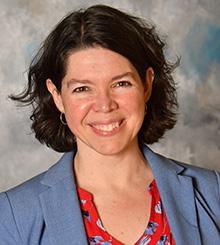
Dr. Fallon has a 12-year history with Psi Chi. In addition to being a chapter faculty advisor, she has published in the Psi Chi Journal of Psychological Research with student coauthors, mentored student research that was recognized with 14 Psi Chi Regional Research Awards, and reviewed international applications on the Scholarship Committee. Her chapter was recognized with the Ruth Hubbard Cousins Chapter Award in 2017. Most recently, Dr. Fallon served as the Eastern Regional Vice-President on the Board of Directors. In that position, she developed programming for four Eastern Psychological Association conventions and shared that those experiences “informed—and transformed—my leadership moving forward.” Her work on the Psi Chi Board will also give her a unique perspective as she steps into the Executive Director position, where she will be a liaison between the Board members and Headquarters staff members.
Dr. Fallon also brings teaching and leadership skills to her new role. During her time at Central Connecticut State University, Dr. Fallon has been an award-winning professor who primarily teaches undergraduate research classes, and she is a recognized expert in best teaching practices on this subject. Her own research focuses on supporting individual growth, a passion which she incorporates into the classroom and her student mentoring. Her leadership positions include being the Associate Vice-President for Academic Affairs at her university, Interim Chairperson of the Department of Theatre, Assistant to the Director of the Center for Teaching and Faculty Development, and a board member for the Eastern Psychological Association. Dr. Fallon has extensive experience managing budgets, evaluating programs, building teams, and motivating individuals. She is also a grant reviewer for the NSF and an expert scorer on the American Association of Colleges and Universities VALUE rubric for quantitative reasoning. Her commitment to students is evident in and extends beyond these leadership roles. For example, she has organized two local student psychology conventions and
facilitated campus-wide workshops to support underrepresented groups and foster inclusivity.
Dr. Fallon is recognized by her colleagues for her compassionate, thoughtful, and respectful leadership. One of her strengths is her collaborative nature built on trusting relationships. Dr. Fallon maintains an open-mind while gathering information and advocates for the needs of others while working toward shared outcomes. The Psi Chi Search Committee was also highly impressed with Dr. Fallon’s commitment to learning and growth. She is an avid reader, turning to empirically driven, best-practices literature to inform every new role or task she undertakes. Last but certainly not least, Dr. Fallon embraces the global mission of our organization. She completed her graduate training in Canada, and while living abroad, took the opportunity to travel around the globe. These experiences reflect the deep respect that she holds for our global members.
I recently had a chance to ask Dr. Fallon to share more about herself.
When and where did you join Psi Chi, and what roles have you held in Psi Chi over the years?
I joined Psi Chi in 1995 as an undergraduate at Bucknell University. I was the faculty advisor for Psi Chi at Central Connecticut State University from Fall 2012 until Fall 2020 and was elected to serve on the Board of Directors as the Eastern Regional Vice-President from 2017 through 2021. I also served as the Chair of the Scholarship Committee.
What made you interested in applying for the Executive Director position?
Psi Chi’s commitment to its mission fuels everything Psi Chi does. I have had a first-row seat to Psi Chi’s many good works and the amazing people behind them. Psi Chi has played such a long-standing and pivotal role supporting the science and application of psychology locally, regionally, nationally, and globally. I felt honored to apply for the position; I was deeply humbled to be offered the role and the opportunity to contribute to an organization that does so much good.
As chapter advisor, I witnessed how Psi Chi connected
PRESIDENT'S MESSAGE ––––––––––––––––––––––––––––––––––––––––––––––––––––––––––––––––––––––––––––––––––––––––––––––––––––––––––––––––––––––––––––––––––––––––––––––––––––––––––––––––––––––––––––––––––––––––––––––––––––––––––––––––––––––––––––––––––––––––––––––––––––––––––––––––––
4 EYE ON PSI CHI SUMMER 2023 COPYRIGHT © 2023 PSI CHI
We thank Dr. Martha Zlokovich for her 15 years of outstanding service as Psi Chi’s Executive Director. During her tenure, she literally transformed our society, modernizing our communication, dramatically increasing member resources and benefits, and expanding us to have an international scope.
Dr. Zlokovich has served and advanced the mission of Psi Chi, as well as creating the scaffold for Psi Chi’s future. She was recently recognized by the Board of Directors as a Distinguished Member. Read our staff interview on page 44.
SECTION EDITOR:
Shawn R. Charlton, PhD University of Central Arkansas
students with each other, opened doors to scholarships and awards, helped students share their research and chapter activity, and catalyzed service to our institutional and surrounding community. As Eastern VP, I had the privilege of supporting regional convention sessions that nurtured student and faculty professional growth and the advancement of psychological research and its application. Further, serving as the chair of the scholarship committee allowed me to help Psi Chi positively impact students’ academic trajectory across our global community. My Psi Chi experiences have been some of the most professionally and personally fulfilling of my life.
Through Psi Chi I have met truly amazing colleagues who I consider mentors and friends. Headquarters staff’s dedication to Psi Chi’s mission is palpable in all they do; they are as incredibly helpful to Board members as they are to all Psi Chi members.
So, when you have an opportunity to apply to lead an organization with a strong mission, a history of positive impact across many contexts, and wonderful people, you recognize it for what it is—a unicorn that somehow found its way into your living room.
What is your favorite Psi Chi memory?
I have so many cherished Psi Chi memories, it’s hard to choose. But here’s one: When I was VP of the Eastern Region, we held a special convention session showcasing Psi Chi Regional Research Award winners doing 2-minute “elevator pitches” of their research. Parents, friends, faculty mentors, and other convention goers came together to support these excellent undergraduate and graduate researchers. The excitement was palpable and students did an exemplary job sharing their research. At the end of the session, a faculty member said that the award ceremony was their favorite session at the convention because they saw enthusiastic presenters sharing research across the full spectrum of the discipline. It gave them hope for the future of our science. I could not agree more.
Tell us about some of your hobbies outside of work.
I love to sing. Ever since high school, I have looked for opportunities to sing whether it was in a chamber choir, large chorale, or a
cappella group. I actually met my partner through a choir!
I enjoy exercising both indoors and out. Although my kids balk at the ever-growing set of free weights and exercise equipment tucked into a corner of our living room, they’ve gotten used to their parents’ early-morning workouts. When the weather cooperates (ah, New England), I like going on walks and hikes.
I’ve also recently begun a practice of 10-minute morning meditations. I find that meditating soon after I wake centers me and helps me remain focused and present for others throughout the day.
I also like to read fiction and nonfiction. I read something every night before I go to sleep—I find that it helps me unwind.
Do you have any TV programs that you are currently binge-watching?
Indeed, I do. So, I am conflicted about admitting this because I severely binged one show when my partner was recently out of town… I watched Wednesday in one sitting. One. Sitting. I love everything about Gwendolyne Christie. We’ve just finished Andor and are currently watching Kim’s Convenience, a charming Canadian comedy.
If you could have anyone in psychology as your mentor, who would you choose and why?
Oh wow. Anyone? I would choose clinical neuropsychologist Brenda Milner for two main reasons. First, she made pioneering discoveries about human memory in the 1950s when women were rarely in a position to do so. She introduced us to the most studied brain of all time, H. M. (Henry Molaison). She defined the distinction between explicit and implicit memory. In short, she helped pave the way for women in science and we stand on her shoulders. Second, she is currently 104 years old and is still studying the human brain. That’s seven decades of advancing our science. I’ll have whatever she’s having!
What is something about you that most people don’t know?
Great, as soon as I tell you, most people will know. Let’s see… can’t tell you anything that might be a security question… Ok, you
PRESIDENT'S MESSAGE
5 SUMMER 2023 EYE ON PSI CHI COPYRIGHT © 2023 PSI CHI
know how most people can roll their tongues into a tube by folding the sides up? I can’t. And fun fact: Most of us were taught that this is a recessive trait. Apparently, it’s not and one might be able to accomplish this party trick with sufficient practice. I’ll keep you updated…
What most excites you as you look toward the future of Psi Chi?
Two things excite me most as I look towards the future of Psi Chi. The first is Psi Chi’s timeless mission: “Recognizing and promoting excellence in the science and application of psychology.” I’m not sure when Psi Chi officially adopted this mission, but it’s as relevant today as it was in 1929 when the Society was chartered and it will continue to guide Psi Chi’s work well into the future.
The second is Psi Chi’s people. The organization attracts so many talented and dedicated people to serve the mission. The Board of Directors contributes fresh ideas, energy, and savvy decision-making rooted in responsibility to the membership; the staff of Psi Chi HQ uses their expertise, tenacity, and steadfast commitment to implement the ideas that best advance the mission and sustain the organization; the faculty that serve on Psi Chi’s committees, advisory boards, and editorial boards continually move us forward. Current student members advance the mission through their local chapter, regional, or (inter)national activity. Lifetime members can participate in local chapter alumni events; advise and mentor current students; and contribute to membership assistance, award and grant programs, and scholarships.
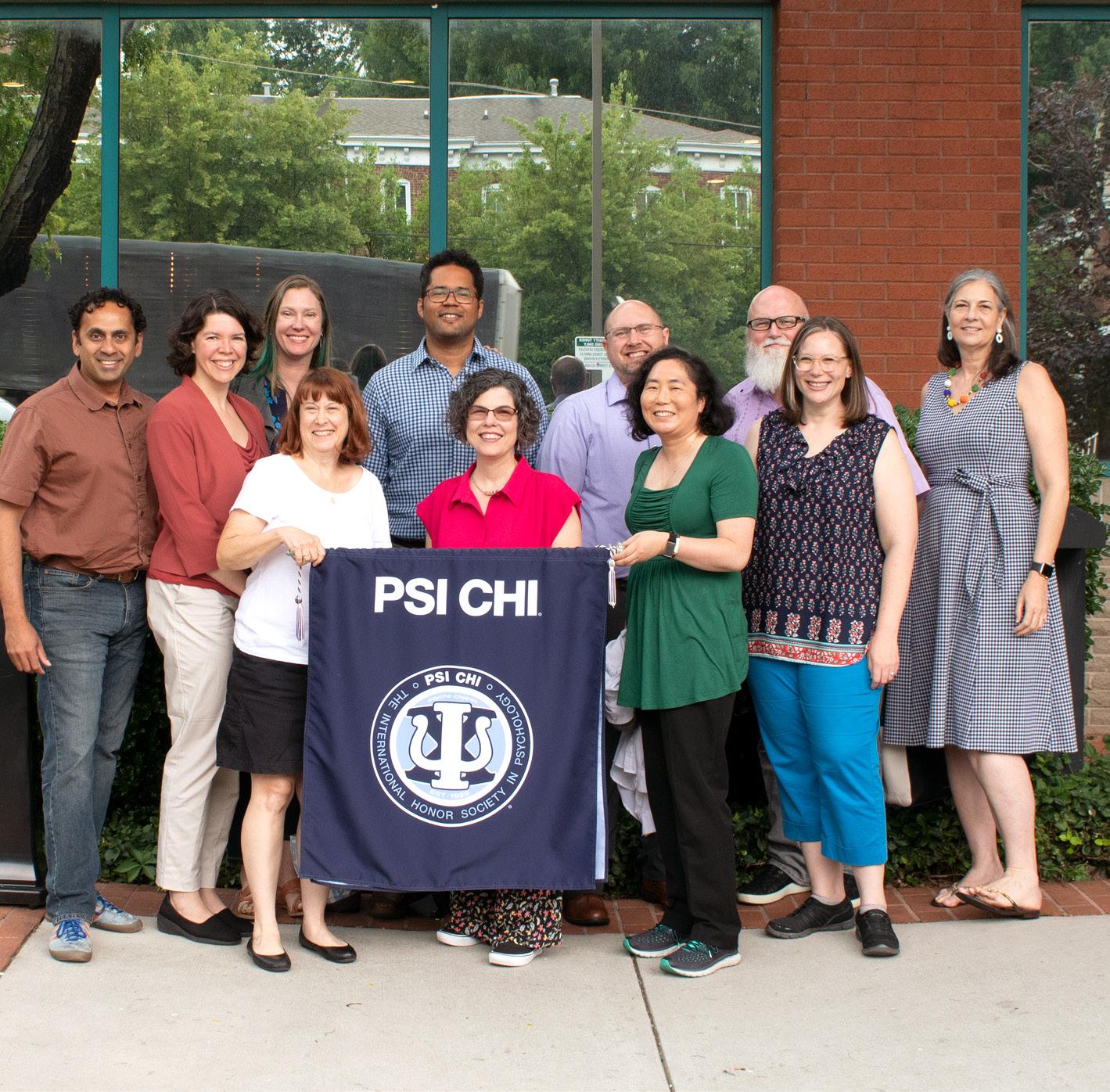
The combination of timeless mission and remarkable people who are committed to its enduring impact assures me that Psi Chi has a bright future. I am so grateful for the opportunity to contrib
What advice do you have for an undergraduate student member and for a graduate student member?
Take advantage of every opportunity that Psi Chi has to offer. Be involved in your local chapter and make connections with your colleagues and with the local community. Submit your work to a Psi Chi publication. Apply for grants, awards, and scholarships. Attend Psi Chi events at conventions and consider whether you might serve as a steering committee member or volunteer for your region. Remember that your membership lasts a lifetime and think about ways you can remain connected to Psi Chi when you are no longer a student.
What is your best advice for Psi Chi faculty advisors?
Before the advice: Thank you. By giving your time and energy as a Psi Chi faculty advisor, you live and breathe our purpose to encourage, stimulate, and maintain excellence while advancing the science of psychology. Your job is not easy, but it is essential for Psi Chi to actualize its mission. Now for the advice: Your Psi Chi chapter is a unique opportunity to cultivate an inclusive community of scholars who are passionate about psychology. That passion can manifest in many ways—through research, leadership, and engagement with each other and the local community. Support students in building that community and remind them that they are part of a broader network that shares their passion. It also helps to remind yourself that you, too, are part of this global community and have access to other faculty advisors, regional VPs, and various supports. Seek us out.
What
advice do you
have for our professional members who are no longer in school?
I am reminded of key elements in Psi Chi’s induction ceremony, which transcends specific epochs in one’s life. Psi Chi’s motto is “Psyche Cheires” which could be expressed as “cooperation in the investigation and cultivation of the mind.” Embracing that motto means that you are committed to lifelong learning and connection with others. The ritual goes on to say that, as you continue to learn and are open to different perspectives, you will become ever more dissatisfied with the gaps in our understanding. Our professional members have opportunities to fill those gaps to make our personal and collective understanding richer.
Filling the gaps can come in many forms. Perhaps you help your organization understand how to better support employees; perhaps you teach others how to develop cognitively and socioemotionally; perhaps you empirically examine psychological phenomena and share your findings with the scientific community and general public; perhaps you directly apply psychology to help others improve wellness. Whatever you do as a professional and however you do it, continue finding gaps, filling those gaps through cooperation and sound investigation, and supporting others in their pursuit of that ideal.
I hope you have enjoyed learning more about Dr. Marianne Fallon, our next Executive Director. As you clearly can see, our organization is in good hands moving forward. Please join me in welcoming Dr. Fallon and looking forward to an exciting future for our members.
PRESIDENT'S MESSAGE ––––––––––––––––––––––––––––––––––––––––––––––––––––––––––––––––––––––––––––––––––––––––––––––––––––––––––––––––––––––––––––––––––––––––––––––––––––––––––––––––––––––––––––––––––––––––––––––––––––––––––––––––––––––––––––––––––––––––––––––––––––––––––––––––––
6 EYE ON PSI CHI SUMMER 2023 COPYRIGHT © 2023 PSI CHI
Building a Common Thread: Integrating Mental Health Across Our Interactions
 Shawn R.
PhD University of Central Arkansas
Shawn R.
PhD University of Central Arkansas
Welcome to the summer edition of Psychology in the Headlines! We have a great group of headlines for you, including glass child syndrome, the rise of online sports betting, imposter syndrome in college students, and loneliness. Although we didn’t do this intentionally, all four headlines relate to feelings of belongingness and visibility. Once we saw that connection, we became very hopeful that readers would be empowered and motivated by these headlines to be ambassadors for connection among their circle of influence.
Before you head to the headlines, I have a post-Mental Health Awareness month invitation. Over the past four years, I’ve been part of an exceptional group of faculty redesigning our Bachelor of Science in psychology at the University of Central Arkansas. Two observations triggered this redesign. First, graduating seniors demonstrated that many of our majors struggle to identify a common theme across the program. Second, most students in our classes are not psychology majors, and most psychology majors don’t pursue careers in psychology.
Discussing how to design a program to address these challenges (and a handful of others we identified) led me to search for a common theme that would cut across our courses and areas of interest as well as be useful to students regardless of future careers. This was a tough task. The unexpected death of a dear family friend led me to the link I was seeking.
Christian Ladd Hall passed away from an accidental fentanyl overdose in July 2022. The last ten years of Christian’s life were complicated by bipolar II disorder (please see, and, if you are in a position to do so, donate to Psi Chi’s Christian Ladd Hall Scholarship for Mental Health Advocacy, named in honor of Christian https://www.psichi.org/page/ChristianLaddHallScholarship). As I reflected on Christian’s life and how earlier and more comprehensive
mental health advocacy might assist other individuals with negative mental health struggles, I stumbled upon (Ouch! Eureka!) that common, highly relevant regardless of the professional path, thread that I sought: Mental health.
Mental health (both positive aspects, such as subjective well-being, and negative aspects, including mental illness or distress; Schönfeld et al., 2023) is in and applies to everything we discuss and do in psychology. Integrating mental health discussions and skills across our curriculum and daily interactions provides a thread that ties together the different aspects of psychology (even basic laboratory work is applicable). Mental health discussions also empower others to proactively manage their mental health across personal and professional contexts. Additionally, talking about mental health increases the likelihood of people experiencing a mental health challenge to seek care and decreases the stigma associated with negative mental health.
I’ve found great value over the past year in integrating mental health discussions into my personal life, classroom, and community service. I invite you to give it a try. If you are a student, you might use mental health as a way to create conceptual links across content in different psychology and related courses. If you are an instructor, you might add conversations about mental health into a class topic (such as the impact of healthy eating on mental health in a biopsychology course; Reichelt et al., 2017). If you accept this invitation, let me know it goes (scharlton@uca.edu).
Photo Credit: Shutterstock.com/ RAWPIXEL.COM ––––––––––––––––––––––––––––––––––––––––––––––––––––––––––––––––––––––––––––––––––––––––––––––––––––––––––––––––––––––––––––––––––––––––––––––––––––––––––––––––––––––––––––––––––––––––––––––––––––––––––––––––––––––––––––––––––––––––––––––– PSYCHOLOGY IN THE HEADLINES
Reichelt, A. C., Westbrook, F. R., & Morris, M. J. (2017). Editorial: Impact of diet on learning, memory and cognition. Frontiers in Behavioral Neuroscience, 11 (96). https://doi.org/10.3389/fnbeh.2017.00096 Schönfeld, P., Brailovskaia, J., & Margraf, J. (2017). Positive and negative mental health across the lifespan: A cross-cultural comparison. International Journal of Clinical and Health Psychology, 17 (3), 197–206. https://doi.org/10.1016/j.ijchp.2017.06.003
References
Charlton,
I'm struggling today Do you want to talk about it? It's been a hard week. What's going on? 7 SUMMER 2023 EYE ON PSI CHI COPYRIGHT © 2023 PSI CHI
Glass Child Syndrome: TikTok Fad or Unaddressed Area of Need?
Shawn R. Charlton, PhD
University of Central Arkansas
Ashlin Charlton
Brigham Young University (UT)
When Ashlin first suggested we write a headline on glass child syndrome (GCS), I thought, “cool,” and started organizing my thoughts on childhood resilience. A “glass child” would be highly fragile, right? Wrong. If I weren’t a non-TikToker, the early 2023 wave of creators posting about their experiences as “glass children” would have saved me from this error (Schewitz, 2023; Stinson, 2023). Fortunately, I now know that GCS is not about resilience—but resilience may be an important factor (Bellin & Kovacs, 2006)—but about the lived experiences of children with a sibling requiring increased parental involvement due to a disability or other high-attention need. The characteristic of “glass” referenced in the term is transparency, not fragility.
TikTokers’ interest in GCS might have originated from several popular TEDx videos, including Alicia Maples's (2010) experiences growing up with a brother with autism, Jamie Guterman’s (2017) experiences as a high school junior with an older sibling with special needs (by the way, I felt validated when Guterman acknowledged the possibility that people might think of the fragility of glass when they hear of GCS), and Dellara Sheibani’s (2021) experiences as a glass child.
Although the experiences of individuals identifying as glass children are easily found on TikTok and in TEDx talks, we found less success finding the idea in the psychological literature. A PsycINFO search on February 17, 2023, using the terms “glass child” or “glass children” found only one relevant article (a similar Google Scholar search faired no better). In that one article, Hanvey et al. (2022) conducted structured interviews with 16 individuals who fit the common definition of a glass child. They concluded their report with this takeaway:
This study demonstrates that many of the negative outcomes reported by siblings are not, in fact, the direct result of their brothers' or sisters' conditions, but rather the consequences of this insufficient understanding and support. Even for those with the advantage of a supportive social network, and the full recognition and meeting of their needs by others, it is undeniable that being a sibling is a hugely impactful identity and experience. (pg. 11)

The social media popularity of the glass child, contrasted with the scientific literature’s silence on the term, demonstrates the uniqueness of the experience of children growing up in a family with a sibling who requires increased parental involvement. However, although the experiences shared by glass children share the common experience of a sibling with unique needs, the experience may not be limited to these children. Rather, the “glass child” may be another manifestation of the “middle child” (Barrand, 2023) or any other context in which parental involvement is unequal. The possibility that GCS isn’t a unique syndrome does not invalidate anyone’s lived experiences but connects their experiences with those shared by many others and reminds us all of the need to “see” everyone.
References
Barrand, R. (2023, January 9). What is a glass child? Meaning explained - plus symptoms of middle child syndrome and youngest child traits. National World. Retrieved February 17, 2023, from: https://www.nationalworld.com/ lifestyle/family-and-parenting/glass-child-middle-child-syndrome-youngest-child-traits-3980081 Bellin, M. H., & Kovacs, P. J. (2006). Fostering resilience in siblings of youths with a chronic health condition: A review of the literature. Health & Social Work, 31 (3), 209–216. https://doi.org/10.1093/hsw/31.3.209
Guterman, J. (2017, July 1). Recognising glass children [Video]. TEDxYouth@SRDS. https://youtu.be/J3-uT2OCd30
Hanvey, I., Malovic, A., & Ntontis, E. (2022). Glass children: The lived experiences of siblings of people with a disability or chronic illness. Journal of Community & Applied Social Psychology, 32 (5), 936–948. https://doi.org/10.1002/casp.2602
Maples, A. (2010, December 27). Recognising glass children [Video]. TEDxSanAntonio. https://www.youtube.com/watch?v=MSwqo-g2Tbk
Schewitz, K. (2023, January 11). What is the meaning of ‘glass child’ syndrome, TikTok’s latest therapy trend? HITC. https://www.hitc.com/en-gb/2023/01/11/
Sheibani, D. (2021, August 12). The story of a glass child [Video]. TEDxPhillipsExeterAcademy. https://youtu.be/ok3spKeh8rc
Stinson, K. (2023, February 6). TikTok creators are jumping into the glass child discourse—What is a glass child? Distractify. https://www.distractify.com/p/what-is-a-glass-child-tiktok
Photo Credit: Shutterstock.com/ SEVENTYFOUR
PSYCHOLOGY IN THE HEADLINES ––––––––––––––––––––––––––––––––––––––––––––––––––––––––––––––––––––––––––––––––––––––––––––––––––––––––––––––––––––––––––––––––––––––––––––––––––––––––––––––––––––––––––––––––––––––––––––––––––––––––––––––––––––––––––––––––––––––––––––––––
8 EYE ON PSI CHI SUMMER 2023 COPYRIGHT © 2023 PSI CHI
The (Unfortunate) Rise of Online Gambling
Tristan Brass and Shawn R. Charlton, PhD University of Central Arkansas
Thanks to rapidly advancing mobile technology and changes in cultural views on gambling, online sports betting has become a prevalent form of gambling worldwide. Online gambling is popular (and problematic) due to the ability to place bets and view results from anywhere, at any time, and on various outcomes, such as game winner, final score, and individual performance. Mobile apps also have the ability to provide realtime notifications, event reminders, and other lights and sound to capture—and hold—the bettors' attention. Online gambling has put Las Vegas in the palms of our hands!
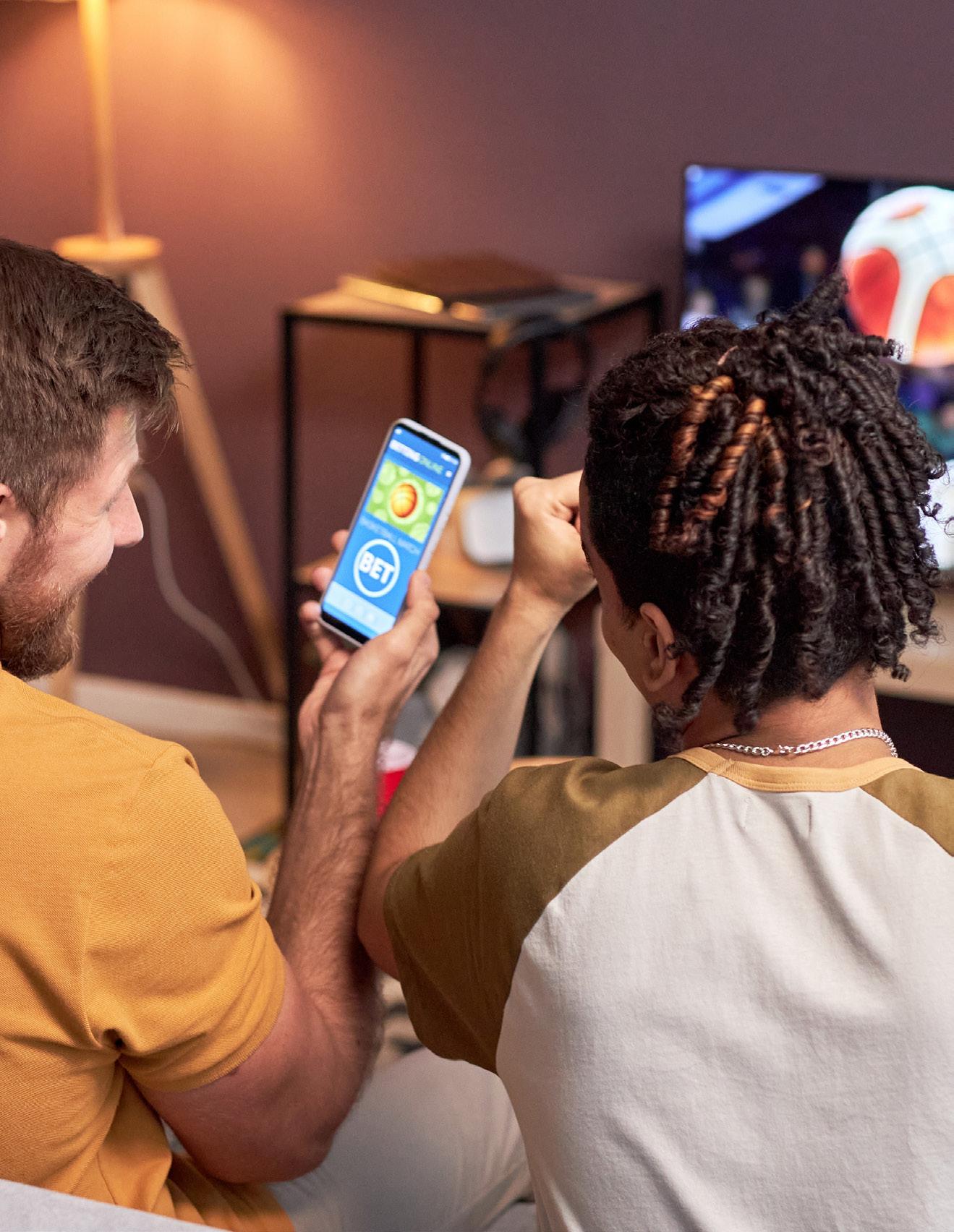
Although the rise of online gambling is new, gambling has long been a part of human history and is often considered an exciting and fun activity (Whelan, 2023). However, gambling can become problematic for some individuals, leading to addiction and negative consequences (Ginley, 2023). The easy access and always-on nature of online gambling could encourage compulsive behavior. Additionally, online sports betting offers a sense of anonymity, and bettors can easily conceal their gambling activity from others, making it easier for individuals to engage in excessive gambling behavior.
Online sports betting has only been legal in the United States since 2018, when the U.S. Supreme Court overturned a ban on this form of gambling (Horn, 2023). Since then, 33 states and Washington D.C. have legalized online sports betting, three more states have legalized it but not yet launched it, and another eight states have active legislation in the works to legalize online sports betting. As a result, there were an estimated 19 million online sports bettors in the United States in 2022 (American Gaming Association, 2023; Nower, 2023). In February 2023, the NFL Super Bowl attracted as many as 50 million bettors who risked the equivalent of about 16 billion USD (Browne, 2023).
Many researchers worry about the effects that this sort of easy-access gambling may have on people, especially when it comes to younger populations (Horn, 2023). Research suggests that online sports betting attracts younger audiences who spend more recklessly than their older counterparts. Furthermore, online sports betting is also associated with an increased risk of developing long-term problems with gambling, increased drug and alcohol usage, and higher rates of depression and anxiety— not to mention financial losses (Nower, 2023). Long-term gamblers have also been shown to develop tolerance similar to that experienced by drug users (Whelan, 2023).
Ginley (2023) suggests several ways to minimize the risks associated with online sports betting while continuing to enjoy the entertainment value: (a) setting spending and/or loss limits, (b) viewing betting similar to buying a movie ticket—a way to spend a little extra money to make an exciting experience even more enjoyable, and (c) remembering that the goal of the online gambling company is to turn a profit.
For people struggling with their online gambling or with questions about their level of play, the National Council on Problem Gambling’s responsibleplay.org (https://responsibleplay.org/) may provide additional resources and strategies to help. Additional
resources can be found through National Problem Gambling Helpline (Call: 1-800-522-4700; Chat: ncpgambling.org/chat; Text 1-800-522-4700) and/or GamTalk Online Support for Gambling Issues (http://www.gamtalk.org/).
References
American Gaming Association. (2023, January 31). Interactive U.S. map: Sports betting. https://www.americangaming.org/research/state-gaming-map/ Browne, C. (2023, February 7). Record 50 million Americans to wager $16B on Super Bowl LVII . American Gaming Association. https://www.americangaming.org/new record-50-million-americans-to-wager-16b-on-super-bowl-lvii/ Ginley, M. (2023, February 6). Sports betting apps' notifications and leaderboards encourage more and more wagers—A psychologist who treats gambling addictions explains why some people get hooked. The Conversation. https://theconversation.com/sports-betting-apps-notifications-and-leaderboards-encouragemore-and-more-wagers-a-psychologist-who-treats-gambling-addictions-explains-why-some-people-gethooked-198358 Horn, T. (2023, February 7). I treat people with gambling disorder—and I'm starting to see more and more young men who are betting on sports. The Conversation. https://theconversation.com/i-treat-people-with-gamblingdisorder-and-im-starting-to-see-more-and-more-young-men-who-are-betting-on-sports-198285 Nower, L. (2023, February 9). Data from New Jersey is a warning sign for young sports bettors. The Conversation. https://theconversation.com/data-from-new-jersey-is-a-warning-sign-for-young-sports-bettors-197865 Whelan, J. (2023, February 8). Millions of Americans are problem gamblers—so why do so few people ever seek treatment? The Conversation. https://theconversation.com/ millions-of-americans-are-problem-gamblers-sowhy-do-so-few-people-ever-seek-treatment-197861
––––––––––––––––––––––––––––––––––––––––––––––––––––––––––––––––––––––––––––––––––––––––––––––––––––––––––––––––––––––––––––––––––––––––––––––––––––––––––––––––––––––––––––––––––––––––––––––––––––––––––––––––––––––––––––––––––––––––––––––– PSYCHOLOGY IN THE HEADLINES Photo Credit: Shutterstock.com/ SEVENTYFOUR
9 SUMMER 2023 EYE ON PSI CHI COPYRIGHT © 2023 PSI CHI
Imposter Syndrome Among College Students: What Is It and How We Care?
 Seungyeon Lee, PhD University of Central Arkansas
Seungyeon Lee, PhD University of Central Arkansas
Usually, college students imagine their experiences will follow a certain script. Imagine that you are a first-year college student. Your friends, peers, family, and professors constantly ask how you are doing, ask what you have been engaged in, and tell you how great college life is. You nod your consent, even if you do not completely agree. And your daily social media browsing shows you hundreds of other first-year students having the times of their lives. So many great and shareable moments! You all seem to be living your best life, but is all this authentic?
Most college students ask some of these questions: Am I doing what I should right now? Is college/university right for me? Why do I feel I am faking something and playing a role that does not belong to me? These questions and others related to them can produce feelings of inferiority and lead to the youth experiencing imposter syndrome (Ramirez et al., 2023).
Imposter syndrome is associated with fear, where the individual thinks they do not represent a true version of themselves and feel incompatible with others. Ramirez et al. (2023) indicated that college students from underrepresented groups continue to experience cultural, gendered, and/or social isolation, which strengthens their experience of imposter syndrome (which causes them to withdraw socially, further exacerbating the imposter syndrome). Although the number of college students reporting imposter syndrome is growing, most institutions that Ramirez
and colleagues investigated do not provide educational interventions to help make the college transition successful.
Imposter syndrome is one of the mental health issues with which healthcare professionals grapple—unlike anxiety or depressive disorders. People see a collection of recognizable traits of being inferior, but the given syndrome alone does not disrupt normal functioning. Still, the “puzzling feature” of being an imposter (Gadsby, 2020) could decrease academic performance and increase college students’ burnout (Freeman & Peisha, 2021). Feelings of inferiority could bring excessive fear, anxiety, and stress in the long run.
Possible interventions that campus mental health professionals can incorporate include: (a) Fostering a safe learning environment on campus, (b) promoting awareness campaigns, and/ or (c) addressing systematic barriers to active help-seeking with peer group support (Freeman & Peisha, 2021). Detecting early signs that can lead to a mental health disorder is critical. From an individual standpoint, being mindful of imposter syndrome could be a step to thinking about your ownership of how you navigate your way through life. From a community perspective, awareness of how contextual changes can exacerbate imposter syndrome can remind us to be mindful of developmental transition periods, such as going to college.
References
Freeman, J., & Peisha, C. (2022). Imposter syndrome in doctors beyond training: A narrative review. Australasian Psychiatry, 30 (1), 49–54. https://doi.org/10.1177/10398562211036121
Gadsby, S. (2020). Imposter syndrome and self-deception. Australasian Journal of Philosophy, 100 (2), 246–261. https://doi.org/10.1080/00048402.2021.1874445
Ramirez, B. R., Puente, M., & Contreras, F. (2023). Navigating the university as nepantleras: The college transition experiences of Chicana/Latina undergraduate students. Journal of Diversity in Higher Education. Advance online publication. https://doi.org/10.1037/dhe0000463
Photo Credit: Shutterstock.com/ PROSTOCK-STUDIO
PSYCHOLOGY IN THE HEADLINES ––––––––––––––––––––––––––––––––––––––––––––––––––––––––––––––––––––––––––––––––––––––––––––––––––––––––––––––––––––––––––––––––––––––––––––––––––––––––––––––––––––––––––––––––––––––––––––––––––––––––––––––––––––––––––––––––––––––––––––––––10 EYE ON PSI CHI SUMMER 2023 COPYRIGHT © 2023 PSI CHI
The COVID Pandemic Is Over (We Think) But the Loneliness Has Yet to Go Away
Shawn R. Charlton, PhD University of Central Arkansas
Like any major system disruption, the COVID-19 pandemic created physical, psychological, and social ripples that have not yet settled. One of these is the “loneliness pandemic” (Sweet, 2021). Although all of us are alone sometimes, many people feel alone most of the time. And this feeling of loneliness—even when we are together—just doesn’t want to go away.
In thinking about loneliness, it is important to distinguish between physical loneliness (i.e., being outside the physical proximity of a desired social group) and perceived loneliness (i.e., the psychological feeling of being disconnected, unnoticed, and/or excluded from a desired social group). Physical loneliness only occurs when others are absent. Perceived loneliness can occur when others are absent and when they are present (which is frequently the most painful type of loneliness). Loneliness research suggests that the perception of being alone—not the actual physical state—creates the largest negative health impacts (Cacioppo & Hawkley, 2009).
These health impacts can be significant (El-Hadi & Merino, 2023). Cacioppo and Hawkley (2009) suggest that perceived loneliness can lead to increased blood pressure, increased morning cortisol levels, changes in cognitive functioning, changes in IQ, and gene expression. Holt-Lunstad and colleagues (2015) demonstrated that loneliness could be associated with increased mortality, particularly in persons younger than 65.
Loneliness, it has long been believed, may be associated with increased violence. Writing for ABC News, Mary Kekatos (2023) discussed the potential use of social isolation (a distinct but related concept to loneliness) as a potential risk indicator (Lippke & Warner, 2023) for mass shootings. Brian McNeill (2023) discussed findings by Samuel West and his research team that found social isolation to be a predictor of mass shootings in a statistical model of the behavior of 177 mass shooters. Although loneliness and social isolation may predict violence, Kekatos and McNeill point out that violent behavior is multidimensional, complex, and unlikely to be caused or predicted by a single factor.

The International Association of Applied Psychology (IAAP) highlighted the importance of loneliness by publishing a special issue of their journal Applied Psychology: Health and Well-Being in February 2023 featuring research on loneliness and health (many of the articles are open access, check them out: https://iaap-journals.onlinelibrary.wiley.com/ toc/17580854/2023/15/1).
With a greater understanding of loneliness comes more investment and interest in developing programs, policies, and technologies to address loneliness (Steptoe, 2023). Communitybased programs and policies can be important tools in addressing this social pandemic. However, one of the things that I find most encouraging is that we all have the tools and opportunity to fight against loneliness in our individual spheres of influence. And, any attempt to reduce another’s loneliness most likely brings the same benefits into our lives as well.
References
Cacioppo, J. T., & Hawkley, L. C. (2009). Perceived social isolation and cognition. Trends in Cognitive Sciences, 13 (10), 447–454. https://doi.org/10.1016/j.tics.2009.06.005
El-Hadi, N., & Merino, D. (2023, February 16). Loneliness is making us physically sick, but social prescribing can treat it—podcast. The Conversation. Retrieved February 17, 2023, from: https://theconversation.com/ loneliness-is-making-us-physically-sick-but-social-prescribing-can-treat-it-podcast-199939
Holt-Lunstad, J., Smith, T. B., Baker, M., Harris, T., & Stephenson, D. (2015). Loneliness and social isolation as risk factors for mortality: A meta-analytic review. Perspectives on Psychological Science, 10 (2), 227–237. https://doi.org/10.1177/1745691614568352
Lippke, S., & Warner, L. M. (2023). Understanding and overcoming challenges in times of personal or global crisis— Editorial on the Special Issue on Loneliness and Health. Applied Psychology: Health and Well-Being, 15 (1), 3–23. https://doi.org/10.1111/aphw.12420
Kekatos, M. (2023, January 26). As US reels from multiple mass shootings in California, can loneliness be a trigger for violence? ABC News.
https://abcnews.go.com/Health/us-reels-multiple-mass-shootings-loneliness-trigger-violence/story?id=96632046
McNeil, B. (2023, February 17). Addressing social isolation may be key in preventing mass shootings, study finds. VCU News. https://www.news.vcu.edu/article/2023/02addressing-social-isolation-may-be-key-in-preventing-massshootings-study-finds
Sweet, J. (2021, January–February). The loneliness pandemic. Harvard Magazine. https://www.harvardmagazine.com/2021/01/feature-the-loneliness-pandemic
Photo Credit: Shutterstock.com/ FIZKES
––––––––––––––––––––––––––––––––––––––––––––––––––––––––––––––––––––––––––––––––––––––––––––––––––––––––––––––––––––––––––––––––––––––––––––––––––––––––––––––––––––––––––––––––––––––––––––––––––––––––––––––––––––––––––––––––––––––––––––––– PSYCHOLOGY IN THE HEADLINES 11 SUMMER 2023 EYE ON PSI CHI COPYRIGHT © 2023 PSI CHI
Compassion Fatigue as a Growing Concern for Faculty: What It Is and Why It Matters
Seungyeon Lee, PhD University of Central Arkansas
Teaching is my primary role, and many of you might be in the teaching profession. As well as scholarship and service, it requires active engagement with others that make a different to the world. Believing that we can control student learning, we try to make the world as predictable as possible. Expectations are well-illustrated in course syllabi. Assignments are straightforward. We are respectful to others’ time, we value what we teach to make students thrive, and we share constructive feedback for the better. The rewards for helping others have been invaluable. We do our best to maintain good faculty–student rapport. We keep pushing ourselves to be the anchor. We maintain our high expectations.
Although continuous efforts of giving and caring are expected, you realize that you hit too close to home. You feel exhausted and sometimes numb from interactions with others. Even regular tasks like housecleaning feel like a lot. There are moments when you feel an overwhelming sense of shame, inadequacy, and insecurity that interferes with normal functioning. Putting a greater emphasis on empathy makes you wonder
whether it could lead to burnout or compassion fatigue—a type of chronic stress that is caused by exposure to others’ stress or trauma. Does this sound hit too close to home?

What Is Compassion Fatigue and Why We Care?
Compassion fatigue, also known as secondary or empathy-based traumatic stress (Rauvola et al., 2019), is a phenomenon that occurs when individuals working in helping professions, such as psychology, become physically and mentally exhausted from repeatedly witnessing or hearing about traumatic events experienced by others. It can lead to different symptoms, including physical and emotional exhaustion, lack of empathy, feelings of detachment, emptiness or powerlessness, and loss of interest in activities you used to enjoy. Those who put themselves in the role of sharing and caring for others (e.g., teachers, college professors, nurses, medical doctors) are susceptible to secondary traumatic stress (Cordaro, 2020), and they have been targeted for mental health care (Lutz, et al., 2023).
People who are known to be dedicated workers frequently
Photo Credit: Shutterstock.com/ ELNUR
FACULTY SUPPORT–––––––––––––––––––––––––––––––––––––––––––––––––––––––––––––––––––––––––––––––––––––––––––––––––––––––––––––––––––––––––––––––––––––––––––––––––––––––––––––––––––––––––––––––––––––––––––––––––––––––––––––––––––––––––––––––––––––––––––––––––––––––––––––––––––––––––––––12 EYE ON PSI CHI SUMMER 2023 COPYRIGHT © 2023 PSI CHI
neglect the importance of self-care. According to Cordaro (2020), a senior lecturer at Texas State University, who conducted a study on mental and compassion fatigue, results showed that deep caring for students and communities could be a strong predictor of faculty stress.
The constant push of secondary traumatic stress, along with the primary one, has been heightened since 2020. The COVID-19 pandemic has exacted a toll on teaching professionals, who have been required to work more during times of great difficulty and trauma. Increased risk to this population brings a continuous challenge to mental health providers and career practitioners, so finding effective interventions that support those individuals are crucial and should not be overlooked.
Possible Ways to Reduce Compassion Fatigue
One effective strategy for preventing and managing compassion fatigue is to promote a sense of purpose and meaning in the work they actively engage. When people think their work is meaningful and has a positive impact on the lives of others, they feel motivated and energized in the profession. They can work to foster a sense of purpose and meaning by highlighting the successes and positive outcomes of faculty members’ work, and by providing opportunities for them to reflect on the positive impact of their work. At the same time, presenting relevant issues to the people who understand the nature of work helps us find effective strategies.
To address compassion fatigue, a faculty support group can play a crucial role in providing support, resources, and strategies for selfcare. The first way in addressing compassion fatigue is to recognize it as a genuine concern that affects the well-being and effectiveness of those teachers and educators. Faculty members who are experiencing compassion fatigue may feel uncomfortable stepping out of their comfort zone and disclosing their struggles, as they experience some types of fear of being viewed as weak, inferior, and/or inadequate in their role as educators or mentors. A simple way to minimize the potential threat is to create a culture of self-care and well-being within a working community. This can include promoting healthy habits and practices, such as regular exercise, mindfulness, and healthy eating, as well as providing opportunities for social support and community building. Prioritizing self-care and well-being can help faculty members better manage the stress and emotional demands of their work, and reduce the risk of experiencing compassion fatigue (Cordaro, 2020).
A faculty support group can be formed so that they can help to reduce the stigma surrounding compassion fatigue and encourage faculty members to actively seek the help they need. Lutz et al. (2023) support that a faculty support group can help to address compassion fatigue by providing training and education on the topic. Some faculty members may not be fully aware of the signs and symptoms of compassion fatigue, or do not know how to prevent or manage it. By providing evidence-based interventions, the group members can help faculty members to better understand the risks and consequences of compassion fatigue, as well as strategies for self-care and prevention. Creating a supportive and nonjudgmental environment can naturally provide comfort to faculty members while juggling other obligations and demands.
Another important role of the faculty support group is to provide resources and support for faculty members who are experiencing compassion fatigue. This can include access to counseling
services, support groups, strategies for self-care, and other resources for mental health and well-being (Cordaro, 2020; Singh et al., 2020). New and challenging work situations can disconcert those faculty members, so both campus and social support from fellow colleagues and friends can make their work environment more inclusive. Additionally, the committee can work with the university administration to ensure that faculty members have access to adequate mental health benefits and resources, such as mental health days and flexible work arrangements.
Conclusion
Compassion fatigue is a growing concern for psychology faculty members and can have negative consequences for their wellbeing, teaching effectiveness, and career satisfaction. The work teachers do has an emotional effect. Those who are prone to compassion fatigue are less likely to be accountable while facing challenges and difficulties (Cordaro, 2020). The need for creating a professional network that is dedicated to addressing compassion fatigue becomes important in order to ensure the sustainable performance of those faculty members in their teaching role. A system of support that facilitates the need for reducing compassion fatigue in a healthy manner can advance their own well-being and work productivity.
Compassion fatigue can lead to feelings of isolation, which in turn can exacerbate the condition. Fostering opportunities for social interaction and support can help to reduce these feelings of isolation and promote a greater sense of belonging and connection within the faculty community. Examples of such opportunities include faculty retreats and peer support groups, which are good ones to mitigate the effects of compassion fatigue. It is also OK to set healthy boundaries for self-care when needed. You are here to thrive.
References
Cordaro, M. (2020). Pouring from an empty cup: The case for compassion fatigue in higher education. Building Healthy Academic Communities Journal, 4 (2), 17–28. https://www.doi.org/10.18061/bhac.v4i2.7618
Lutz, K. T., Amundson, N. E., & Nishikawara, R. (2023). Addressing compassion fatigue using career engagement and the hope-centered model for career development. Canadian Journal of Career Development, 22 (1), 41–50. https://www.doi.org/10.53379/cjcd.2023.351
Rauvola, R. S., Vega, D. M., & Lavigne, K. N. (2019). Compassion fatigue, secondary traumatic stress, and vicarious traumatization: A qualitative review and research agenda. Occupational Health Science, 3, 297–336. https://www.doi.org/10.1007/s41542-019-00045-1
Singh, J., Karanika-Murray, M., Baguley, R., & Hudson, J. (2020). A systematic review of job demands and resources associated with compassion fatigue in mental health professionals. International Journal of Environmental Research and Public Health, 17 (19), 6987. https://www.doi.org/10.3390/ijerph17196987
Seungyeon Lee, PhD, is a developmental psychologist and associate professor of psychology and counseling at the University of Central Arkansas. Dr. Lee received her bachelor’s degree from the University of Kansas, a master’s degree at Dartmouth College, and a doctoral degree from the University of Kansas. After her PhD, she joined as a tenure-track faculty member at University of Arkansas at Monticello. She has taught a wide range of psychology courses since 2014. Dr. Lee was honored by the Arkansas Psychological Association’s Early Career Psychologist Award (2016), the Regional Faculty Advisor Award of Psi Chi, Southwestern Region (2017), and the American Psychological Association’s Early Career Achievement Award (2020). Dr. Lee also serves her profession in several capacities, which includes the current Faculty Support Director for Psi Chi Honor Society, the chairmanship of Mentorship of Teachers Award Committee for the Society for the Teaching of Psychology, and president-elect of Southwestern Psychological Association. Dr. Lee is particularly interested in promoting early career faculty members’ professional development and helping low-income, first-generation students to navigate the joys and opportunities of pursuing their professional degrees in a number of fields, including psychology and other social sciences.
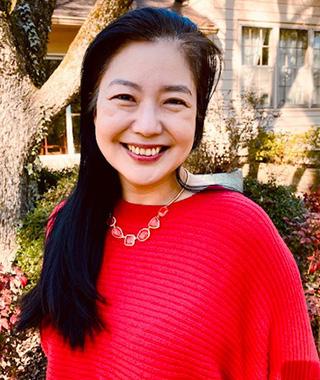
–––––––––––––––––––––––––––––––––––––––––––––––––––––––––––––––––––––––––––––––––––––––––––––––––––––––––––––––––––––––––––––––––––––––––––––––––––––––––––––––––––––––––––––––––––––––––––––––––––––––––––––––––––––––––––––––––––––––––––––––––––––––––––––––––––––––––––– FACULTY SUPPORT
13 SUMMER 2023 EYE ON PSI CHI COPYRIGHT © 2023 PSI CHI
Questions (and Answers) About Communicating Your Research Experiences When Applying to Graduate School
Jocelyn Turner-Musa, PhD Morgan State University (MD) Mitch Prinstein, PhD, ABPP University of North Carolina–Chapel Hill
Which of these two lines about a student’s research experience do you think would be more likely to impress a graduate school admissions panel or future potential employer?



• I collected data for a faculty-led research project.


• Following training, I interviewed participants in-person about their social justice beliefs and reported their responses in a timely manner to an experienced faculty member for feedback and potential publication in a future article, demonstrating both high dependability and organizational skills
Julie Radico, PsyD, ABPP Penn State Milton S. Hershey Medical Center
As these two examples make abundantly clear, the way you go about communicating your research and other professional experiences can make a huge difference in how they might be perceived! Carefully worded examples of research experiences can be extremely useful when applying to graduate school and beyond, particularly for programs with a heavy emphasis on research. Therefore, for this issue of our Three Heads ARE Better Than One series, our graduate school experts answer questions about effective ways to convey this information. As you read their sage advice, consider how you might apply it toward your future graduate school and career endeavors.
Photo Credit: Shutterstock.com/ JOSSNAT THREE HEADS ARE BETTER THAN ONE ––––––––––––––––––––––––––––––––––––––––––––––––––––––––––––––––––––––––––––––––––––––––––––––––––––––––––––––––––––––––––––––––––––––––––––––––––––––––––––––––––––––––––––––––––––––––––––––––––––––––––––––––––––––––––––––––––––
14 EYE ON PSI CHI SUMMER 2023 COPYRIGHT © 2023 PSI CHI
Jocelyn: Tell your story and be clear about what you did. If you just say you worked in the research lab of Professor Turner-Musa, this doesn’t tell me what you did or what skills you learned. Provide the name of the study, talk about the study purpose, your role, and specific tasks. Did you complete a literature review? Collect and analyze data? What did you learn from this experience, and how does it relate to your career goals? Graduate programs are looking for students who
• will benefit most from their program
• have basic research knowledge, skills, and experiences, and
• can serve as capable research assistants.
Mitch: In the personal statement, you should describe each project by indicating what the study hypotheses were, how it addressed broad questions in the literature, and how your work assisted in making sure those questions would be addressed in a rigorous manner. It is less about what you did and more about why you did it. When you apply to graduate school, you should be discussing how you are ready to become an independent scholar, but if you discuss “what” you did too much (i.e., completed data entry, conducted interviews), it may sound like you are applying to be a research assistant instead.
Julie: It’s a fine balance of identifying how you were involved, what you gleaned from the experience, and how you plan to carry those skills forward. List all research involvement (no matter the level of contribution you made, though identify the level of involvement as well; you can list this in bullet points on your CV) and write in more detail about the purpose and future applications of the work.
How important is it for some of my research to have been published before applying to graduate school?
Jocelyn: To be a more competitive graduate school applicant, I would say it’s important to publish your research before applying to graduate school. There are several journals that accept undergraduate research, including Psi Chi Journal of Psychological Research Speak with your faculty advisor or search the internet for other undergraduate research journals. If you are working with a faculty mentor on their research, ask about serving as an author on one of their publications. However, you will need to play a substantive role on the project (e.g., conducting the literature review, collecting data, data analysis, and perhaps assisting with writing the manuscript).
Mitch: It’s not important. Many people feel like many pubs are required to get in, and mistakenly focus on authorship more than the research experience itself. Most graduate mentors reviewing applications realize that an undergraduate listed as an author on a paper likely reflects the principal investigator’s generosity more than the student’s competence because it is exceedingly rare that an undergraduate has spent the same number of years and offered the same level of contributions as other paper authors. Far
more important is that students can express within their personal statements what the research goals/hypotheses were for each of the studies in which they assisted, and how their work advanced scientific questions and prior studies.
Julie: It’s important to demonstrate research involvement and hopefully some product of that (e.g., article, poster, conference presentation), but it’s often not a mandatory requirement for applying to graduate school. Your application will be reviewed as a whole, and if the research portion is lighter, that can be made up for in your volunteer and teaching work. However, if you are pursuing a research-focused PhD, then having publications may be more important.
Is research experience that didn’t result in a publication useful to include in my application too?
Jocelyn: Of course. Talk about your research experiences in your personal statement and include your research presentations as well. Graduate schools want to know about your research knowledge and experiences, even if it doesn’t result in a publication.
Mitch: Definitely. More and more, students report that they got research experience as if they have checked a box and fulfilled a requirement, thus expecting to get into a graduate program. This is unfortunate because far more important is how students can speak about that research experience and reflect their understanding of what the research was about, the methodological strengths/weaknesses, and prior studies that informed this area of science. If an applicant can speak in an informed way on these topics, it does not matter much whether their experience resulted in a publication or not.
Julie: 100%. You can also identify when manuscripts have been submitted and are under review. It will be important to be able to talk about the work you did and, maybe even, why you think the work has yet to be published (e.g., small n, one institution).
Are there any areas of communicating the research process where graduate student applicants tend to fall short?
Jocelyn: Some students do not consider research experiences gained in their courses, through volunteering, or even work experiences. Think about your undergraduate experiences and how they may relate to research. If you are an office assistant who organizes files, answers phones and takes messages, schedules
––––––––––––––––––––––––––––––––––––––––––––––––––––––––––––––––––––––––––––––––––––––––––––––––––––––––––––––––––––––––––––––––––––––––––––––––––––––––––––––––––––––––––––––––––––––––––––––––––––––––––––––––––––––––––––––––––––– THREE HEADS ARE BETTER THAN ONE
To begin, could you share any tips for communicating the skills I learned through my research experiences when I apply for grad school?
Don’t have any research experiences yet?
15 SUMMER 2023 EYE ON PSI CHI COPYRIGHT © 2023 PSI CHI
Not to worry! See our recent Three Heads ARE Better Than One article about how to acquire these opportunities.
appointments, etc., you are gaining experiences that help to improve your organizational, communication, and interpersonal skills. All of which are important for research.
Mitch: As noted above, many students obtain research experience but do not understand what or why they were engaged in the tasks they completed. This is a fatal flaw.
Julie: I’d strongly encourage you to “know your stuff” when talking about research in which you were involved. Have a deeper understanding, beyond regurgitating a hypothesis at an interviewer.
What should I do if I don’t have any research experience but wish to apply to graduate school?
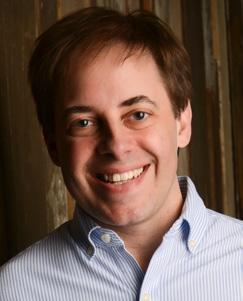
Jocelyn: Great question. Some graduate programs may not have a heavy emphasis on research. So for example if you are applying to MA or PsyD programs, research may not be a major admission criterion. Other options include participating in a post-baccalaureate internship after graduation. Many post-bacs are about 1–2 years and provide students with research experience as well as assistance with the GRE and graduate school applications.
Mitch: If you are applying for a PhD program, it may be worth waiting in this case. Getting research experience (as a volunteer, during undergraduate years, as a postbac research assistant, or as a student in a terminal master’s program) will be critical for successful admission.
Julie: I agree that it would be important to think strategically and look at the requirements being asked by the programs to which you want to apply. For example, there are many programs in which you cannot apply to the doctoral program unless you have a master’s degree.
research involvement, tutoring). On an interview, be prepared to talk about that grade and how you have worked to strengthen your knowledge in that area.
Jocelyn Turner-Musa, PhD, is a Professor and Chairperson of the Department of Psychology at Morgan State University (MSU) in Baltimore, MD. She is the Director of student training in the MSU ASCEND Center for Biomedical Research, funded by the National Institutes of Health. She is also a member of the American Psychological Association and is Past-President of Division 1, The Society for General Psychology. Her research focuses on understanding the role of psychological and social factors on disease management and health promotion. Dr. Turner-Musa has received numerous awards including an American Fellows Award from the American Association of University Women.

Mitch Prinstein, PhD, ABPP, is the Chief Science Officer of the American Psychological Association and the John Van Seters Distinguished Professor of Psychology and Neuroscience at the University of North Carolina at Chapel Hill. He has published over 150 peer-reviewed papers and nine books, including The Portable Mentor: Expert Guide to a Career in Psychology
Julie Radico, PsyD, ABPP, works as a behavioral health specialist and associate professor in Penn State Milton S. Hershey Medical Center’s Family and Community Medicine Department. She is Board Certified in Clinical Health Psychology. She earned her doctoral degree in clinical psychology and master’s degrees (clinical psychology & counseling and clinical health psychology) at the Philadelphia College of Osteopathic Medicine. Dr. Radico completed her postdoctoral fellowship in the department of Family Medicine at the University of Mississippi Medical Center. Currently, Dr. Radico serves on the American Psychological Association’s (APA) Council of Representatives and Committee on Division/APA Relations (2022–2024).
I
only
got a C in my undergraduate research methods and/or statistics courses. How do you think this will be viewed when I apply for grad school and what should I do to improve these views?
Jocelyn: My response may be a bit controversial here. Graduate programs are looking for well-rounded students. If you are doing well in other courses and have a “C” in only one of your research methods or statistics courses, then you should be okay. I believe this to be especially true if you are actively engaged in research with a faculty/research mentor, completed a research internship, and participate in research conferences. That said, grades do matter, especially in highly competitive programs that receive many applications, such as PhD programs in clinical psychology. So, do your very best.
Mitch: You are not alone. Note that many look at the overall GPA and focus less on individual course grades when reviewing applications.
Julie: Try to make sure the rest of your grades are strong and build other areas of strength in your application (e.g., volunteering,
Supporting Psi Chi Chapters in Need
Did you know? Psi Chi has a Chapters in Need fund to support any chapter that experiences an event that significantly impacts their functioning, such as a natural disaster. Through the fund, Psi Chi provides support such as membership assistance to affected students, replacement certificates, or honor cords for graduating seniors
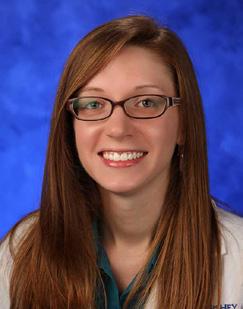
You can make a difference to Psi Chi chapters in need by donating to the fund here:
https://donate.psichi.org/give/444494#/donation/checkout

Photo Credit: Vecteezy.com/ CHANWITY435363 THREE
––––––––––––––––––––––––––––––––––––––––––––––––––––––––––––––––––––––––––––––––––––––––––––––––––––––––––––––––––––––––––––––––––––––––––––––––––––––––––––––––––––––––––––––––––––––––––––––––––––––––––––––––––––––––––––––––––––
HEADS ARE BETTER THAN ONE
16 EYE ON PSI CHI SUMMER 2023 COPYRIGHT © 2023 PSI CHI ADVERTISEMENT
Surround Yourself With Support: The Importance of Mentors, Advocates, and Sponsors
By Diane A. Safer, PhD Albert Einstein College of Medicine
One of the best things I ever did as an undergraduate was to introduce myself to the professor teaching my Intro to Psychology class. My class at the University of Wisconsin was huge. Being in the class was more like watching a play, with the professor as a distant figure on a stage. But Dr. Patricia Devine was a dynamo. She was passionate about psychology and her enthusiasm was contagious. Also, her personal research into implicit bias was fascinating. So, even though I was one of hundreds in her class, I went to her office hour and heard more about her research and her lab. That initial conversation led to an opportunity to work in her lab, and Dr. Devine became my mentor and so much more. At the time I had no idea that this would direct the course of my education, career, and life.
The guidance that I received during college was impactful. I recommend you also find such guidance on your academic journey. However, as you progress in your career, remember that support is still needed. A smart professional will surround themselves with support. There are three types of supporters who can provide you with distinct types of assistance. Most people are familiar with the term “mentor,” but I would like to introduce you to the two other types of supporters: advocates and sponsors. First, let us dive a little deeper into the concept of a mentor.
Mentors Advise You
Mentors provide wise guidance to help you plan beyond your current position. As a student, your mentor can help you choose your courses, advise you about opportunities to strengthen skills, offer

––––––––––––––––––––––––––––––––––––––––––––––––––––––––––––––––––––––––––––––––––––––––––––––––––––––––––––––––––––––––––––––––––––––––––––––––––––––––––––––––––––––––––––––––––––––––––––––––––––––––––––––––––––––––––––––––––––––––––––––––––––––––––––––––––––––––––––––––– CAREER ADVICE Photo Credit: Shutterstock.com/ JACOB LUND
17 SUMMER 2023 EYE ON PSI CHI COPYRIGHT © 2023 PSI CHI
suggestions to build your network, and assist you as you plan for your first job. If you are a new professional, a mentor can help you develop your career goals and path.
Mentors serve as role models and teachers to help you improve or develop both technical skills and transferable skills, such as relationship building or leadership, and by teaching you directly or directing you to available resources. A mentor empowers you to see your future, and helps you believe that future is attainable.
Mentor/mentee relationships are partnerships based on mutual trust and respect that benefits both parties. It should be a safe space where you can openly share issues and express ideas. Your mentor’s goal is your professional development. When collaborating with a mentor, it is important to understand that, as the mentee, you need to set the agenda and guide the topics of discussion. Consider what type of information you need, which areas you want to improve, and what questions you need answered. You can ask:
• How do you feel I managed this recent situation?
• Based on your experience, how do you advise I prepare for this upcoming challenge?
• Could you help me think through next steps for my career?
Advocates Champion You
In contrast to mentors, advocates have a more direct role in your advancement. Advocates know you, believe in you, and are willing to place their personal reputation on the line to support you. Advocates champion you by speaking highly of you to others. “Advocates are the voice to speak your name in rooms of which you have yet to enter” (White, 2020). This helps in many ways, including making sure you get credit for your work, connecting you to others to gain experience and develop new skills, and when needed, giving you a great reference.
Advocacy relationships need your continuous effort because advocates need to be kept up-to-date on your skills, experience, and goals. Communication is key. To get the most out of your advocacy relationships, know what you want to do, where you want to go, and make sure you tell your advocates. You can say:
• I would love the opportunity to gain more direct experience.
• If you know anyone with expertise in this area, would you please introduce me?
• I’d like to get involved in this type of research. Please feel free to share my name.
Sponsors Act for You
Sponsors offer you opportunities that lead to your professional progression. They become stakeholders in your success. “A sponsor… uses their political capital on your behalf” (Sonnenberg, 2018).
A sponsor, like an advocate, is willing to place their personal reputation on the line, but a sponsor grants you opportunities, sometimes even providing funding for training and programs, to build skills and competencies. Your sponsor considers you their protégée. Therefore, they are willing to invest in your growth. Sponsors ensure their protégés have visibility and stretch assignments (challenging projects to grow skills and strengthen abilities) to gain necessary experience for the next promotion or leadership
opportunity. Sponsors are the “hand that hold[s] the door open to their world of access and available opportunities” (White, 2020). Sponsor relationships focus on career advancement. Sponsors notice you from your work and/or may hear about you from your advocates. As they personally invest in your career growth, you, in turn, must deliver because your success is their success (Koifman, 2017).
Sponsorship has the biggest impact on success. A study of 12,000 women and men in white collar jobs (in US and UK) found sponsorship surpassed mentorship when it came to career progression (Hewlett, 2013). With sponsor support, individuals were more likely to ask for a promotion. Similarly, people with sponsors were more likely to ask for raises than those without (Schawbel, 2013).
Gender Discrepancies in Professional Support
It is clear that mentors, advocates, and sponsors have a positive effect. However, there are significant discrepancies between the levels of support received by women and men. A survey of more than 4,000 full-time-employed people with MBAs found that women were just as likely as men to get mentoring: 83% of women and 76% of men report having at least one mentor (Carter and Silva, 2010). However, men with mentors were found to have received 15% more promotions. Researchers suggest that women tend to gravitate to mentors, frequently other women, who are understanding and supportive, but in less senior positions than those of the men. To progress professionally, women need to “look beyond the good advice, emotional support, and feeling of comfort [mentors] offer you” (Abbott, 2014). They need to connect with people in power and the more senior the person, the faster the career advancement.
Another disparity was found between sponsorship for women and men. A study found that women were 54% less likely than men to have a sponsor (McKinsey & Company, 2022). Without sponsorship women are less likely than men to be appointed to top roles, resulting in too few women reaching the tops of their organizations (Ibarra, 2019).
Researchers offer several possible reasons for women’s deficit of sponsors:
Like attracts like. This is the “Mini-Me Syndrome,” in which sponsors tap talent that reminds them of themselves. In other words, male leaders may unconsciously be inclined to mentor and champion other men (Coqual, 2019).
Unconscious bias. Leadership historically has been “associated with stereotypically ‘male’ qualities” and women may be “less likely to be perceived as ‘leadership material,’ as compared to men” (Center for Creative Leadership, 2022).
It goes beyond hard work. A survey of women found that 77% of women believe diligence, dedication, and education were what leads to advancement, therefore not recognizing or underestimating the value of relationships and connections (Rezvani, 2011).
Proactively Finding Support
Finding mentors, advocates, and sponsors does not happen by chance. The key to finding supporters is to be proactive and know what you want. Self-assess your strengths and identify your needs
CAREER ADVICE ––––––––––––––––––––––––––––––––––––––––––––––––––––––––––––––––––––––––––––––––––––––––––––––––––––––––––––––––––––––––––––––––––––––––––––––––––––––––––––––––––––––––––––––––––––––––––––––––––––––––––––––––––––––––––––––––––––––––––––––––––––––––––––––––––––––––––––––––18 EYE ON PSI CHI SUMMER 2023 COPYRIGHT © 2023 PSI CHI
to clarify what you seek to achieve. People respond more positively when asked to help with a specific goal or challenge rather than a vague request to be your mentor.
Grow and establish your network . Do it now so you have the support when needed. To build your network, brainstorm whose perspective you would value, who you admire, and who already knows your work. Take advantage of any institutional or professional association mentoring programs. Use LinkedIn to explore your connections and your connections’ connections.
Recognize strengths. Is there someone in your network who is a natural mentor or a vocal advocate? Is there someone in a senior leadership position who could grant opportunities? Some people in your network may seem to naturally take a mentoring role and others, who may be awkward mentors, might be natural connectors. Network strategically to identify who to reach out to based on your needs.
Build relationships. Before any asks are made, schedule career conversations (more formally known as informational interviews) to listen to and take a sincere interest in others’ stories. Follow-up with thank-you notes and periodic updates on your progress. To keep your network alive, make it a habit to regularly stay connected with key people.
Get noticed. Advocates and sponsors need to know you are a safe investment, so make them aware of your accomplishments. Strategically self-promote to show your potential to assure sup porters “to invest their time, effort, and political capital to help you move up in the organization or the profession” (Abbott, 2014). They are more likely to support someone with drive, resilience, and ability to consistently produce outstanding results.
Mentors, advocates, and sponsors can each play a role in your success. But it is up to you to seek them out and foster relationships. The support is out there for you. Now you need to go out, find the right people, and get that support!

References
Abbott, I. (2014, February 19). Turn your mentors into sponsors. The Glasshammer. https://theglasshammer.com/2014/02/turn-your-mentors-into-sponsors/ Carter, N. M., and Silva, C. (2010). Mentoring: Necessary but insufficient for advancement Catalyst. https://www.catalyst.org/wp-content/uploads/2019/01/Mentoring_Necessary_But_Insufficient_for_ Advancement_Final_120610.pdf
Center for Creative Leadership. (2022, March 30). Women need a network of champions. https://www.ccl.org/articles/leading-effectively-articles/why-women-need-a-network-of-champions/ Coqual, formerly the Center for Talent Innovation (2019). The sponsor dividend. https://coqual.org/wp-content/uploads/2020/09/CoqualTheSponsorDividend_KeyFindingsCombined090720.pdf Hewlett, S. A. (2013, August 11). Forget a mentor, find a sponsor: The new way to fast-track your career. Harvard Business Review Press.
Ibarra, H. (2019, August 19). A lack of sponsorship is keeping women from advancing into leadership Harvard Business Review. https://hbr.org/2019/08/a-lack-of-sponsorship-is-keeping-women-from-advancing-into-leadership?registration=success Koifman, N. (2017). How to turn a mentor into a sponsor. Huffington Post. https://www.huffpost.com/entry/how-to-turn-a-mentor-into-a-sponsor_b_5a0e0e77e4b0e6450602e937 McKinsey & Company (2022, October 18). Women in the workplace 2022, McKinsey & Company. https://www.mckinsey.com/featured-insights/diversity-and-inclusion/women-in-the-workplace Rezvani, S. (2011, Oct 14). Women and the trouble with mentors. Washington Post. https://www.washingtonpost.com/national/on-leadership/women-and-the-trouble-with-mentors/2011/10/14/ gIQAeOF7jL_story.html
Schawbel, D. (2013, September 10). Sylvia Ann Hewlett: Find a sponsor instead of a mentor. Forbes Magazine. https://www.forbes.com/sites/danschawbel/2013/09/10 sylvia-ann-hewlett-find-a-sponsorinstead-of-a-mentor/?sh=39cb67701760
Sonnenberg, L. (2018, June 8). How to turn a mentor into a sponsor. Forbes Magazine. https://www.forbes.com/sites/laurensonnenberg/2018/06/08 how-to-turn-a-mentor-into-a-sponsor/?sh=6966be216e2f White, M. D. (2020, July 30). The 4 relationships you need to succeed: Coaches, mentors, sponsors, and advocates. The Kool Source. https://thekoolsource.medium.com/ the-4-relationships-you-need-to-succeed-coaches-mentors-sponsors-and-advocates-39a9391ff9a0
Diane A. Safer, PhD, is the inaugural director of career and professional development for graduate students and postdocs and assistant professor in the Department of Psychiatry and Behavioral Services at the Albert Einstein College of Medicine in the Bronx, NY. A former business professional with more than 20 years of experience in PR firms serving healthcare/biotech companies, Dr. Safer ran her own information consulting company for 10 years before moving to career and professional development. Dr. Safer is actively involved in key professional career organizations, including the Graduate Career Consortium (GCC), where she has cochaired the Mentoring Committee for the past four years, the National Postdoc Association (NPA), and the National Association of College and Employers (NACE). She completed her BA in psychology at the University of Wisconsin–Madison and earned her MA and PhD in social psychology at Columbia University in New York, NY.
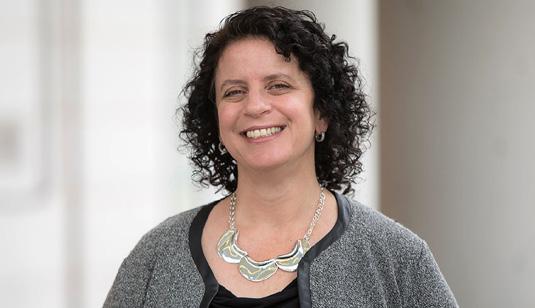
––––––––––––––––––––––––––––––––––––––––––––––––––––––––––––––––––––––––––––––––––––––––––––––––––––––––––––––––––––––––––––––––––––––––––––––––––––––––––––––––––––––––––––––––––––––––––––––––––––––––––––––––––––––––––––––––––––––––––––––––––––––––––––––––––––––––––––––––– CAREER ADVICE Photo Credit: Shutterstock.com/ JACOB LUND
19 SUMMER 2023 EYE ON PSI CHI COPYRIGHT © 2023 PSI CHI
Psi Chi Enters China
Adam John Privitera1,2 and Ge Han2
1Centre for Research and Development in Learning Nanyang Technological University
2College of Liberal Arts, Wenzhou-Kean University
November 17, 2022, now marks a significant milestone in the nearly 100-year history of Psi Chi. On this date, the induction ceremony for the first Psi Chi chapter in China was held at WenzhouKean University (WKU) in Zhejiang province. We were proud to welcome 40 young psychologists into Psi Chi, many representing our university’s brightest, most dedicated students. Being the first Psi Chi chapter in China is a tremendous honor and has even attracted the attention of the Central Committee of the Chinese Communist Party who ran an article in their official newspaper People's Daily. However, the founding of our chapter also comes with a significant number
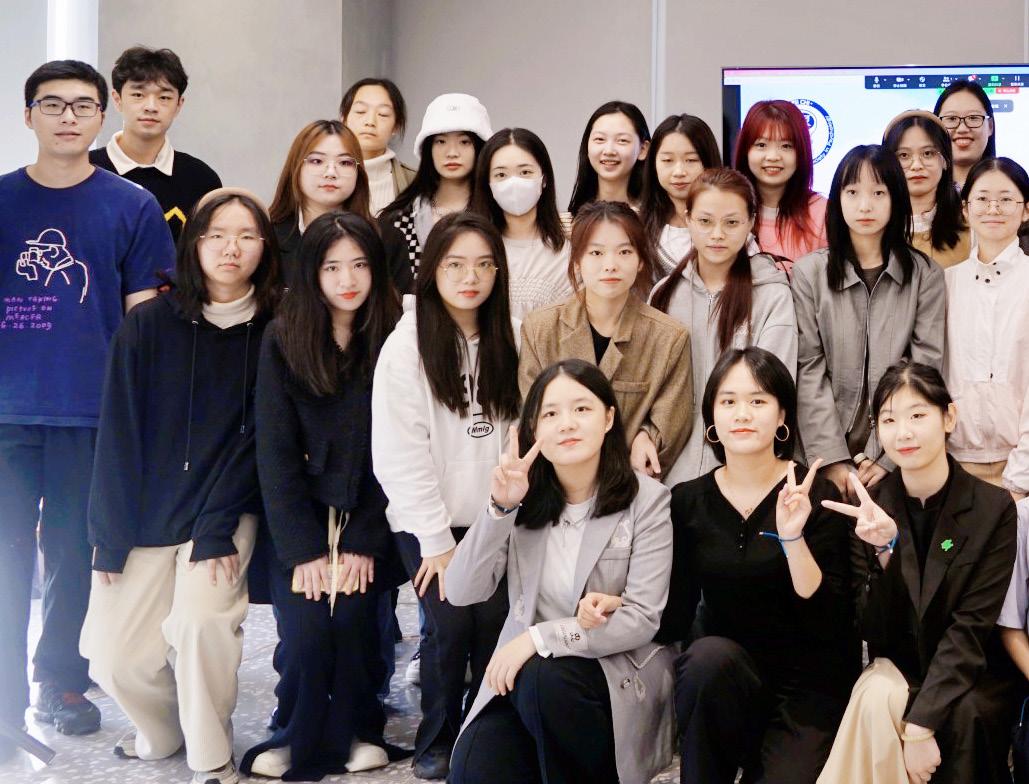 The first class of Wenzhou-Kean University Psi Chi members pictured with university faculty and staff at their induction ceremony. Due to pandemic-related restrictions on public gatherings, only a small number of students were allowed to attend the event in person with some guests joining the ceremony through the Internet.
The first class of Wenzhou-Kean University Psi Chi members pictured with university faculty and staff at their induction ceremony. Due to pandemic-related restrictions on public gatherings, only a small number of students were allowed to attend the event in person with some guests joining the ceremony through the Internet.
20 EYE ON PSI CHI SUMMER 2023 COPYRIGHT © 2023 PSI CHI
of unique challenges given the state of psychology as a discipline in China, the lack of honor societies at Chinese universities, and evolving pandemicrelated restrictions on travel and campus activities. The WKU Chapter of Psi Chi hopes that, through our experience, more universities in China will discover the benefits of joining this wonderful organization in support of developing ongoing and fruitful collaboration.
An American University in China?
Although the founding of the WKU Chapter marks Psi Chi’s entrance into China, it is worth noting that our school is very unique compared to
most universities in China. WKU is one of seven Sino-foreign cooperative universities in China. These universities, which also include a New York University campus in Shanghai and a Duke University campus in Kunshan, are quite unique compared to other Chinese universities. In our case, WKU adopts an American educational approach from Kean University in New Jersey in combination with Chinese cultural education to prepare students who are interested in pursuing further education or employment in countries like the United States. In the realm of psychology, we offer bachelor degrees in general and forensic psychology, a master’s in human behavior and organization, and provide extensive internship and research experiences to interested psychology majors. It is for these
reasons that we felt that membership in Psi Chi was a good match for WKU. We hope the other Sino-foreign cooperative universities in China consider joining in order to develop a strong community of like-minded psychological scientists.
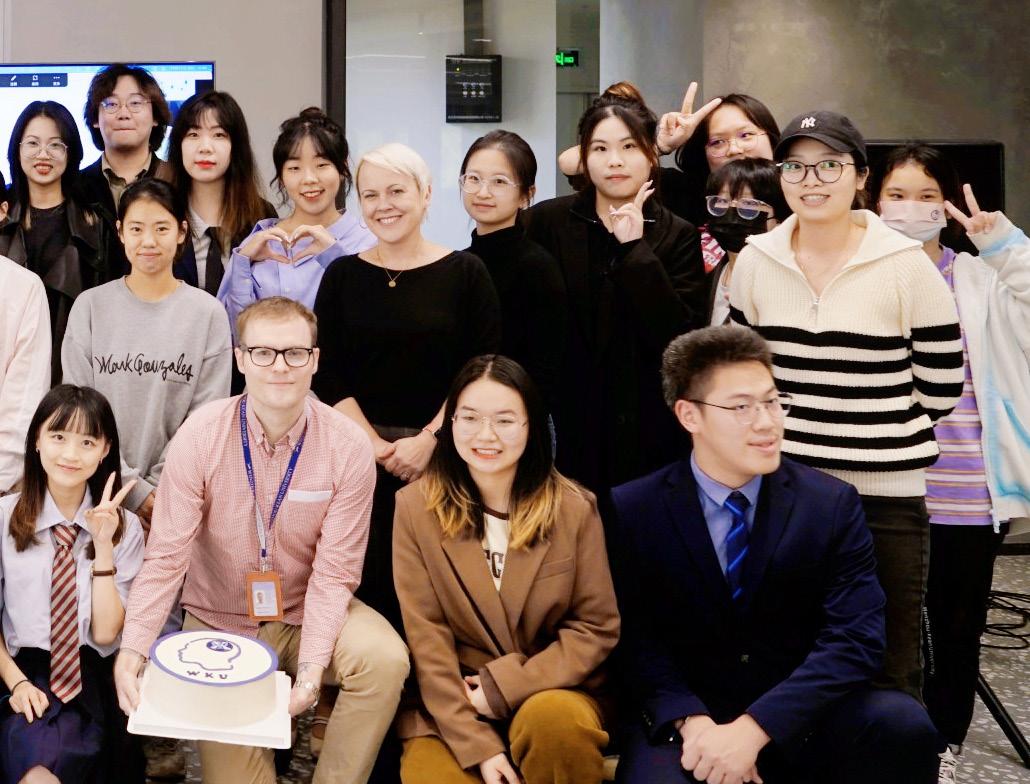
Psychology:
The United States vs. China
Psychology is one of the most popular undergraduate majors in the United States. According to the American Psychological Association (APA), over 127,000 bachelor degrees in psychology were awarded in 2020 (APA, 2021). These numbers generally keep psychology in the top five when considering the popularity of undergraduate majors. The story is quite
INTERNATIONAL
21 SUMMER 2023 EYE ON PSI CHI COPYRIGHT © 2023 PSI CHI
different in China, however, where only around 4,000 undergraduate psychology degrees were awarded in the same year (China Higher Education Student Information; CSSD, 2021). In fact, less than 3% of higher education institutions in China even offer a degree in psychology (CSSD, 2021). This is likely the result of psychology being a relatively new field in China compared to Western countries. In China, there is presently an emphasis on psychology as a field that is almost exclusively concerned with the treatment of psychological disorders. This has led to the widely held misconception that our field is only about diagnosis and treatment and is not suitable for those interested in anything that deviates from these focuses (Hu, 2008). Do people really only use 10% of their brains? Does playing Mozart’s music for babies actually raise their IQ? People around the world often have
misunderstandings about research from the field of psychology. These and other myths about psychology are found throughout China, but some of the most prevalent ones have actually led people to believe that psychology is a pseudoscientific field focused on the supernatural. It is not uncommon for college students in China to believe that psychologists work as fortune tellers or mind readers. What is even more troubling is the misconception that psychological counseling is a form of thought control instead of a legitimate method for the treatment of psychological illness (Yang, 2017). As a result, the true multidisciplinary nature of psychology must be unpacked for most students in order to give them an accurate picture. Generally, once students learn how diverse and interesting our field is, they tend to want to either minor in it or even change their major to psychology.
Honor Societies in China
There are a surprising number of similarities between universities in China and the United States. However, although honor societies such as Psi Chi are an important part of American higher education, China has no such concept (Bi, 2013). One possible explanation for their absence could relate to differences in how undergraduate education is handled in China compared to the United States. During undergraduate study, universities in China place a much greater emphasis on the acquisition of knowledge and less of an emphasis on academic achievements outside of the classroom, including research and membership in external organizations (Wang, 2014). For this reason, honor societies like Psi Chi do not exist. This creates the added challenge of having to provide background information not only

INTERNATIONAL
The inaugural group of officers for the WKU Chapter of Psi Chi. Pictured from L to R: Zhu Xinyue (Social Media Ambassador), Hou Sixun (Program Coordinator), Zhou Qingqing (Treasurer), Ge Han (Secretary and article coauthor), Zou Wei (Vice-President), Zhou Yu (President), Tall Santa (Distinguished Guest), Dr. Denise Horn (Dean, WKU College of Liberal Arts), and Dr. Adam John Privitera (Assistant Professor of Psychology and article coauthor).
22 EYE ON PSI CHI SUMMER 2023 COPYRIGHT © 2023 PSI CHI
about Psi Chi, but about honor societies in general to students and parents who are considering membership. Although this concept is quite foreign to most here, we have seen considerable interest in Psi Chi.
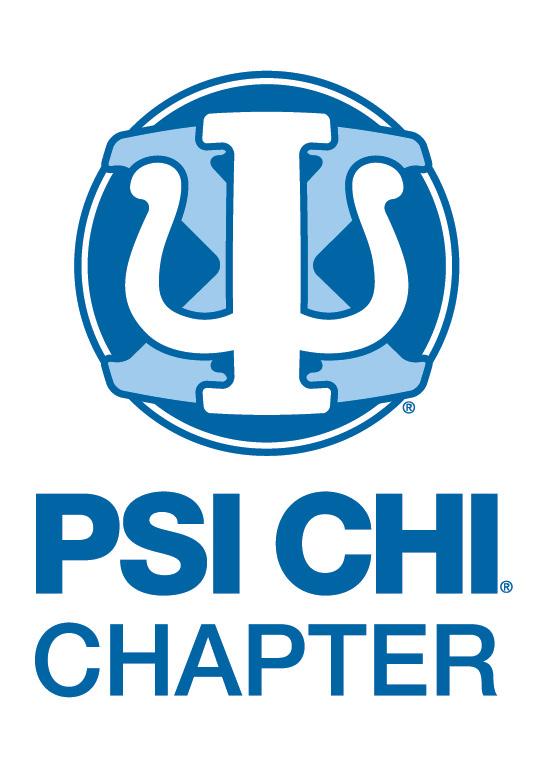
Additional Challenges
Even before holding our induction ceremony, the WKU Chapter of Psi Chi has had to negotiate some fairly significant challenges. Most difficult has been the Chinese government’s COVID Zero policy. Due to strict regulations about public gatherings on university campuses, our chapter has been unable to hold many in-person events including informational sessions, guest lectures, and social activities. Although the government has recently abandoned the COVID Zero policy, it is unclear whether there will be continued restrictions on university campuses throughout the country. In preparation, our chapter has begun to plan a series of online events for the rest of the academic year in order to support the development of an active and engaged community around Psi Chi.
As the first and only Psi Chi chapter in China, we also face the added challenge of having no other local chapters to connect with. One of the most attractive features of joining Psi Chi is becoming part of a distinguished community of psychological scholars. Although we hope that the establishment of our chapter will motivate other Sino-foreign cooperative universities to follow our example, for the time being we are all alone out here. We are also impacted by
China’s strict border closure, which has yet to be relaxed for activities including academic exchanges and conferences. Fortunately, through the Internet we are able to reach out and coordinate with other chapters across the globe. Presently we are exploring opportunities for collaborations with other Psi Chi chapters around the world. There are some hurdles for our chapter to overcome when it comes to planning collaborations including the huge time difference between China and the United States as well as Chinese government Internet restrictions that block some of the most popular collaboration and social media websites including Google, Twitter, and Facebook. Fortunately, our inaugural group of Psi Chi officers have already shown that they are up to the task, demonstrating unbelievable flexibility and ingenuity in the face of these and other challenges.
A Path Forward for Psi Chi in China

We are equal parts excited and anxious as we begin to chart our path forward as the first Psi Chi chapter in China. Despite the challenges we continue to face as a chapter we remain confident that we will be successful and that Psi Chi will continue to grow here. We look forward to the day when travel becomes more realistic for our students in hopes that they will be able to connect with other Psi Chi members at conferences in the United States. Until that time, we will continue to work in support of Psi Chi’s mission and purpose in advancing the
science of psychology for a new population of young psychologists in China.
References
American Psychological Association. (2021). Degrees in psychology [Interactive data tool]. https://www.apa.org/workforce/data-tools/ degrees-psychology
Bi, J. (2013). A study on the Association of college honor societies: Organization sociology perspective [Doctoral dissertation, Sichuan Normal University]. CNKI:CDMD:2.1014.115252
Center for Student Services and Development, Ministry of Education, P.R. China. (2021). Psychology. https://gaokao.chsi.com.cn/zyk/zybk/ detail/73384072

Hu, L. (2008). Commonalty positive psychology education. Journal of UESTC (Social Sciences Edition) 101–103.
Wang, M. (2014). Lun Xueshu Jiaoliu Huodong Yu Xuesheng Xueshu Nengli De Peiyang [On academic exchange activities and the development of students' academic ability]. Journal of Chifeng University (Natural Science Edition), 30 (11).
Yang, Y. X. (2017). Ruhe Zai Gaoxiao Kaizhan Xinli Zixun Gongzuo [How to carry out psychological counseling in universities]. Shanxi Youth, 12 (142–143).
Adam John Privitera, PhD, was an assistant professor of psychology at Wenzhou-Kean University and served as the initial faculty advisor for the Wenzhou-Kean Chapter of Psi Chi. Currently, he is a researcher at Nanyang Technological University in Singapore. Adam’s research focuses on how differences in language experience influence cognitive function with a current focus on bilingual people in Mainland China. He also studies ways in which the findings from cognitive neuroscience can be applied to the field of education. When he is not conducting research, Adam is either eating, sleeping, or looking for funny bird pictures online.
Ge Han is a senior psychology student at Wenzhou-Kean University and is serving as the Psi Chi chapter secretary. She is interested in social psychology, especially in gender issues and feminism. After graduation, Han will pursue graduate training in psychology at a university in the United States.

INTERNATIONAL Photo Credit: Shutterstock.com/ [INSERT ARTIST]
23 SUMMER 2023 EYE ON PSI CHI COPYRIGHT © 2023 PSI CHI
Photo Credit: Vecteezy.com.com/ FR_119 Photo Credit: Shutterstock.com/ [INSERT ARTIST]
Rebecca A. Weiss, PhD, and Kabrianna Tamura, MA John Jay College of Criminal Justice, CUNY The Graduate Center, CUNY R P L S L T E A G R E X N C U S E N R P N A E O N E P M E A L S J P X N P A R I C H T K S V P A V A R E P O S T E R S R L M E I C S U J Y R Z E G O I F N D H E B H U A A P A H C E T W I N L A K N Y A D T A E I O E T I B R S A P L U T S O R L A C O O C R S D A I I N K L T A O W R G I V O A S U E I T K D I A W N Z G O V O I S L P N H S N X C A N O U E T A C M H R S N M I S A T Q K T F 24 EYE ON PSI CHI SUMMER 2023 COPYRIGHT © 2023 PSI CHI
The Hidden Costs of Applying for Graduate School and Suggestions to Reduce Them
Although psychology is one of the most popular undergraduate majors, only a small percentage (approximately 14%) go on to earn a graduate degree (National Science Foundation, 2017). Acceptance into doctoral programs in clinical psychology is particularly competitive, with an estimated acceptance rate of 6% across programs of this type from 2016 through 2020 (American Psychological Association [APA] Commission on Accreditation, 2021). Recently, university administrators and faculty have actively acknowledged the importance of a diverse student body and have included socioeconomic diversity in that definition (e.g., University of North Carolina’s Diversity Statement). However, the field has been slower to counteract the financial costs associated with gaining the required experience that can bottleneck acceptance into a graduate program in psychology.
Substantial resources exist to aid students who are considering applying to be part of the competitive group of majors who eventually continue on to graduate programs (e.g., APA’s Applying to Graduate School, Psi Chi’s An Eye on Graduate School: Guidance
Through a Successful Application, and Prinstein’s Mitch’s Uncensored Advice for Applying to Graduate Programs in Clinical Psychology). These resources are exceedingly helpful in understanding the expectations for graduate school applicants and tend to describe that, in addition to a strong academic record, applicants are expected to demonstrate substantial research and clinical experience. To become competitive applicants, both authors of this article (a current faculty member and a current doctoral student) worked multiple jobs prior to enrolling in doctoral programs, each with one higher paid job aimed at paying bills and the others (low paid or unpaid) aimed at gaining needed experience. This article
will focus on the hidden costs associated with becoming a competitive applicant for graduate school and will recommend some ways to defray those costs.
Research Assistantships on a Budget
In addition to strong grades in classes such as Research Methods and Statistics, successful applicants often work in multiple research labs and obtain a letter of recommendation from at least one research advisor. These research positions are typically unpaid and might require between four and six hours per week. If students take on additional responsibility (a great outcome for a potential applicant!), the hourly requirements can increase. For students who are juggling those research hours against paid employment or family care, this often crucial requirement can be burdensome. One way to decrease this burden is to seek out research-focused courses, which many academic programs will allow to count as a requirement for a psychology major. Although this means that the student must pay for the credit, the time spent in a research lab then replaces the time and money that would otherwise be spent fulfilling the requirements for a different course. Further, students can look into other independent research opportunities within programs that result in hands-on exposure to research methods while also counting for credit, such as undergraduate honor’s theses, master’s theses, and capstone options.
Once students acquire experience, they might be more desirable for the less common, paid positions. For example, some competitive paid summer programs provide research experience; a list of them is available through APA’s Undergraduate Research Opportunities & Internships. Additionally, some faculty members are able to pay research assistants through their grants. Last, students can earn their own funding by taking advantage of research grants and awards available through Psi Chi and APA
Research Dissemination on a Budget
For particularly competitive programs, applicants are often expected to demonstrate their understanding of the research process and research dissemination through authorship on presentations and publications. In psychology, the order of authorship represents the individual’s contribution to the project. Although a first-name presentation or publication is impressive and impactful, that role comes with responsibilities. A first author often travels to a conference to present the research or takes the heaviest load when writing a paper.
Photo Credit: Vecteezy..com/ HRISCU.RAMONA401079 Photo Credit: Shutterstock.com/ [INSERT ARTIST]
CAREER ADVICE 25 SUMMER 2023 EYE ON PSI CHI COPYRIGHT © 2023 PSI CHI
Research Conventions
Professional research conventions
(e.g., the annual APA Convention) can be important ways to learn about the field, research dissemination, and to begin professional networks. Attending a convention can provide valuable professional context for a potential applicant, but presenting at a convention is more meaningful on an application. Potential presenters will typically submit a written description of their research project by a provided deadline. The proposals will be reviewed, and the authors of the strongest proposals will be invited to present their research in one of a variety of formats, often a physical poster or a short talk. Although there are no costs to submiting a proposal, if a proposal is accepted, the lead author is often expected to pay a convention registration fee, and pay for travel and accommodations at the convention site. When attending a convention, a presenter will typically need to own or purchase professional clothing and shoes. Additionally, if the proposal was accepted as a poster, the presenter will need to print the poster (often on 36’ x 48’ posterboard).
So how can students help to reduce the costs associated with convention attendance and presenting their research? Since the pandemic, many conventions have retained a virtual presentation option. This cuts costs substantially, because presenters do not need to travel, although it does limit the networking opportunities that would otherwise be available. Your research advisor might not be familiar with a virtual or nearby convention (i.e., some professors present at more distant national conventions rather than closer regional ones). However, if you can find a more suitable,
reputable convention, your advisor will likely be supportive of submitting for that convention.
Some schools offer their own travel awards for current students. There are also numerous travel grants available for student presenters at conventions, although interested students need to be mindful of deadlines. Additionally, some conventions provide discounts on the attendance fee for students who are also first-author presenters. Further, students might elect to find more affordable lodging outside of the convention hotel, such as an Airbnb. It is common for students to share lodging and split the costs, as well. One of the article authors went to her first convention in Honolulu, Hawaii, and rented an Airbnb facing the ocean with a colleague within walking distance of the convention. They paid a fraction of the cost of the convention hotel even after the convention discount code was applied. It is also important to ask about available support from the student’s college. Some schools may cover the cost of printing a poster, particularly if their institution has its own printshop.
Publications—Already on a Budget
Authorship on an article in a peerreviewed journal is particularly impressive for graduate school applicants. Most reputable journals will not require money, although the unpaid time spent writing and editing a manuscript can be substantial. Many students have free access to writing support at their school’s writing center, which can be a particularly helpful resource for those who learned English as a second language. Applicants should work closely with their advisors to ensure that they avoid predatory publications—which are unreputable publications that often request that potential authors pay exorbitant fees (Richtig et al., 2018). This is distinct from an optional open access fee, which is an unrequired option for many high-quality journals that would allow others to freely access the article after publication. Psi Chi students have the option of submitting their work in its peer-reviewed Psi Chi Journal of Psychological Research.
Clinical Work on a Budget
Similar to research experience, students who attempt to gain clinical experience are often expected to work in unpaid or underpaid positions.
Also similar to the suggestions above regarding research, many schools will have fieldwork options available as part of a course requirement. Although still unpaid, this can be a great experience that allows students with no previous experience to become more competitive for later paid positions.
Some potential applicants might gain paid clinical experience by working on a hotline or warmline. A hotline is for those in immediate crisis, whereas a warmline can provide early intervention or emotional support. The qualifications for a warmline are often a little less than other entry-level clinical positions and might allow potential applicants to begin gaining relevant experience. Similarly, students might find job openings with an undergraduate degree in community mental health agencies in roles such as case management or consumer advocacy, which can offer paid, though likely underpaid, introduction to clinical work.
Grading and Tests on a Budget
The Graduate Record Exam (GRE) General Test was widely required for graduate admission, with over 90% of psychology doctoral programs requiring the GRE and many more requiring or recommending the related subject test (Languin, 2019). The test itself is expensive, and many applicants benefited from expensive test preparation programs. In addition, once the test has been completed, students are charged a fee each time they request their scores be sent to their prospective programs. However, as research has increasingly supported the conclusion that the GRE acts as a barrier for capable minoritized students (Gómez et al., 2021), many schools have dropped the test.
Due to the number of schools that have dropped the GRE requirement, it is important to first check whether the test is required for a desired program. If testing is required, there are national
GRADUATE SCHOOL
Photo Credit: Vecteezy..com/ HRISCU.RAMONA401079
CAREER ADVICE 26 COPYRIGHT © 2023 PSI CHI EYE ON PSI CHI SUMMER 2023
programs (e.g., McNair) that can help cover those costs, and self-paced study using published textbook guides (e.g., Kaplan) come with video tutorials and practice tests, which are a more affordable option compared to in-person or online asynchronous preparatory classes.
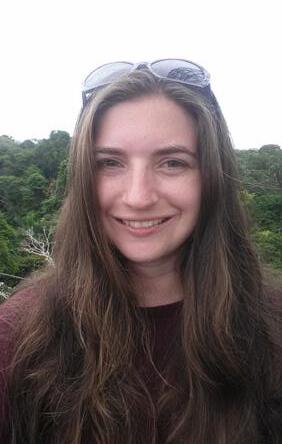
Application Costs
It is no secret that there are application fees when applying to programs, however, there are other costs of applying to consider that are less transparent. The costs of applications vary depending on program or setting and could range from $0–$125 per application with a mean of $58 (e.g., American Psychological Association Education Directorate, 2019). Given the competitive admissions rates, it is common that one student will submit applications to multiple programs. Some programs offer financial hardship application fee waivers, and other programs might waive the fee even if the option is not advertised if they are contacted in advance of the application deadline. Along with the application, there are fees for other requirements, such as requesting official transcripts and GRE scores, so students should also be mindful of these when budgeting for the application cycle.
Moving Forward
Although it is possible to minimize the financial costs associated with gaining
experience and still become a competitive applicant for graduate programs, it is important to acknowledge the systemic flaw contributing to the bottlenecking of graduate student acceptances based on the advantage of financial privilege. Students can help prepare themselves for applications by doing rigorous work to gain experience, of course, but also by doing research ahead of time illuminating the potential hidden costs of graduate school. Identifying these hidden costs supports students in more informed planning, defraying costs where possible, and setting a realistic budget based on their own means and circumstances. Although the application process remains stressful, financial distress should not be part of the equation for a successful graduate school application cycle in the field of psychology.
References
American Psychological Association Commission on Accreditation. (2021). 5-Year summary report, 2016–2020 . Washington, DC: Author. American Psychological Association Education Directorate. (2019). Graduate study in psychology summary report: Admissions, applications, and acceptances Washington, DC: Author. Gómez, J. M., Caño, A., & Baltes, B. B. (2021). Who are we missing? Examining the Graduate Record Examination quantitative score as a barrier to admission into psychology doctoral programs for capable ethnic minorities. Training and Education in Professional Psychology, 15 (3), 211–218. https://doi.org/10.1037/tep0000336
Languin, K. (2019, May 29). A wave of graduate programs drops the GRE application requirement. Science. https://www.science.org/content/ article/wave-graduate-programs-drop-gre-application-requirement National Science Foundation (2017). National Survey of College Graduates. Retrieved from https://www.nsf.gov/statistics/srvygrads/#tabs-2
Princstein, M. (2021). Mitch’s uncensored advice for applying to graduate school in clinical psychology https://clinicalpsychgradschool.org/wp-content/ uploads/2021/01/MitchGradSchoolAdvice.pdf
Richtig, Berger, M., Lange‐Asschenfeldt, B., Aberer, W., & Richtig, E. (2018). Problems and challenges of predatory journals. Journal of the European Academy of Dermatology and Venereology, 32 (9), 1441–1449. https://doi.org/10.1111/jdv.15039
Rebecca A. Weiss, PhD, is an associate professor in the Department of Psychology at John Jay College of Criminal Justice, City University of New York. She serves as the faculty advisor for John Jay’s Psi Chi chapter, and helps her students transition to a variety of related careers. In addition, she is a licensed clinical psychologist who primarily focuses on court evaluations.
Kabrianna Tamura, MA, is a clinical psychology doctoral student in the Department of Psychology at The Graduate Center, City University of New York housed at John Jay College of Criminal Justice. She serves as the research coordinator for John Jay’s Brain Health Lab and her research interests involve the intersection of forensic assessment, cultural competency, and the law.

GRADUATE SCHOOL
L O A I L A U V U G P U I Y X W E C T A V X P I R E S E A R C H L A B Q W N C I P N V M R P K O J E E I X U E L Z B U D G E T Y D S G R A N T S B S A V V C T C T S C Y E W S C S S U I D Z P N F S Y T S X P A E X Q P Y H W Z A I R B N B Y T C L O T H I N G Z U E U W S E A V E V P W U O S Q I H O T L I N E I T J P Z C X
CAREER ADVICE 27 SUMMER 2023 EYE ON PSI CHI COPYRIGHT © 2023 PSI CHI
Advocacy Considerations for Addressing Children and Adolescent Mental Health Concerns
Ashley Diaz, PhD Alliant International University
Children and adolescents with marginalized identities have historically faced several barriers within the U.S. educational system, including prejudice, discrimination, lack of access to appropriate resources, and harmful school climates that may result in greater psychological stress (Hanselman et al., 2014; Kennedy, 2019). Students who belong to a marginalized racial or ethnic group, such as Black or African American, Latinx, Indigenous, or Asian American and
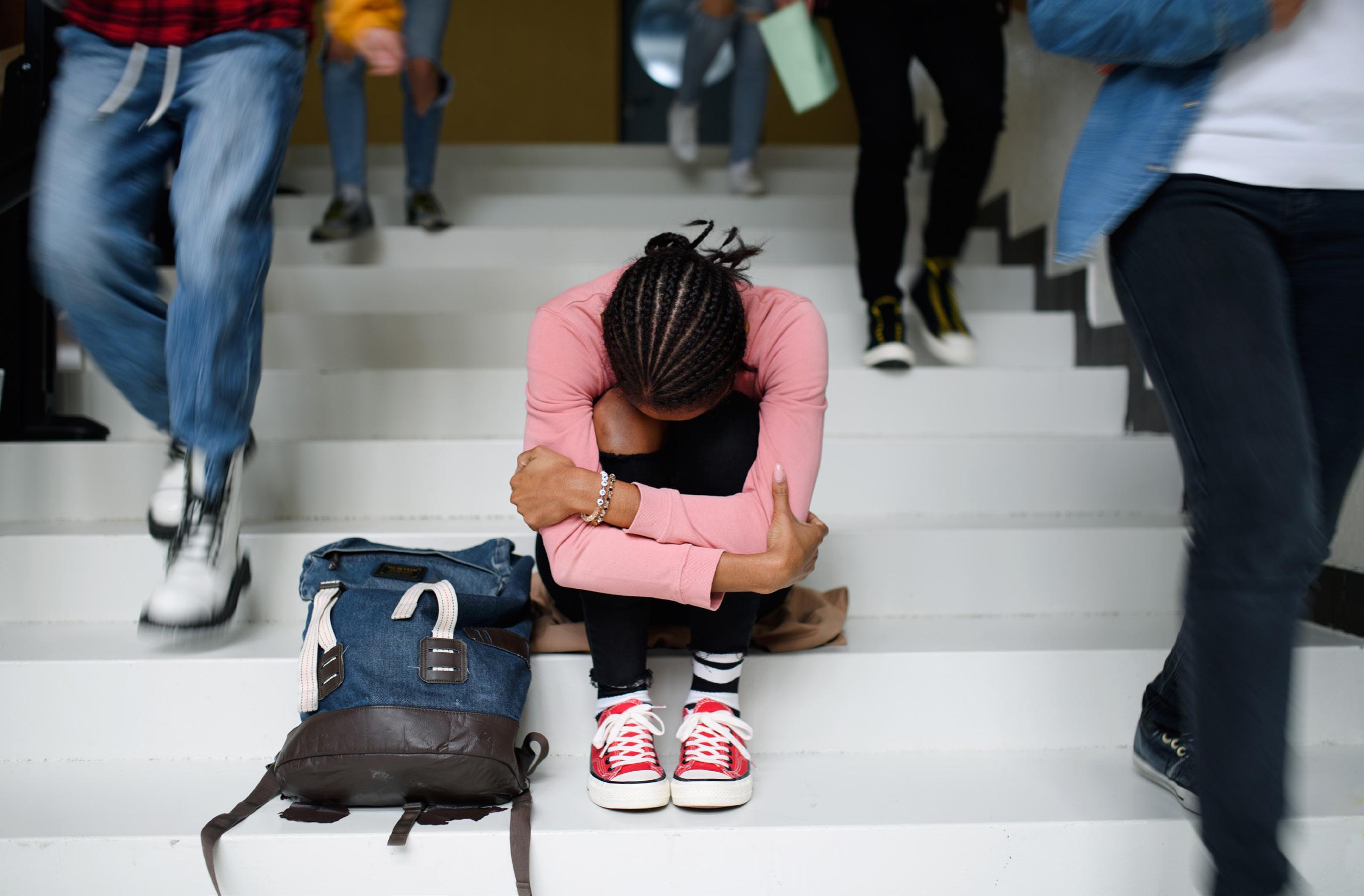
Pacific Islander groups, may experience detrimental psychological effects within a school environment including individual acts of prejudice or discrimination (Hanselman et al., 2014). For instance, stereotypes aligned with deficit thinking include lower expectations for Black, Indigenous, and people of color (BIPOC) students resulting students being blamed for low achievement scores (Murray-Johnson & Guerra, 2018). Additional systemic factors may impact the well-being and educational outcomes of children and adolescents in
schools, such as harmful school leadership, lack of inclusive educational policies, and the absence of equity-centered approaches that address the needs of diverse students (Kennedy, 2019). Social emotional learning support may address educational equities in schools, particular race-based inequities (Allbright et al., 2019). Nevertheless, additional training is needed for mental health professionals and school counselors on trauma related to marginalization and systemic oppression for youth (Dutil, 2019). In addition, parents of children or
Photo Credit: Shutterstock.com/ HALF POINT 28 EYE ON PSI CHI SUMMER 2023 COPYRIGHT © 2023 PSI CHI
adolescents who are socioeconomically disadvantaged may not have access to various types of resources when compared to middle and upper-class families, and this may also be a detriment to a child’s social and emotional development as well as their educational success (Bodovski, 2020). Therefore, education on advocacy strategies and social justice tenets is also imperative for mental health professionals who serve students with marginalized identities.
COVID-19 and Systemic Inequities: The Link to Youth Mental Health

The COVID-19 pandemic has exacerbated inequities for children and adolescents with marginalized identities, especially students with intersecting marginalized identities who may experience multiple forms of discrimination (Fortuna et al., 2020; Imran et al., 2020). Social distancing and quarantine guidelines as well as school closures because of the pandemic, have caused disruptions in children’s learning, physical activity, and social interactions with peers and teachers (Tang et al., 2021). These disruptions have put children and adolescents at greater risk for developing mental health diagnoses, such as depression, posttraumatic stress disorder, anxiety, and other mental health concerns, and the cumulative psychological effects of the pandemic may not be seen immediately, but instead unfold as time passes (Tang et al., 2021; Wade et al., 2020). In addition, children and adolescents who were already experiencing pre-existing systemic inequities, such as racism and implicit bias, may be more vulnerable to experiencing greater amounts of stress, isolation, and low self-esteem during the pandemic (Wade et al., 2020). Moreover, school settings may be the only place where children and adolescents are able to receive mental health services. Therefore, school closures or distancing guidelines might have also severely disrupted the mental health care that children and adolescents received throughout the pandemic (Golberstein et al., 2020).
School Counselor’s Role
School counselors play a pivotal role in schools as their American School Counselor Association (ASCA) standards and competencies delineate their ethical responsibility to address the needs of K–12
students (ASCA, 2019). School counselor duties include providing individual services to students by utilizing evidencebased interventions that “promote and enhance student academic, career, and social/emotional outcomes” as well as creating developmentally appropriate school programs (ASCA, 2019, p. 2). In addition to these standards, school counselors are also in a unique position to foster changes at individual, group, and systemic levels that may positively impact the lives of their clients. These changes may involve challenging inequities within school systems and dismantling barriers for students with marginalized identities to enhance wellness and
learning outcomes. Furthermore, school counselors may work to provide safe spaces for students to describe their stories and more specifically, share experiences related to their social identities. “Social justice advocacy calls on school counseling professionals to question the status quo, to speak out, and to advocate when an injustice is observed” (Kiselica & Robinson, 2001; Ratts et al., 2007, p. 93). Therefore, school counselors are encouraged to enhance their social justice and advocacy competencies and be aware of power structures that may negatively impact students with marginalized identities.
Photo Credit: Shutterstock.com/ EGOITZ BENGOETXEA MENTAL HEALTH 29 SUMMER 2023 EYE ON PSI CHI COPYRIGHT © 2023 PSI CHI
Advocacy Considerations
The following are advocacy considerations for mental health professionals who work with children and adolescents, such as school counselors. Mental health professionals who serve marginalized students have an ethical responsibility to learn about equity and embrace their role as social change agents to address the needs of diverse students.


1. Creating safe spaces.
Counselors can validate children and adolescents’ feelings and give them space in counseling sessions to discuss their unique experiences during the pandemic. Activities within the session may focus on the importance of amplifying children’s stories and having discussions around equity and racial injustice with children. For example, school counselors may use board or card games that may have a cultural significance or have a special meaning to the client. Other creative activities may center around listening to music, drawing or painting, or even dancing. The purpose of these activities is to help children and adolescents feel empowered to talk about their diverse cultural experiences and their social identities. The counselor can then move on to a conversation regarding how the pandemic may have uniquely impacted clients and their families. It is important for the school counselor to follow the client’s lead in these conversations and practice active listening so that clients feel empowered to tell their story.
2. Play therapy modalities
Play therapy may be a developmentally appropriate therapeutic tool to help children and adolescents process their thoughts and feelings regarding COVID-19 (Diaz & Haefelin, 2021). In addition, counselors may find ways to begin to address the additional stressors that may be negatively affecting them and develop comprehensive support plans. The Association for Play Therapy released a collection of COVID-19 interventions that play therapists and parents may use to help children identify and manage feelings and reactions related to COVID-19 stressors. This may serve as a beneficial tool for school and mental health counselors who wish to use play therapy interventions with their child and adolescent clients to discuss their experiences with the pandemic (Diaz & Haefelin, 2021).
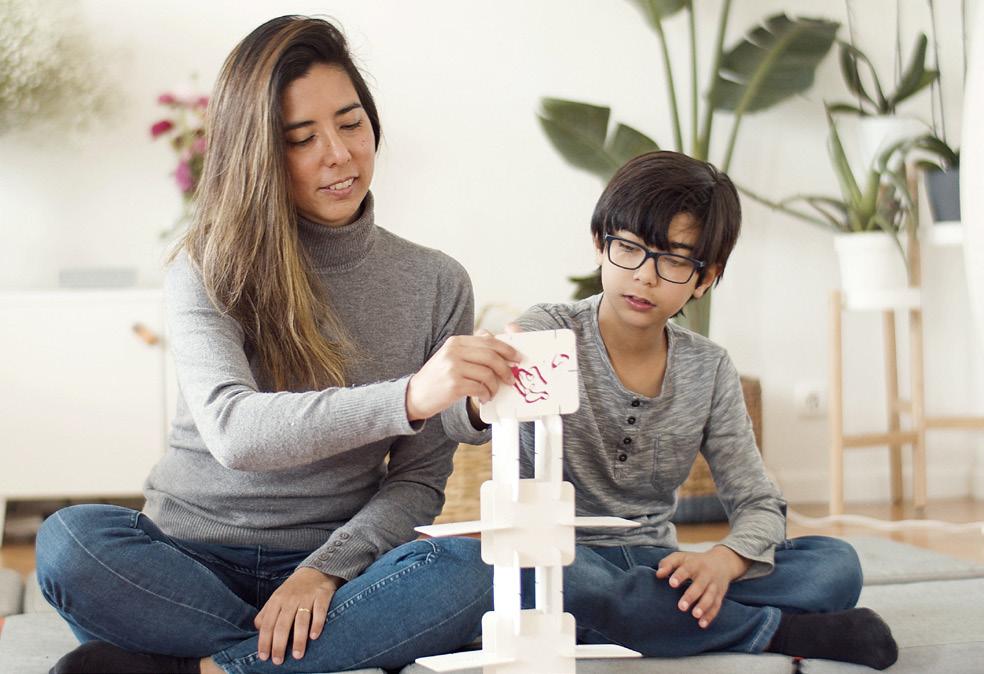
3. School counselor education.
It is imperative that school counselors assess their own multicultural and social justice advocacy competencies when working with students. School counselors should seek educational and training opportunities to become better informed of the sociopolitical climate in multiple contexts. By engaging in continuous social justice education, school counselors can be more aware of the systemic barriers that child and adolescent clients may be facing, especially as a result of the pandemic. Furthermore, school counselors must work to be self-aware of their own biases and prejudices and work toward cultivating their own critical consciousness (Adams & Bell, 2007).
Photo Credit: Pexels.com/ KAMPUS PRODUCTION
Photo Credit: Pexels.com/ YAN KRUKAU / MONSTERA MENTAL HEALTH 30 EYE ON PSI CHI SUMMER 2023 COPYRIGHT © 2023 PSI CHI
an evidence-based intervention for Black and Latinx youths in schools. Children & Schools, 41 (3), 179–187. https://doi.org/10.1093/cs/cdz009
Fortuna, L. R., Tolou-Shams, M., Robles-Ramamurthy, B., & Porche, M. V. (2020). Inequity and the disproportionate impact of COVID-19 on communities of color in the United States: The need for a traumainformed social justice response. Psychological Trauma: Theory, Research, Practice, and Policy, 12 (5), 443–445. https://doi.org/10.1037/tra0000889
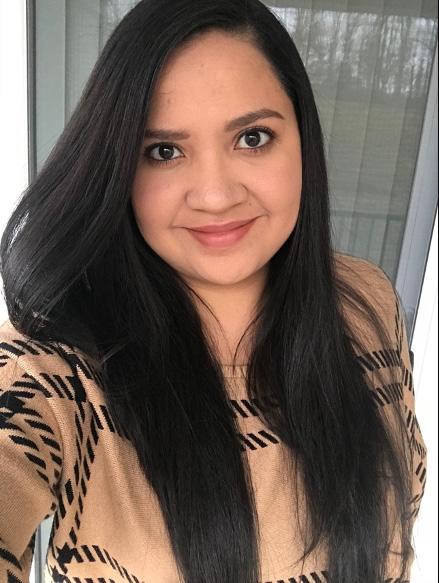
Golberstein, E., Wen, H., & Miller, B. F. (2020). Coronavirus disease 2019 (COVID-19) and mental health for children and adolescents. JAMA Pediatrics, 174 (9), 819–820. https://doi.org/10.1001/jamapediatrics.2020.1456
Hanselman, P., Bruch, S. K., Gamoran, A., & Borman, G. D. (2014). Threat
School counselor advocacy behaviors:
School counselors can engage in a variety of advocacy behaviors at the individual, group, or systemic level. At the individual level, school counselors can invite dialogue around client’s experiences with microaggressions or other forms of discrimination and validate these experiences. At a group level, school counselors may develop affinity groups for students who share a particular social identity to increase peer support and help students feel a sense of belonging or connection (Chun, 2016). School counselors may also create social justice trainings for teachers, parents, administrators, and other education stakeholders. In addition, counselors may also work on a systemic level to advocate for greater access to mental health resources for their child and adolescent clients. This may consist of partnering with community mental health agencies or state/regional programs to increase the availability of mental health services and resources in schools (Golberstein et al., 2020). Furthermore, school counselors may also advocate for school policy changes intended to foster equitable outcomes for children and adolescents with marginalized identities.
These advocacy considerations are intended to be a possible starting point for mental health professionals working with children and adolescents. More importantly, it is paramount for mental health professionals to understand the link between systemic inequities and mental health concerns so that they can find culturally responsive ways to support their clients and address diverse needs.
Ratts, M. J., DeKruyf, L., & Chen-Hayes, S. F. (2007). The ACA advocacy competencies: A social justice advocacy framework for professional school counselors. Professional School Counseling, 11 (2), 90–97. https://doi.org/10.1177/2156759X0701100203
Tang, S., Xiang, M., Cheung, T., & Xiang, Y. T. (2021). Mental health and its correlates among children and adolescents during COVID-19 school closure: The importance of parent-child discussion. Journal of Affective Disorders, 279 , 353–360.
https://doi.org/10.1016/j.jad.2020.10.016

Wade, M., Prime, H., & Browne, D. T. (2020). Why we need longitudinal mental health research with children and youth during (and after) the COVID-19 pandemic. Psychiatry Research, 290 113143. https://doi.org/10.1016/j.psychres.2020.113143
Dr. Ashley Maureen Diaz is an assistant professor in the Online MA in Clinical Counseling program at Alliant International University. She graduated with a PhD in counselor education from the Pennsylvania State University with a specialty in counseling children, adolescents, and families. She is dedicated to social justice advocacy through teaching, clinical work, and service. In addition, Dr. Diaz enjoys regularly presenting her research at regional, state, and national conferences. She has a BS in psychology from the University of Texas at Austin and a MS in mental health counseling from the University of Texas at El Paso. Her clinical experience includes bilingual mental health counseling services in multiple settings: outpatient, inpatient, partial hospitalization, and college counseling centers. Dr. Diaz has also worked as an Equity Liaison and clinical counselor in a K–12 school district and facilitated efforts and initiatives to create a more equitable learning environment. Her research interests include culturally and linguistically responsive counselor training and supervision, counseling Latinx adolescents and families, and social justice/ equity concerns in K–12 and postsecondary education settings. Her self-care includes traveling across the world, hiking in National Parks, spending time with family and friends, and salsa dancing.
Photo Credit: Pexels.com/ WERNER PFENNING
MENTAL HEALTH 31 SUMMER 2023 EYE ON PSI CHI COPYRIGHT © 2023 PSI CHI
Social Justice and Mental Health: Linking

Societal and Relational Issues Matters
Manijeh Daneshpour, PhD, LMFT Alliant International University
Photo Credit: Shutterstock.com/ DRAGANA GORDIC
32 EYE ON PSI CHI SUMMER 2023 COPYRIGHT © 2023 PSI CHI
Justice refers to the concept of fairness. Social justice manifests fairness in society, including fairness in access to healthcare, employment, housing, quality education, and many more. In the 17th century, after the Industrial Revolution, social justice was applied to economics. Now, however, social justice applies to race and gender, issues related to human rights, access to resources, participation of the marginalized in society, and equity for all, regardless of their cultural and racial backgrounds. Social justice cannot be achieved without equity. Equity differs from equality in that equity considers the impact of discrimination and strives for equal outcomes. Racial, class,
gender equality, and Lesbian, Gay, Bisexual, Transgender, Queer (LGBTQ) rights are now among the most critical issues concerning societal power dynamics.
Further, social justice and psychotherapy represent the intersection between social inequities, relational power imbalances, and systemic societal discrimination. Thus, as mental health professionals, our central aim focuses on using psychotherapy as a healing mechanism to help us with our racial and cultural experiences. The goal is to guide mental health practitioners to learn how to privilege client voices, promote justice in our gendered relationships, and highlight how we can anti-pathologize symptoms and deal with the impact of sociopolitical issues in our therapeutic practice.
Social justice and mental health seem to be far from each other. Social justice is defined as justice in distributing wealth, opportunities, and privileges in a society. On the other hand, mental health supposedly resides inside an individual. However, those suffering many social disadvantages also suffer from more significant mental health issues. For example, Sheppard (2002) examines the meaningful relationships between gender and depression and race and schizophrenia, indicating severe psychological consequences for people experiencing social injustices.
Racial, cultural, and gender norms impact our societal expectations and perceptions of how we should think and act as human beings. There is the unjust treatment of those who do not see themselves represented well in this continuum and do not define themselves based on how mental health has been defined. Racial, cultural, and gender equality and justice become a reality when there is an absence of discrimination based on a person’s sex in opportunities, the distribution of resources, and access to services for all people regardless of race, religion, culture, and sexual orientation. It is important to note that there is no denying that cultural, social, and relational differences are based on many different contextual and ecological issues. There are psychosocial differences such as personality, coping, symptom manifestation, and epidemiological differences related to the population-based risk factors. More global differences are based on cultural,
social, financial, and political practices that eventually generate health disparity for women and men (Kawachi et al., 1999). Nevertheless, physical and mental health inequity seldom is based on psychological issues alone. Societal factors, including racial categorization, religious affiliations, and gender, influence and intensify psychological vulnerabilities. For example, psychosocial risks accrue throughout life and significantly enhance the chances of inadequate mental health and early death (World Health Organization, 2001). Mental health issues significantly contribute to the global problem of disease and disability. Mental and behavioral disorders contribute to disability for men and women. Still, over 40% of countries do not have specific mental health policies, about 90% do not have specific mental health policies for adolescents and children, and about 30% have no mental health programs (World Health Organization, 2001). Over the years, general medical practitioners have seen more women receive services for mental disorders in primary care settings than men, but this does not mean that they receive adequate mental health services. Thus, clinicians need help from the medical professional, especially from epidemiologists and epidemiologically based research, to understand which group and under what circumstances there are higher risks of experiencing psychological distress and mental illness (World Health Organization, 2001).
Social Justice and Mental Health
As mental health professionals, we need to examine power and social justice, focusing on honoring cultural differences in providing psychotherapy. Overall, based on the strong interconnection between sociocultural issues and health, even though the distinction between psychological and social factors is essential, there is also a strong connection between racial inequality and health outcomes. A racial and culturally sensitive approach to mental health should combine proper responses from the mental healthcare system and public policy.
Regardless of socioeconomic status, racial and cultural experiences impact groups differently. Furthermore, mental health issues are not a separate phenomenon acting in isolation. It directly

MENTAL HEALTH
33 SUMMER 2023 EYE ON PSI CHI COPYRIGHT © 2023 PSI CHI
interacts with other social indicators like class and race, revealing that working-class and marginalized Black, Indigenous, and people of color (BIPOC) individuals suffer from a higher incidence of unrecognized mental health problems. A systemic gender, class, and race analysis expands our awareness and perceptions of the epidemiology of mental health problems, helps us with better policymaking and proper treatment for marginalized groups, and enhances public health participation (Vlassoff & Moreno, 2002). Overlooking gender and other intersectional differences and not recognizing gender and race bias can have severe outcomes. Women are more likely to be diagnosed with depression than men, even with comparable scores on standardized measures of depression and even when they present identical symptoms. Gender impacts how we perceive and stigmatize emotional problems in women and chemical dependency, especially alcoholism in men. There is a higher prevalence
of diagnosis of schizophrenia for Black men and conduct disorder for Black adolescent boys, which reveals a substantial stumbling block for the proper identification and treatment of psychological disorders (World Health Organization, 2006). Women of color's mental health impact their work productivity and the mental health of their children and older adult parents. Additionally, adolescent girls from different cultural backgrounds may deal with mental health disorders, such as mood, anxiety, and eating disorders, that can have a long-lasting effect on their functioning. The same can be true for alcoholism and the externalizing manifestation of mental health issues impacting adolescent boys.
We must expand our orientation toward a more inclusive and equitable social justice-based mental health perspective in a world where our cultural and racial traits are often unappreciated. The best approach to healing our clients’ wounds should be recognizing the social and historical injustices and using a different set of professional skills for those oppressed and marginalized. Clearly, we cannot utilize simplistic ideas like all White women understand other White women's experience better than White men, or that all BIPOC equally understand racial oppression better than any White people, or that anyone in the LGBTQ community has the same perspectives about homosexuality and their voices should always be privileged over those of any heterosexual person. On the other hand, we see that the dominant group member’s beliefs, ideas, and preferences have a tendency in almost all contexts to be privileged and valued even implicitly over that of members of oppressed groups.
So how can we use social justice as mental health professionals? How can a White supervisor decide under what circumstance to press on an issue with a BIPOC trainee working with a Latinx family, despite the supervisor’s obvious racial disadvantages in such a situation? How can a male supervisor be adequately conscious of his intrinsic societal privilege when working with a group of women trainees? We must all wrestle, contemplate, and appreciate the ambiguity of these issues. White mental
health professionals must be conscious of what fundamental issues may arise when working with BIPOC clients while never ignoring the fact that their approach and assumptions, no matter how inherently well-intentioned, may be clearly active racism. Male mental health professionals working with women must be continuously aware that their unrecognized privilege may lead them to support problematic social inequities in their clients’ relationships. Our social justice based mental health work is always a work in progress. We must all strive to keep an open-minded and curious approach to cultural and relational issues and develop a critical thinking lens toward social justice in providing mental health services. We can educate and challenge ourselves to be relational thinkers in many ways. As mental health professionals, we must join the social justice based movement for mental health professionals so we can all collectively continue to challenge our thinking toward having better and healthier healing systems.

References
Kawachi, I., Kennedy, B.P., Gupta, V., & Prothrow-Sith, D. (1999). Women’s status and the health of women and men: A view from the States. Social Science & Medicine, 48 (1), 21–32.
https://doi.org/10.1016/s0277-9536(98)00286-x
Sheppard, M. (2002). Mental health and social justice: Gender, race and psychological consequences of unfairness. The British Journal of Social Work, 32 (6), 779–797. http://www.jstor.org/stable/23716495
Vlassoff, C., & Moreno, C. G. (2002). Placing gender at the center of health programming: Challenges and limitations. Social Science & Medicine, 54 (11), 1713–1723. https://doi.org/10.1016/s0277-9536(01)00339-2
World Health Organization. (1998). Gender and health: Technical paper (No. WHO/FRH/WHD/98.16.) Geneva: World Health Organization. https://apps.who.int/iris/handle/10665/63998
World Health Organization. (2001). Mental health: New understanding, new hope. Geneva: World Health Organization. https://apps.who.int/iris/handle/10665/42390
World Health Organization. (2006). Gender and women’s mental health. https://apps.who.int/iris/bitstream/handle/10665/68884/a85573. pdf?sequence=1&isAllowed=y
Dr. Manijeh Daneshpour is the systemwide couple and family therapy director and distinguished professor of marriage and family therapy at Alliant International University in California. She is also a licensed marriage and family therapist with more than two decades of academic, research, and clinical experience. She is from Iran and identifies herself as a third-wave feminist. Dr. Daneshpour’s main areas of research, publications, and presentations have been centered on issues of gender, multiculturalism, social justice, postmodernism, thirdwave feminism, and premarital and marital relationships
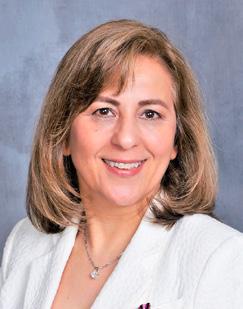
MENTAL HEALTH Photo Credit: Shutterstock.com/ TIMA MIROSHNICHENKO
34 EYE ON PSI CHI SUMMER 2023 COPYRIGHT © 2023 PSI CHI

Advancing Your Psychology Career Begins Here Choose Your Path: Clinical Psychology | Clinical Counseling Marital and Family Therapy | Organizational Psychology Organization Development | Psychopharmacology COAMFTE Accredited MFT programs | APA Accredited Clinical Programs alliant.edu/cspp ADVERTISEMENT

When Bad Things Happen, Could BIG-PICTURE Thinking Help? Interview With Marlone Henderson, PhD by Bradley Cannon Psi Chi Headquarters 36 EYE ON PSI CHI SUMMER 2023 COPYRIGHT © 2023 PSI CHI
Imagine that you had a friend who you would visit every month or so. One day, that friend disappeared from your life. When you reached out a few times to reconnect, they completely ghosted you. Only the weird thing is: You can’t think of anything you did to cause this or any reason why this might have happened.

Faced with never knowing why this person decided to stop being friends is an example of causal uncertainty, a psychological term describing persistent doubts people have about their ability to understand causes of social events, especially negative ones. Causal uncertainty can be uncomfortable, so when it occurs, people often resort to “big-picture,” abstract thinking in order to decrease their uncertainty about why an event occurred. Alternatively, sometimes people may be more comfortable digging into the concrete details in order to better understand or solve a problem.
Dr. Henderson is an associate professor at the University of Texas at Austin who studies the many nuances of causal uncertainty. When asked about people’s decisions of how to handle causal uncertainty, he is quick to preface his answer by first describing it as an “automatic process” rather than a “conscious decision.” Specifically, he explains, “There's probably a time in people’s lives when they might have stumbled upon a situation where abstract thinking made them feel better. Maybe over time, their minds picked up how it can help, but I don't believe participants in our studies are consciously aware that thinking abstractly will have the benefits of reducing uncertainty.”
Going back to the example of the lost friend, Dr. Henderson once experienced this situation firsthand. When no specific answers could be found, he soon started to think about the future—a good example of big-picture, abstract thinking. He says, “We know from other research that thinking about the far-off future can naturally lead people to think more abstractly. For example, when you go on an interview and are asked, ‘What do you see yourself doing in five years?’ you will naturally start thinking about big-picture things.”
Regarding the lost friend, Dr. Henderson asked himself, “Is this really going to be that big of a deal? It seems
major now, but in a year or five years, am I really going to care about that?” Looking back, he now believes that he had these thoughts in order to minimize the importance of not understanding why this person decided to stop being in his life, although, again, he doesn’t believe he intentionally did it at that time for the purposes of reducing uncertainty.
He says, “I generated a bunch of different ideas about what happened, such as maybe this person got really busy or maybe this person is just a bad friend. But I'll never know for sure, so when I started thinking about my life moving forward, I just kind of accepted it. That was good enough for me.”
Uncertain Beginnings
In 2012, a 20-year-old shot and killed 26 people in Newtown, Connecticut, at the Sandy Hook Elementary School. When the story broke, like others, Dr. Henderson felt powerless and confused about why someone would do such a terrible thing. He wasn’t one to follow every mass shooting, but until then, of the ones that he happened to notice in the news, he felt like he could always latch onto some kind of explanation.
He says, “I just remember being like, ‘Why the hell would someone do this? These are kids.’ It was just mind-boggling. And it still is mind-boggling, because we still don’t know why this person did that.”
Around that time, Dr. Henderson met with a graduate student to discuss an unrelated topic—a fateful conversation, which has influenced much of his research ever since. Sandy Hook was heavy on many people’s minds and came up organically as they spoke, mostly as yet another attempt to process that event. He says, “We felt like a lot of people were struggling with understanding why that shooting had occurred. That’s what a lot of the news stories were really about. So I started asking what we could do to maybe help from a research point of view. From there, we started thinking about how the research we were familiar with might be able to speak to how people come to feel some sense of understanding with tragic events like mass shootings.”
Dr. Henderson’s career in studying causal uncertainty blossomed from that first conversation. The graduate student he spoke with, Jae-Eun Namkoong, is now a professor at the University of Nevada, Reno, and she has been a coauthor on all of his work on the subject to date.
Rethinking Causal Uncertainty
Since those beginnings, Dr. Henderson’s views of on causal uncertainty have changed greatly. “At first,” he exclaims, “I was convinced that causal uncertainty is just bad and that we need to do whatever it takes to get rid of it!”
He had this view for several reasons, including that research as far back as the 1950s has shown that people feel a need to resolve uncertainty. He says, “We just don’t like uncertainty. One could even argue that it is a fundamental human motive to get rid of it. Obviously some people are more comfortable with it than others, but generally speaking, we try to resolve it. And so I was really thinking of it almost like depression, like you have to do whatever it takes to get rid of this feeling, because it just sucks.”
The more he researched the topic, the more he found that abstraction or big-picture thinking was the answer to reducing feelings of causal uncertainty. Unfortunately, it was relieving the uncertainty without actually giving people real answers.
That’s when he started to really take a step back and ask himself, “Is this problematic?”
Good, Bad, or Both?
An obvious shortcoming of big-picture or abstract thinking is that it doesn’t result in any real solutions, which could certainly lead to trouble! So, knowing this, should people resort to big-picture thinking to quickly reduce the uncomfortableness they feel that is caused by causal uncertainty? Or should people strive to tolerate their discomfort in order to avoid the overreaching, and possibly false, generalizations caused by big-picture thinking?
Over time, Dr. Henderson has developed a nuanced answer where the appropriateness of big-picture thinking depends largely on a person’s goals. As an example of when big-picture thinking could be harmful, he says, “People in certain professions need to understand why something bad happened. If the process that they’re using isn't really giving them answers—it's just giving them this kind of illusion or feeling of understanding—then I'm not sure that's so beneficial. For example, let's say you work in school security or school safety. I wouldn't argue that
DISTINGUISHED LECTURER
Photo Credit: Shutterstock.com/ BENJAVISA RUANGVAREE ART 37 SUMMER 2023 EYE ON PSI CHI COPYRIGHT © 2023 PSI CHI
abstract thinking is not going to give you true insight to reduce mass shootings.”
But on the other hand, what if you are consuming news on your phone and see an upsetting event that isn’t in your local community? When something like this happens, Dr. Henderson believes it might actually be okay to merely “feel like” you know why a horrible thing happens so that you can feel better and move on with your life. After all, many alarming news stories are released every hour, making it impossible to perform a deep dive into all of them. Big-picture thinking can help to support your mental health by alleviating some of the negative things that have been linked to causal uncertainty, such as perceived lack of control and rumination, which is repetitive thinking or dwelling on negative feelings and distress.
On Altering Preferences for Abstract Thinking
In 2016, Drs. Namkoong and Henderson published a study investigating what happens when people are intentionally led toward either concrete or abstract thinking. Would either group be less likely to return to abstract, big-picture thinking later? For the study, they manipulated whether participants thought in big-picture or detailed reasons for a relationship breakup, and then they measured the participants’ actual preferences and attitudes toward thinking at a big-picture or concrete level. Surprisingly, what they found is that participants forced to think at a big-picture level were then less interested in continuing to think at a big picture level.
Dr. Henderson explains the results like this, “Once participants thought at a big-picture level, we assume it kind of helped them feel better, and so there was no reason to keep thinking at a big-picture level. They actually show that they are now more interested in moving on to thinking about the details in life.”
Other participants, who were forced to think about concrete details about the relationship breakup, experienced a high amount of causal uncertainty. And interestingly, they were the ones more likely to say later, “Oh, I would prefer to think more abstractly, like at a big-picture level."
Dr. Henderson argues that this preference is due to the fact that their feelings of
uncertainty had not yet been resolved, although they probably weren’t conscious of the fact that their desire to pursue big-picture thinking might actually help them feel better.
Spotting Concrete and Abstract Messages
A number of ways exist to identify concrete and abstract messages. But as Dr. Henderson somewhat humorously exclaims, “The short answer is, there is no easy way!”
He has a few thoughts, but first he takes a moment to remind us that abstraction doesn’t necessarily indicate a lack of critical thinking or malicious intentions:
“You are right that politicians or basically anyone speaking to a large audience tends to use more abstract language. That actually has been documented. There's some research by Priyanka D. Roshi and Cheryl Wakslak (2013) showing that, when you manipulate the audience size, people tend to use more abstract language when they're addressing a larger audience. Obviously politicians do this, even when they’re speaking one-on-one with a reporter, because they know that a potential larger audience will be able to read or hear what they say. I think they always
have in mind that more people can become aware of their message, and so they naturally do use more abstract language.”
Dr. Henderson believes that this isn’t necessarily a bad thing. He says, “One of the nice things about using abstract language is that it allows you to connect to a more diverse audience. If you don't have to get into the specifics, people kind of hear what they want to hear when you use abstract messages. That allows you to connect with various members of an audience.”
That being said, people might have malicious intentions at certain times, such as hiding specific details from the public. Revisiting the scenario of someone trying to prevent school shootings, there are times when abstract language should be avoided. When you are in this situation and need complex details to resolve it, Dr. Henderson encourages you to try comparisons to see if some sources provide more specifics than others and if there might be other ways of talking about a particular subject.
He says, “Number one, be informed. If you expose yourself to different sources, eventually you will come across sources that use things or speak at a level of detail that you want. Then you can say to others, ‘I know this is not the only way we can talk about this because I just watched X, Y, and
DISTINGUISHED LECTURER Photo Credit:Vecteezy.com/ JEMASTOCK
38 EYE ON PSI CHI SUMMER 2023 COPYRIGHT © 2023 PSI CHI
Z talk about it this way, and they provided a lot of detail. Why are you not doing that?’ ”
Dr. Henderson notes that you will sometimes see this when moderators challenge politicians during debates, though not as often as he would like because many moderators merely nod their heads and move on. His favorite example, he says, is when someone provides a politician with an example of a time when they said something contradictory in the past. The person will then ask something like this: “I have you on record talking about it in this way. Were you wrong there? Why are you not getting into these details now? Let’s talk about that.”
Thinking to the Future: A Big-Picture Way to Conclude This Interview
In Dr. Henderson’s lab, they often refer to big-picture, abstract thinking as “the illusion of understanding.” And yet, as this interview reveals in several ways,
big-picture thinking does have certain benefits when used in appropriate situations. When asked what he hopes to accomplish by learning more about causal uncertainty, Dr. Henderson says, “The more we conduct this research and these kind of interviews, the more people will become aware of the benefits of reducing causal uncertainty—at least the feeling of it—through thinking at a big-picture level. Although people may not be conscious of the effects of big-picture thinking now, it could become a tool that people could intentionally implement on their own, which is referred to in social psychology as a self-regulatory strategy.”
To readers who might be hesitant to embrace abstract thinking, Dr. Henderson leaves you with these final thoughts about how it can help a person dealing with uncertainty. The Sandy Hook shooting led him to begin on this research path, so using this example one last time to conclude, consider what you might want to
say if your own child asked you why those kids were killed. In this situation, Dr. Henderson says, “You probably wouldn’t want to walk them through death and give them the specific ins and outs of why shootings happen in life. You just need to make your kid feel better. Big-picture thinking could be a tool that really helps.”
References
Joshi, P. D., & Wakslak, C. J. (2013). Communicating with the crowd: Speakers user abstract messages when addressing larger audiences. Journal of Experimental Psychology General, 143 (1), 351–362. http://dx.doi.org/10.1037/a0032413
Namkoong, J., & Henderson, M. D. (2016). Wanting a bird's eye to understand why: Motivated abstraction and causal uncertainty. Journal of Experimental Social Psychology, 64 , 57–71. https://doi.org/10.1016/j.jesp.2016.01.014
Dr. Marlone D. Henderson received his PhD in social psychology from New York University in 2006 after which he was an assistant professor in the Department of Psychology at the University of Chicago until 2008. He is currently an associate professor in the Department of Psychology at the University of Texas at Austin.
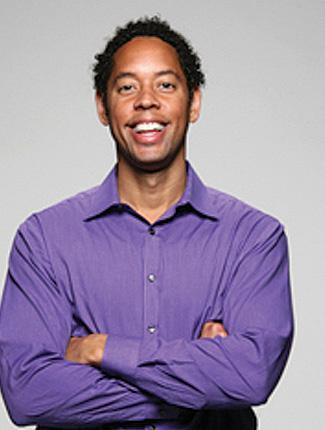
Christian Ladd Hall Scholarship for Mental Health Advocacy
DONATE TODAY to support students seeking professional careers in mental health advocacy
The Christian Ladd Hall Scholarship for Mental Health Advocacy will provide one $3,000 scholarship annually to an advanced undergraduate or graduate Psi Chi member pursuing a professional career related to mental health advocacy. Recipients may also receive up to $1,000 to design and conduct a community based mental health advocacy program.
This campaign has three objectives:
1. increase the availability of mental health advocacy opportunities for Psi Chi members,
2. draw greater attention to the need for mental health advocacy, and
3. honor the memory of Christian Ladd Hall, whose life story was impacted by mental health challenges.
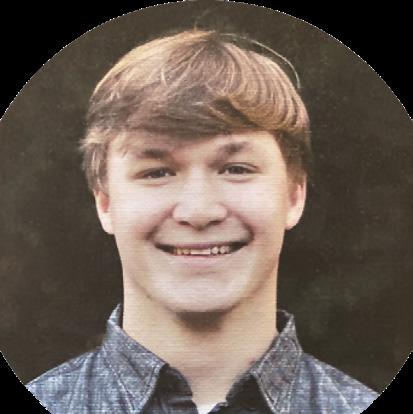
Christian Ladd Hall passed away from accidental fentanyl poisoning on July 9, 2022, at the age of 27. Diagnosed with Bipolar II, all aspects of Christian’s life story were impacted by these mental health challenges. Christian’s story of defeats and victories is similar to so many others who will benefit from increased mental health advocacy and action.
https://www.psichi.org/page/ChristianLaddHallScholarship

DISTINGUISHED LECTURER
®
39 SUMMER 2023 EYE ON PSI CHI COPYRIGHT © 2023 PSI CHI ADVERTISEMENT
by Elisabeth Barrett Psi Chi Headquarters

Photo Credit: Shutterstock.com/ PROSTOCK STUDIO
Leveraging Technology for Health Promotion An Interview With Sherry Pagoto, PhD 40 EYE ON PSI CHI SUMMER 2023 COPYRIGHT © 2023 PSI CHI
People on social media consume and produce endless streams of information, often leveraged as a source of inspiration and community for many group interests, like health and lifestyle. You can document weight loss journeys on Facebook, share favorite go-to healthy recipes on Instagram, snap meals on Snapchat, and upload workout montages to TikTok. Although these groups can ooze support and encouragement for their members, group members also face unique challenges to achieving their goals—challenges that may not be addressed in a “lose 30 pounds in 30 days” fad diet.
You can ask someone trying to lose weight if they think they eat too much; they’ll likely say yes. You can ask them if they know what healthy eating is; they’ll likely say yes. On a basic level, people know it is healthy to eat fruits, vegetables,
and fiber, but that doesn’t mean they do it. In which case, doling out healthy meal plans and workout videos doesn’t address what makes doing these things so hard.

That’s the problem.
In a culture of calorie counting, exhaustive exercising, and perpetuating self-doubt, people often overlook one thing behind why they aren’t losing weight, feeling healthier, or achieving their goals—context. Whether that context is centered around habitual, environmental, psychosocial, or biological variables, no single health plan is a “one size fits all” path to a healthy diet—a narrative Dr. Sherry Pagoto addresses face-on in her research and social media online outreach.
Dr. Pagoto is a clinical psychologist, researcher, and professor at the University of Connecticut and is known for her work on leveraging technology for behavioral interventions that target physical activity, diet, and prevention of cancer. Through the use of research, behavioral therapy, and social media platforms like private Facebook Groups and mobile applications, Dr. Pagoto is using evidence-based interventions to counter the way people view and go about developing healthier lifestyles. Through these methods of identifying barriers that obstruct one’s ability to lose weight, she’s bringing focus to behavioral patterns rather than solely on diet.
She illustrates this by explaining that people can track when they complete or miss a workout, keying in on the factors behind why they missed it. For example, one may find they often skip a morning workout because they snooze through their alarm. This method addresses and problem-solves the why of the situation. Why can’t they work out? Because it’s early and they’re tired. Behavioral interventions help people learn how to identify and problem-solve unhealthy patterns, allowing for better outcomes. Just because someone consistently misses their workout doesn’t mean they lack willpower or the desire to be healthy, but rather they may be failing to exercise because of contextual barriers.
But what is willpower? Dr. Pagoto dives into this, saying “Is willpower a thing? Where is it? If I say point to your willpower right now, you can’t because it’s not a thing. We make it up as a thing

we want to point to and say, ‘Oh, it’s this mysterious thing that you either have a lot of or a little,’ but the concept of ‘willpower’ really doesn’t explain anything. It sounds like it does, but it doesn’t. It’s just a made up term to refer to the fact that I didn’t change my behavior.”
Overlooking the context of behavior and overemphasizing the effect of willpower can have a negative impact on both confidence and mood. According to Dr. Pagoto, the individual gets trapped in a downward spiral and is unable to achieve their goals, causing them to blame themselves for being weak. Dr. Pagoto says, “The problem with the concept of willpower is that people end up blaming themselves for not having enough of it and then feel badly about themselves. But what true behavior change requires is understanding why we are stuck. Why is it hard to exercise for that particular person, what are the barriers, and under what circumstances can this person be successful?”
DISTINGUISHED LECTURER Photo Credit: Pexels.com/ ALENA DARMEL
41 SUMMER 2023 EYE ON PSI CHI COPYRIGHT © 2023 PSI CHI
Meet the Patients Where They Are
Back in 2011, there weren’t many health professionals on social media, but Dr. Pagoto recognized the potential for social media as existing space for online patient communities who were eager to interact, learn from, and support each other. She realized that this was a tool that patients were already using and concluded that health professionals should also learn it in order to be conveyors of legitimate health information. With this initiative, she focused her sights on developing health promotion programs on social media platforms. Facebook being a popular platform where people were already active, Dr. Pagoto began her research by creating private Facebook groups with coaches and curated feeds. Here, patients could interact with a coach for health issues—like diabetes management and lifestyle intervention—to set goals, solve problems, gain feedback,
and discuss behavioral strategies. Unfortunately, the democratization of the social media space also means that anyone can build an audience and be influential, causing healthcare professionals to often play defense against a persuasive portion of people who disseminate misinformation. Acknowledging the problem of misinformation, Dr. Pagoto is interested in devising ways to utilize social media to minimize misleading or downright false health information. She sees this especially around weight loss narratives—like how long it actually takes to lose weight—from fad diets and profit-forward scammers. As a result, part of her job is to “deprogram some of the things that people heard and believe. For example, sometimes you have to re-educate people about how long it takes to lose weight, because they’ve seen a thousand ads that say ‘lose 10 pounds in 10 days.’ ”
When people fail to meet the unrealistic goals that they repeatedly see online, Dr. Pagoto explains, “They go down a bad mental path of feeling bad about themselves because they are hearing these messages.” To effectively change this narrative, she recommends that researchers:
1. understand what the common misconceptions are,
2. address them in your interventions, and
3. start conversations about misconceptions with your participants to allow them access to evidence-based perspectives on the healthy ways to change their behavior.
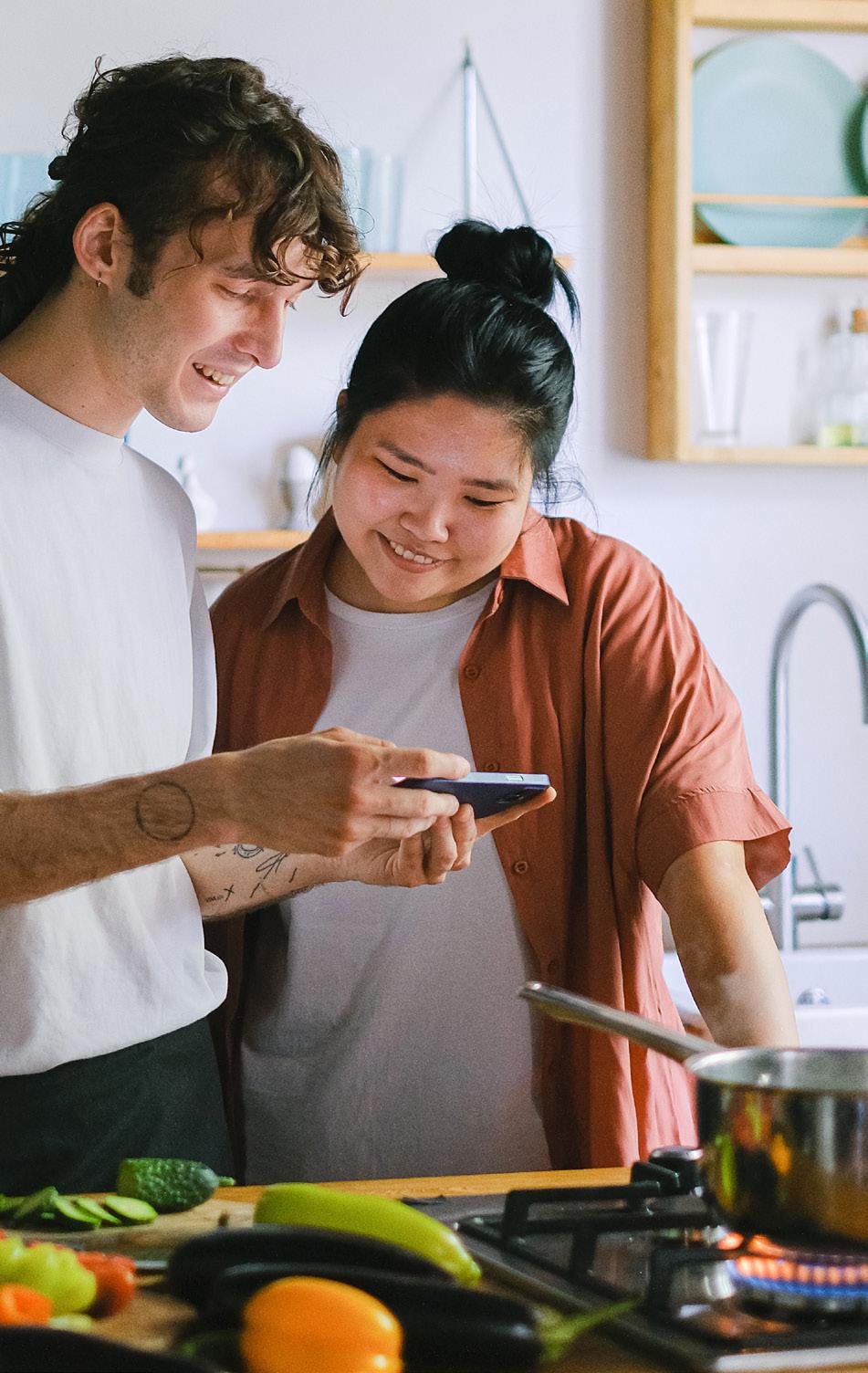
This is what her Facebook groups provide: a space for evidence-based programming with the mission to ensure that the information that’s being shared is of high quality. Not only have her initiatives helped pave the way for the online healthcare professional community, but in the process, they have also increased accessibility in the healthcare. These participants can have the same discussions they would have if it was a clinical-based program without having to leave their house.
Dr. Pagoto states that digital interventions increase access for people in rural areas who may not have access to in-person care, those who may be uncomfortable being in-in person programs, and individuals without the
means for childcare or the ability to travel, etc. She explains that additionally, because so many people already utilize social media, healthcare professionals don’t need to teach it as a new technology; and by creating specified spaces to deliver health programming, like weight loss, healthcare professionals can protect their patients from trolls and misinformation. Although patients and participants may still stumble upon misinformation elsewhere, they can at least maintain a safe space to ask about its validity. Reflecting on her platform’s culture, Dr. Pagoto explains, “Participants who participate are engaging with the content we’re putting out there. They’re talking to each other. They’re supporting each other. They’re sharing their goals. They don’t see themselves as purveyors of information. They’re digesting the information that we’re giving them and implementing in their lives.”
Like it, Share it, Track it… But Wait, There’s More!
Due to the constant evolution of the social media landscape, healthcare professionals are always looking at new ways to leverage social media technologies. Dr. Pagoto stresses the importance of understanding the different platforms, purposes, and users when it comes to using social media in your work. For example, if trying to connect with younger people, it is important to think about how to utilize Snapchat, TikTok, and Instagram. If trying to connect with older or middle-aged adults, Facebook is probably a better match.
However, there are other ways to reach audiences, and with this in mind, Dr. Pagoto developed a mobile app called Habit. Habit app helps users understand the context of their dietary choices and exercise motivation. Dr. Pagoto clarifies how this mobile app serves as an alternative to calorie tracking, saying, “It helps people track only their overeating episodes and contextual factors surrounding them so they can better understand why they overeat. And it helps them also solve the challenges that they identify as they’re tracking their overeating.”
Most weight loss apps require you to track every single meal, food, drink, or calorie someone eats every day, with a calorie goal in mind. This is a tedious process that
DISTINGUISHED LECTURER Photo Credit: Pexels.com/ ANNA SHEVETS
42 EYE ON PSI CHI SUMMER 2023 COPYRIGHT © 2023 PSI CHI
most people don’t prefer to do for very long. Dr. Pagoto emphasizes that a decent portion of peoples’ diet is actually fine and it’s just the occurrence of certain episodes that account for a lot of the extra calories. Helping people identify those moments that account for the extra calories and problem solve in those moments can be very useful.

In an example of stress eating between 2 p.m. and 3 p.m. at work, Dr. Pagoto walks us through how the individual can respond, using her pilot app. After an overeating episode occurs, the user can open the app to track the occurrence. Once the episode is entered, the app then asks the user a series of questions about how the user feels and where they are to help highlight what types of condition triggers their overeating episodes. Eventually, the user can look at all their overeating episodes and pick out any reoccurring patterns like in those moments when they feel stressed out.

After the episode and problem are identified, a list of problem-solving strategies is provided based on the user’s input. Dr. Pagoto explains that the app
“helps people find those insights, because otherwise, you’re fumbling around in the dark of like, ‘Oh, maybe I’ll just try this, or maybe I’ll just try that. The app gives some structure to those behavioral experiments.’” By cycling through this process, the user stays in a loop of iterating solutions rather than giving up or feeling discouraged due to one potentially ineffective strategy.
Although she hopes to commercialize her app going forward, she’s prioritizing running it through a series of pilot tests first. Dr. Pagoto says, “We’re kind of going in a reverse direction, a lot of companies make apps and then study them later… but I’m a scientist, I work in the other direction. Let’s create something that works. And if it does, then let’s push it out there, but if it doesn’t, let’s not bother because we don’t need another thing that doesn’t work.”
Going Forward
Where you are in your weight or health journey, don’t be too hard on yourself if you miss a workout, forget to track a meal, or have an over-eating episode; it doesn’t
mean you’re weak or lack willpower. If you believe in willpower, Dr. Pagoto advises you to think about it as fluid, saying, “Some moments you have it, some moments you don’t, but it’s really just sort of a measure of our success at doing something we wanted to do.” It’s impossible to know where technology and social media will lead in the future, but one thing is likely: it’s not going away. Dr. Pagoto highlights that, with the shortage of therapists, finding other cost-effective ways to increase access of behavioral therapy to the public is an important step to living the healthy lifestyle they desire.
Dr. Pagoto is a licensed clinical psychologist, professor, and social media researcher. She is a Professor in the Department of Allied Health Sciences at the University of Connecticut, Director of the UConn Center for mHealth and Social Media, and Past-President of the Society of Behavioral Medicine. Her research focuses on leveraging mobile technology and social media in the development and delivery of behavioral interventions for cardiovascular disease prevention. She has had federal funding for her research for 20 consecutive years, has published 236 papers in peer-reviewed journals on these topics, and was the 2014 recipient of the Obesity Society Pioneer in mHealth/eHealth.
DISTINGUISHED LECTURER Photo Credit: Vecteezy.com/FF
43 SUMMER 2023 EYE ON PSI CHI COPYRIGHT © 2023 PSI CHI
Looking Back on a Legacy.
Interview With Outgoing Executive Director
Martha S. Zlokovich, PhD
by Bradley Cannon Psi Chi Headquarters
Could a person from 15 years ago recognize Psi Chi as it is today? The number of staff members has dramatically increased in order to oversee a plethora of new membership benefits—collaborative research projects, scholarships, giving programs, a career center, and additional publications. The Central Office was retitled “Psi Chi Headquarters,” and staff began working remotely from their homes in 2020. The Psi Chi website is now mobile friendly with a larger variety of merchandise in the Store. Psi Chi has more local chapters than ever before, in more countries than ever before. Even the organization’s name has changed, from “National” to the “International” Honor Society in Psychology in 2009.
Despite these many changes, the same sense of camaraderie and excitement to foster future generations of psychologists remains steadfast. From the local chapter level all the way up to Psi Chi’s Board of
Directors, this consistency of mission is chiefly due to the leadership of Dr. Martha S. Zlokovich. Martha has worked tirelessly throughout these past years. She has not only looked ahead to embrace new opportunities, but importantly, she has kept members and leaders focused on what our society does best: “recognizing and promoting excellence in the science and application of psychology.”
Martha became Psi Chi’s second Executive Director in 2008. Now, 15 years later, she will soon leave Psi Chi in even better shape than when she stepped into the position—more transparent, increasingly inclusive, more financially secure, better connected, and noticeably bigger in both membership and impact.

Martha completed a previous Eye interview in 2019 regarding topics such as how she got involved with Psi Chi, which accomplishments she is most proud of, and Psi Chi’s progress becoming international. Now, as she prepares to step down from the position of Executive
Director in August, we appreciate her taking the time to answer the questions below in order to expand on her life and historic achievements that have made Psi Chi the International Honor Society in Psychology as we all know it today. When and how did you first decide that you wanted to pursue a career in psychology?
In 11th grade I took a psychology class that was fascinating to me, and started thinking then I wanted to double major in psychology and German. I had been an exchange student to Germany in 10th grade. After starting college at the University of Hawaii as a double major, I considered other majors such as art, creative writing, English, journalism, or architecture, but never switched from psychology! After transferring to UCLA, I did change my double major in German to a minor.
Could you identify any mentors or other influences that helped to shape who you are today?
44 EYE ON PSI CHI SUMMER 2023 COPYRIGHT © 2023 PSI CHI
Even though they are not psychologists, my parents have been important mentors. They supported my choices and were encouraging without being at all directive. They were both first-generation college students (along with their siblings), both earning their medical degrees, so they paved an easier path for me to succeed in college. They also modeled how to lead a balanced professional and family life, while also supporting causes important to them to make the world a better place.
Other important mentors were developmental psychology faculty at the University of Florida, Dr. Patricia Miller and Dr. Scott Miller, fellow developmental psychology graduate students Dr. Teri Davis and Dr. Nanci Woods (both faculty now), and my colleagues at Southeast Missouri State University, particularly Dr. Rick Burns, Dr. Bill Snell, Dr. Gail Overbey, and Laura Delgado. Past Psi Chi Board Presidents Dr. Melanie Domenech Rodríguez, Dr. Betsy Morgan, Dr. Susie Amato Henderson, Dr. Jon Grahe, Dr. Regan Gurung, and

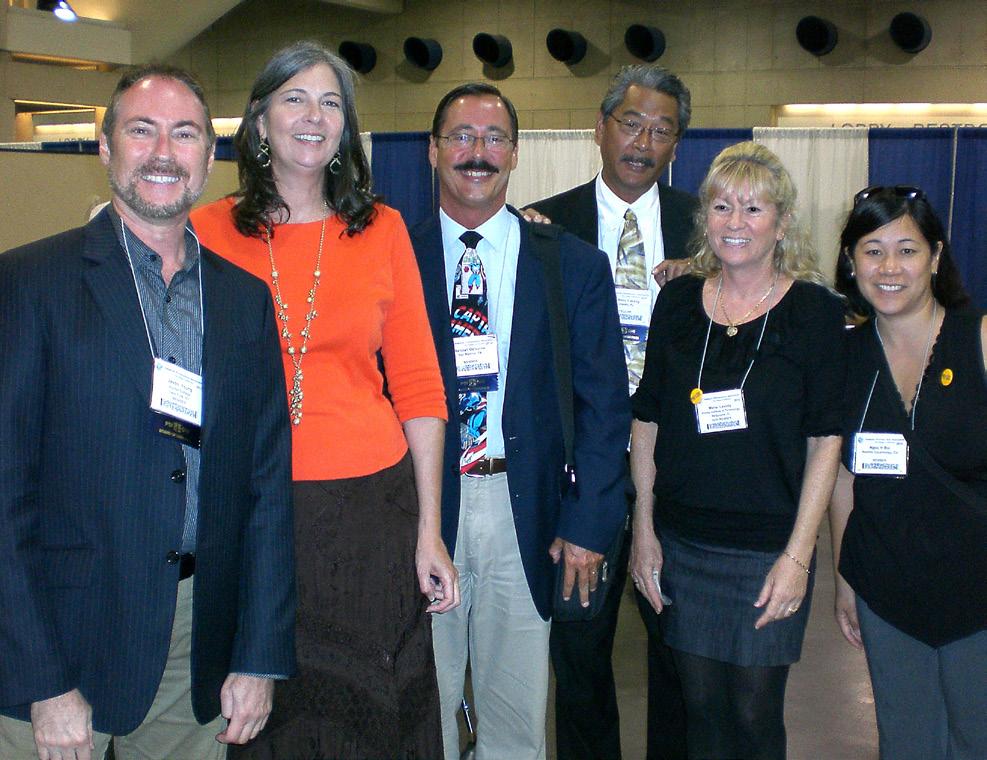
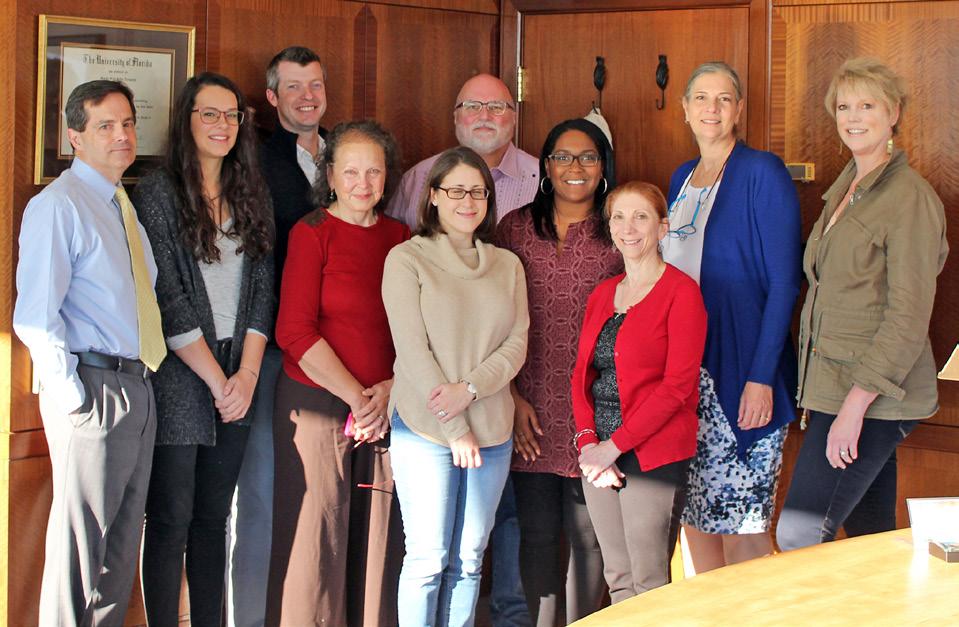
Dr. Eric Landrum have also been important mentors as well as friends.
What has been the most rewarding and most challenging parts of being ED?
The most rewarding part of serving as ED has been the ability to have a positive and lasting impact on the organization so that Psi Chi can better serve its members and alumni. This impact didn’t happen in one day but unfolded gradually over my time as ED. I look forward to seeing how these changes, and new ones, continue to positively influence the Society in years to come.
Most challenging has been leading the organization through a global pandemic— which I’m sure most EDs and CEOs might say these days! The pandemic required our staff to pivot quickly to working from home while maintaining expected services to our members. In addition, we developed new ways to support members, students, alumni, faculty, faculty advisors, and Board members who were also coping with the pandemic.
Psi Chi has grown a lot in the past 15 years. In what ways has the ED position changed during that time?
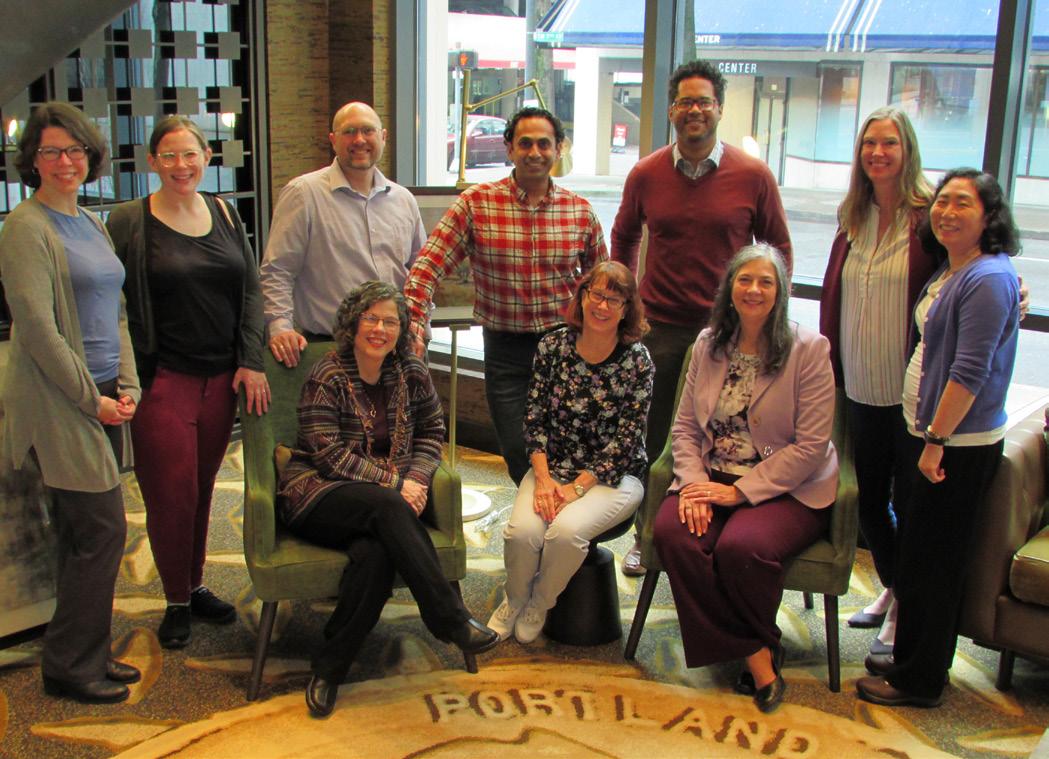
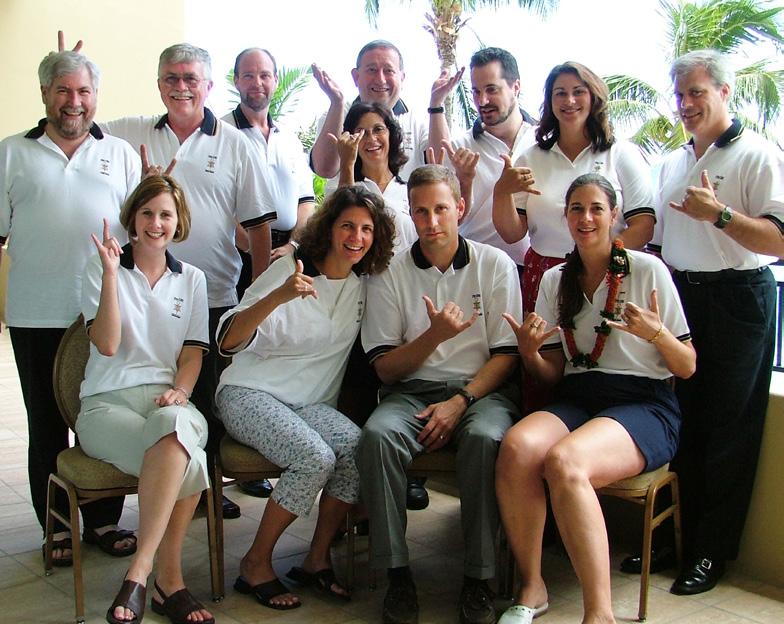
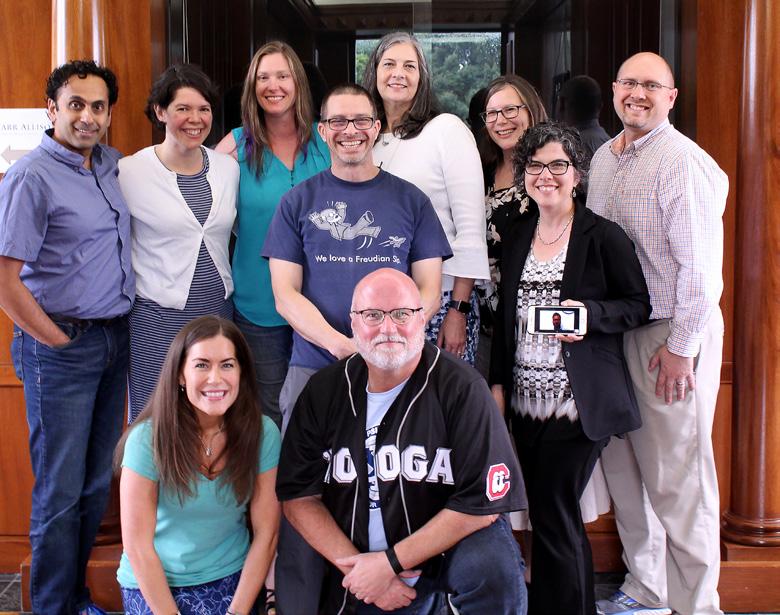
In some ways not at all, but in others quite a bit. The basic job description is the same, but expectations are much clearer now than when I started. The Board and I have worked over the years to clarify appropriate leadership roles for the Board President vs. the Executive Director. Along with various staff position changes and updates, we clarified the ED’s role as liaison between Board and leader of staff, in contrast to the Board President’s role as leader of the Board. In addition, I have had the pleasure of working to fulfill the hopes and dreams for this position when it was reinvented in 2003 to include leading a strategic vision for the organization, developing important relationships with other psychological organizations, and growing Psi Chi globally.
Do you perceive Psi Chi any differently now as ED than you did when you were a local
PSI CHI HEADQUARTERS
45 SUMMER 2023 EYE ON PSI CHI COPYRIGHT © 2023 PSI CHI
faculty advisor or even a Board member? If so, please explain.
I’ve heard several Board members express the same feeling I had as a Board member—that being a Board member allows you to see every benefit available to our students and fellow faculty members. Because faculty have so many other demands on their time, it is not hard to imagine why opportunities and resources might be missed. Having served as a VP and President, and now as ED, my perspective includes both those kinds of opportunities from a member perspective, but also the work behind making them available from a steward perspective. Serving as ED gave me the chance to appreciate the strengths, continued applicability to current students’ lives, and long-term influence of the Society.
In a previous interview, you described MANY ways that Psi Chi changed during your first decade as ED, from 2008 to around 2019. What major changes might you add to that list that have happened since then, from 2020 until present day?
• Expanded NICE (the Network for International Collaborative Exchange) to more countries and languages
• Awarded first endowed Prosser Scholarship
• Allowed second-language abstracts in Psi Chi Journal
• Awarded new diversity badges beginning in 2022 for Psi Chi Journal
• Adjusted charter requirements for global perspective
• Expanded to a fourth advisory committee supporting teaching faculty
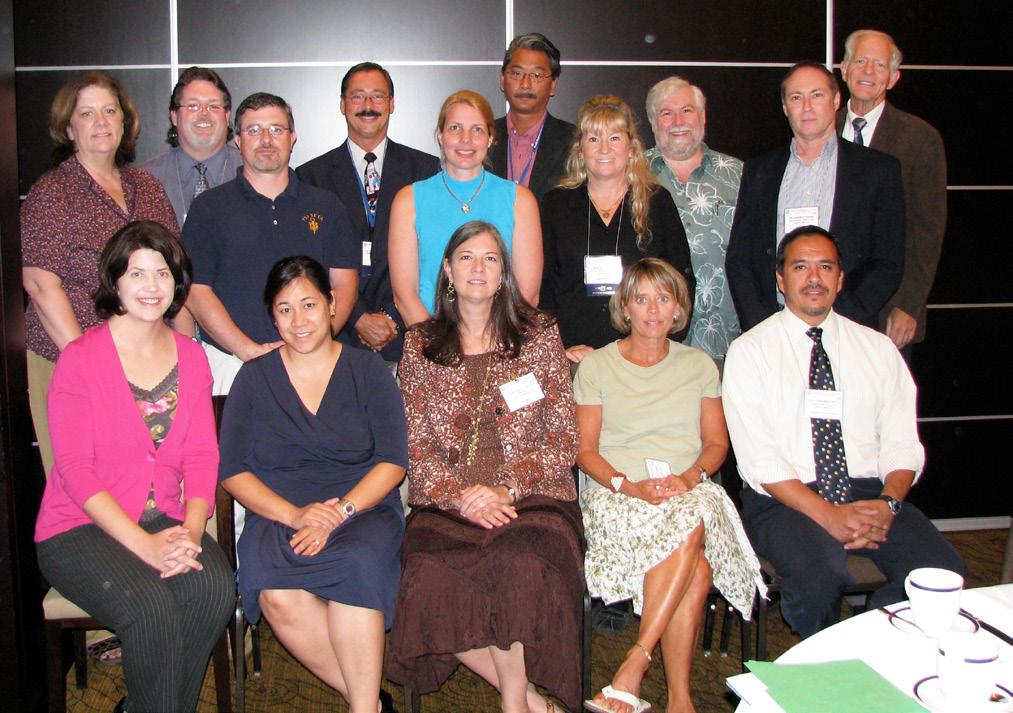

• Pivoted to work from home office environment with staff living in five states
What do you hope to see for the future of Psi Chi?
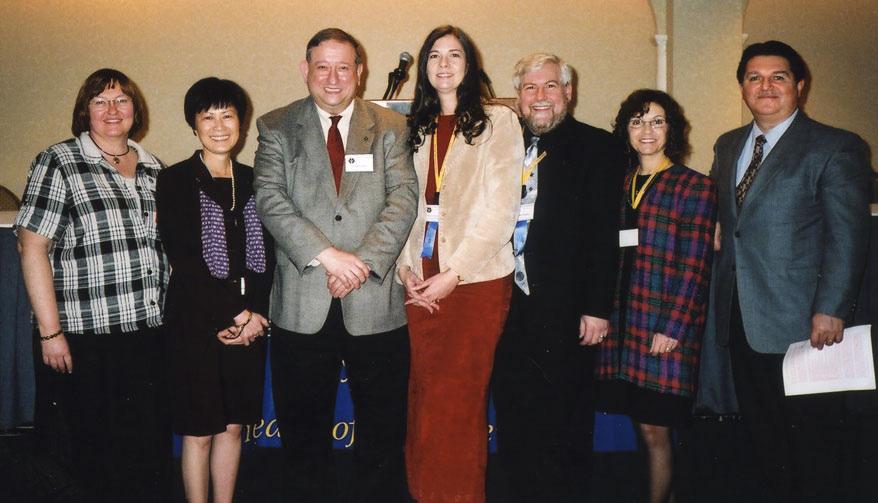
I hope that Psi Chi remains a vital organization that serves psychology students and faculty through the many expected changes in higher education. Despite the likelihood of lower enrollments in the next decade, we know there is great need for psychologists and counselors as well as for people who have honed the skills they learned as a psychology major. We will turn 100 in 2029, but I hope that anniversary underscores Psi Chi’s ability to change with the times in order to best support psychological science and our members.
Do you intend to stay connected to Psi Chi after you retire? If so, in what ways?
I definitely plan to stay connected to Psi Chi after I retire—after all, it’s a lifetime membership! If we (Research Advisory Committee) are successful in applying for

PSI CHI HEADQUARTERS
46 EYE ON PSI CHI SUMMER 2023 COPYRIGHT © 2023 PSI CHI
a conference grant, I have agreed to cochair the conference planning committee with Dr. Mary Moussa Rogers. You may also receive a submission or two for the Eye, I’ll continue to participate as needed on the Council of Past Presidents, and will contribute to finalizing manuscript submissions arising from NICE projects. In 2019 I mentioned that I’d like to see Psi Chi give 100 scholarships on our 100th anniversary, and will support Psi Chi’s efforts to reach that goal.

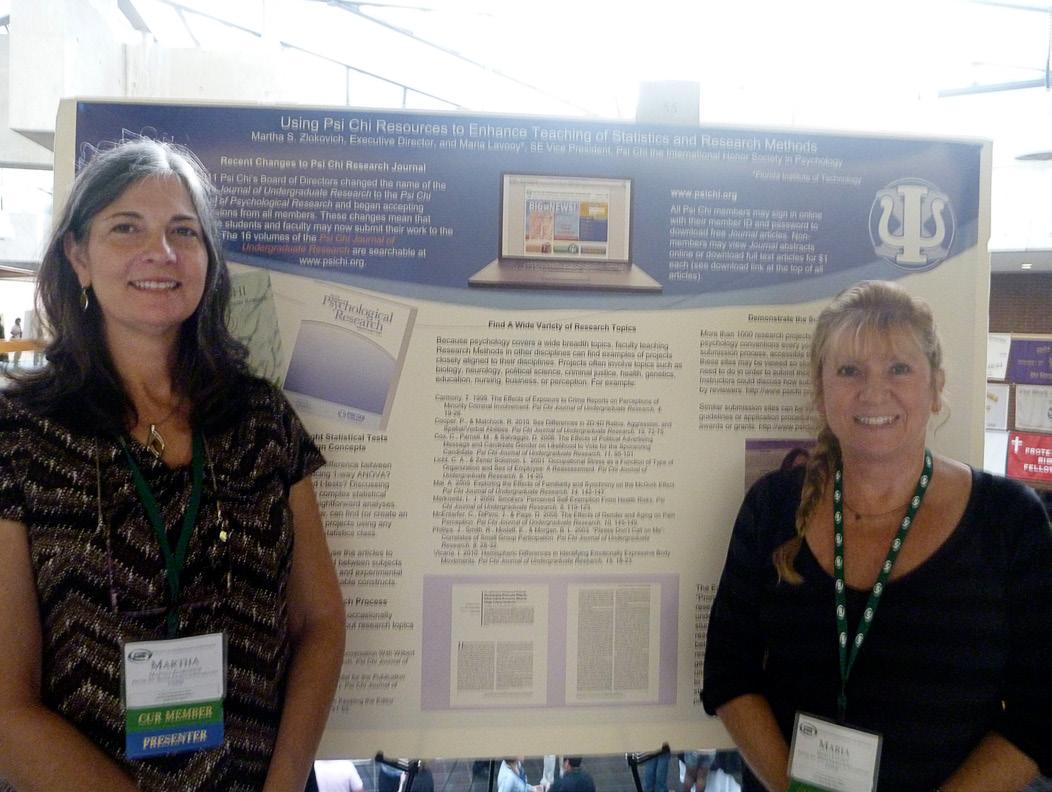
Is there anyone you would like to thank who has been helpful to you or to Psi Chi in general during your time as ED?
I would like to thank all of our staff, especially those I’ve worked with the longest: Director of Finance Laura Bauer, Director of Information Systems Kevin Germain, and Director of Communications Susan Iles. They have stood with me and contributed in
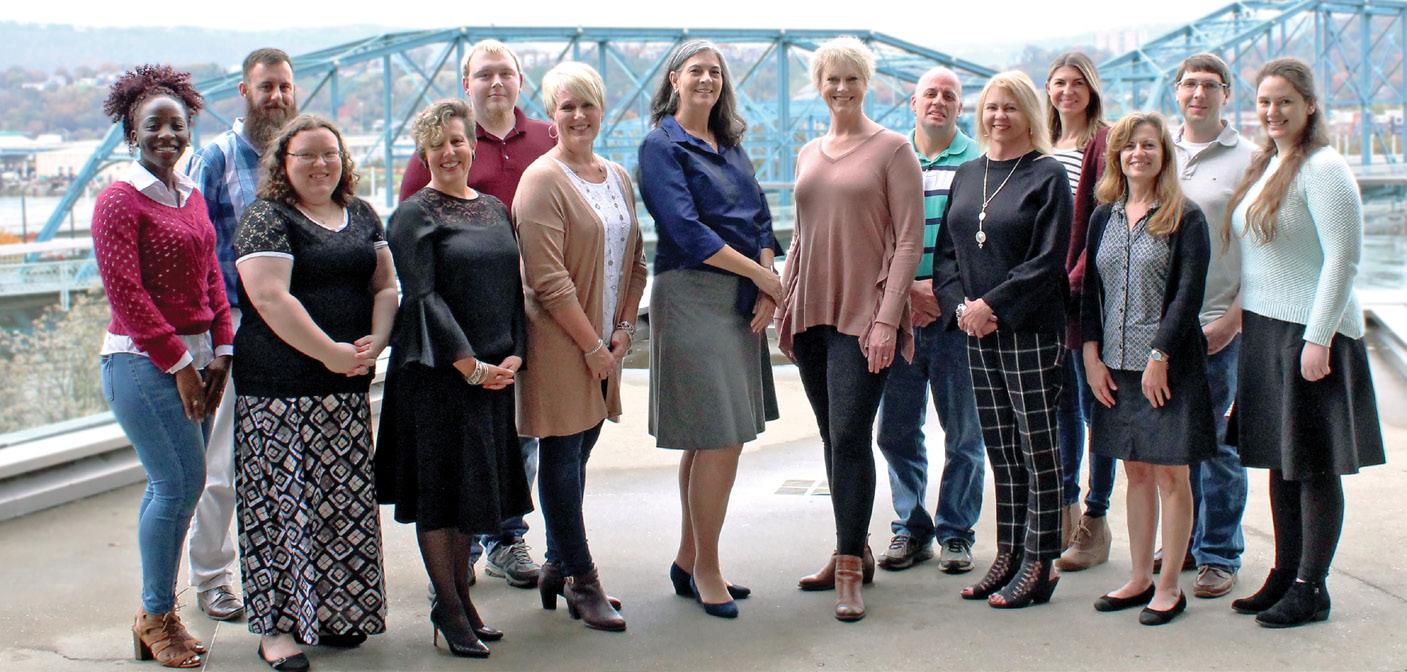
superhuman ways to many transitions and exciting changes. I would especially like to thank Research Director Dr. John Edlund and our five NICE committee chairs (all of whom were graduate students when they served), Dr. Kelly Cuccolo, Dr. Mary Moussa Rogers, Megan Irgens, Cory Cascalheira, and Antonios Kagialis, for their tireless work in expanding research opportunities for members as they contributed to carrying out the seed of my international collaboration idea into what became the NICE research projects. In addition, I’d like to thank every Board member I have worked with over the years, especially those who served as President since 2007.
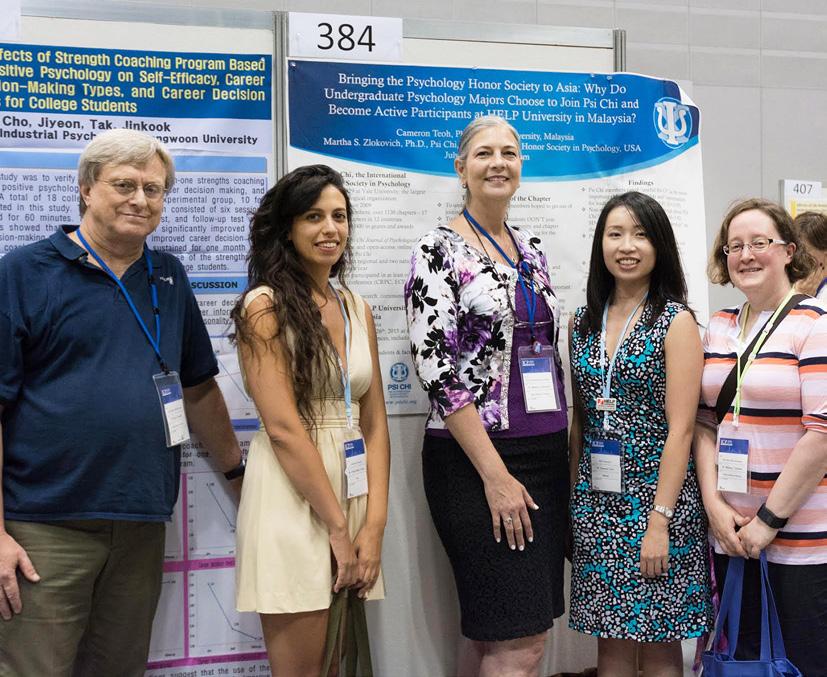
Last but not least, do you have any words of wisdom or encouragement for the incoming ED, Dr. Marianne Fallon?
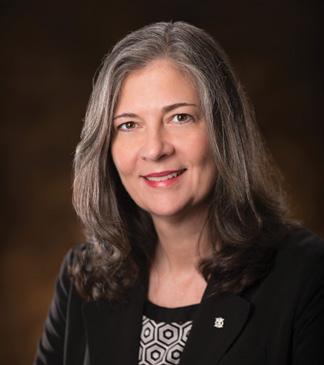
If you hold fast to Psi Chi’s mission you can’t go wrong. And call me any time!
Martha S. Potter Zlokovich, PhD, studied psychology and German her freshman and sophomore year at the University of Hawaii, Manoa, transferred to UCLA where she completed her BA in psychology, then earned her MS and PhD in developmental psychology at the University of Florida. She joined Psi Chi in 2008 as its second Executive Director, leaving Southeast Missouri State University after 17 years where she taught Child Development, Adolescent Development, Lifespan Development, Advanced Child Psychology, and Introductory Psychology for Majors, earned Full Professor, and served as Interim Director of the Center for Scholarship in Teaching and Learning as well as Psychology Department Chair. Becoming Psi Chi’s Executive Director, however, was not her first involvement with Psi Chi. She served as chapter advisor since 1993, as Midwestern Region Vice-President (1998–2000), and as National President of Psi Chi (2003–04). In 1996, Southeast’s chapter won the Ruth Hubbard Cousins National Chapter of the Year Award, and several chapter members have won Psi Chi Regional Research Awards at MPA and/or had their research published in Psi Chi’s Journal
PSI CHI HEADQUARTERS
47 SUMMER 2023 EYE ON PSI CHI COPYRIGHT © 2023 PSI CHI
Submission Guidelines
With more than 1,180 chapters, Psi Chi members can make a significant impact in their communities. Reviewing Chapter Activities in Eye on Psi Chi is a great way to find inspirational ideas for your chapter and keep in touch with your chapter after you graduate.
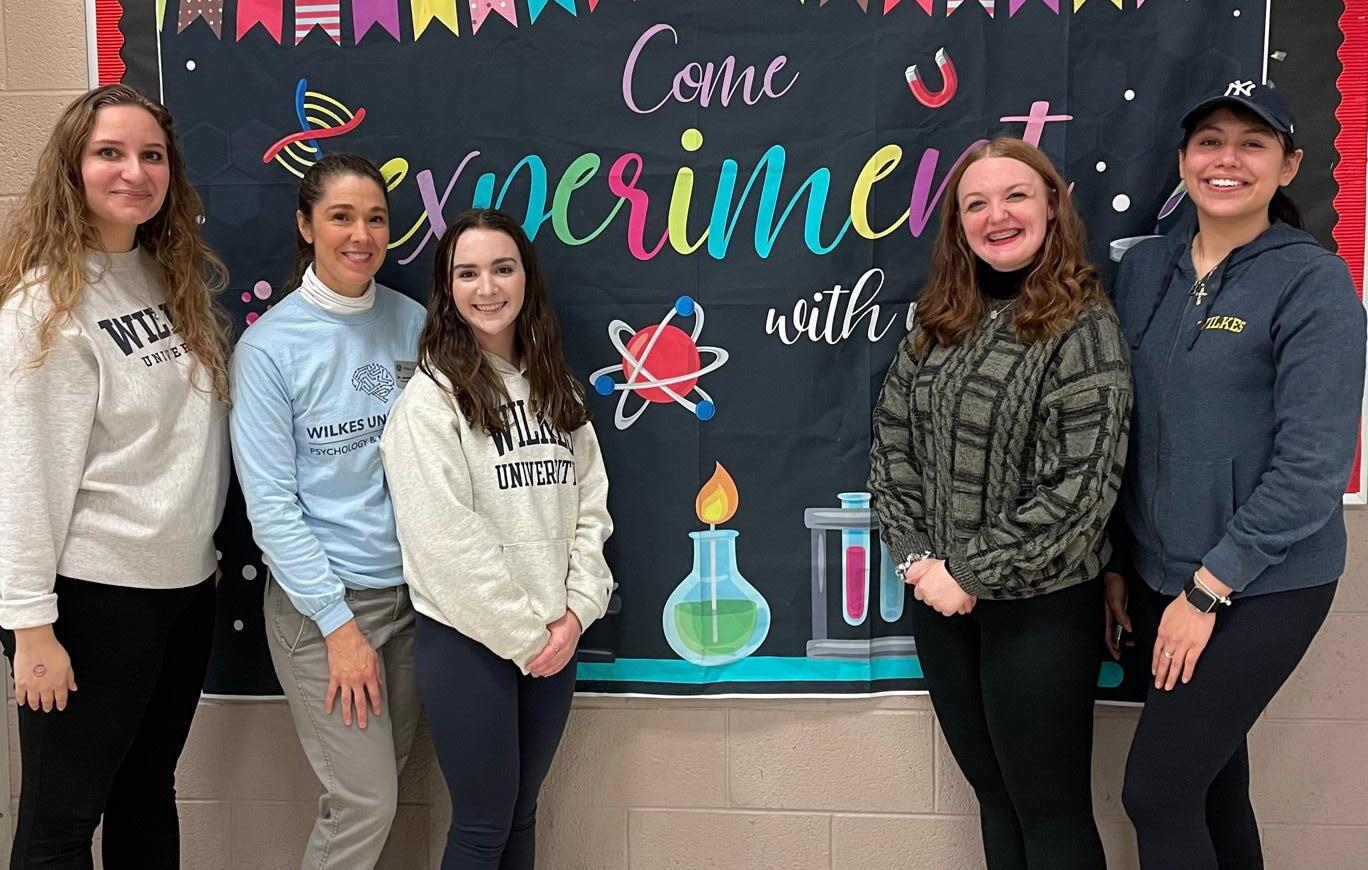
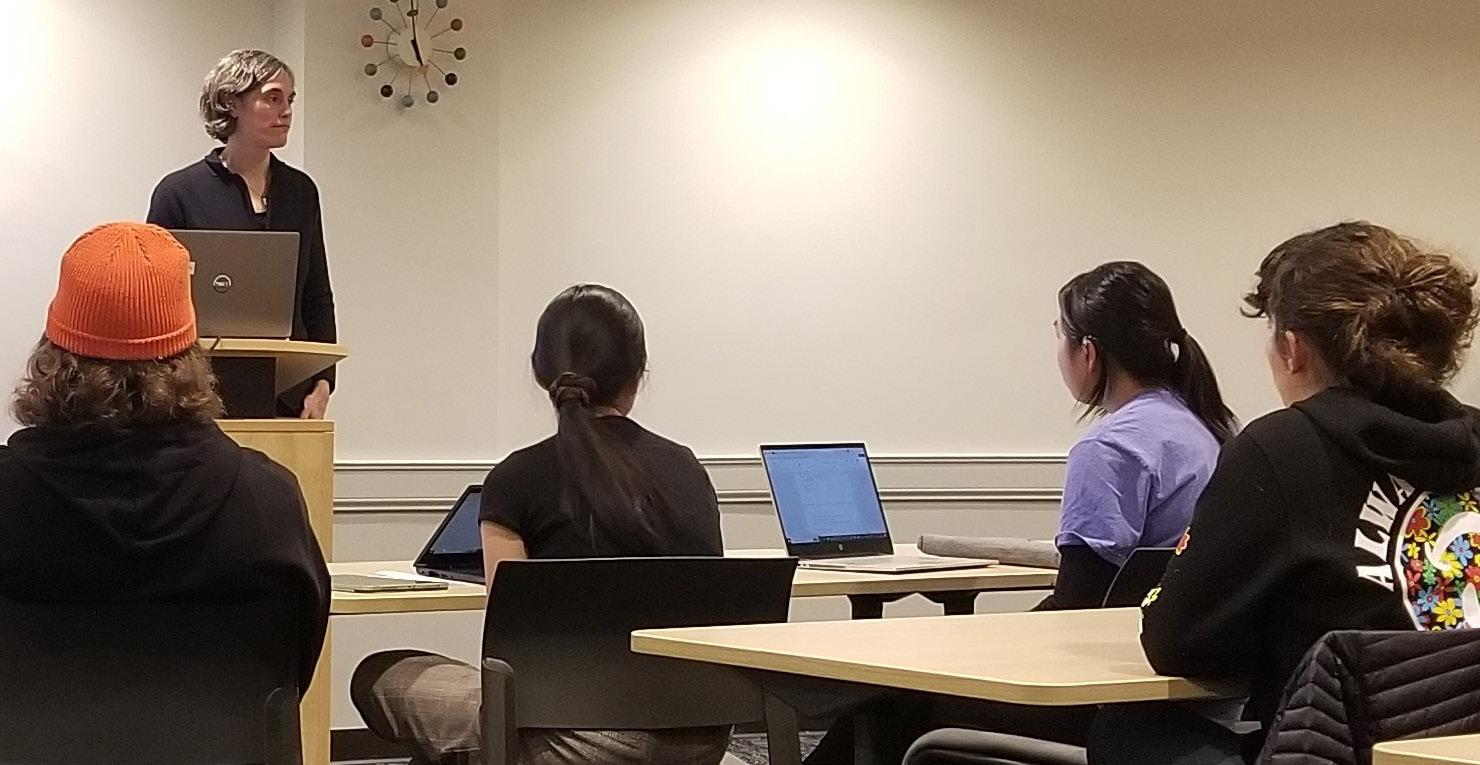

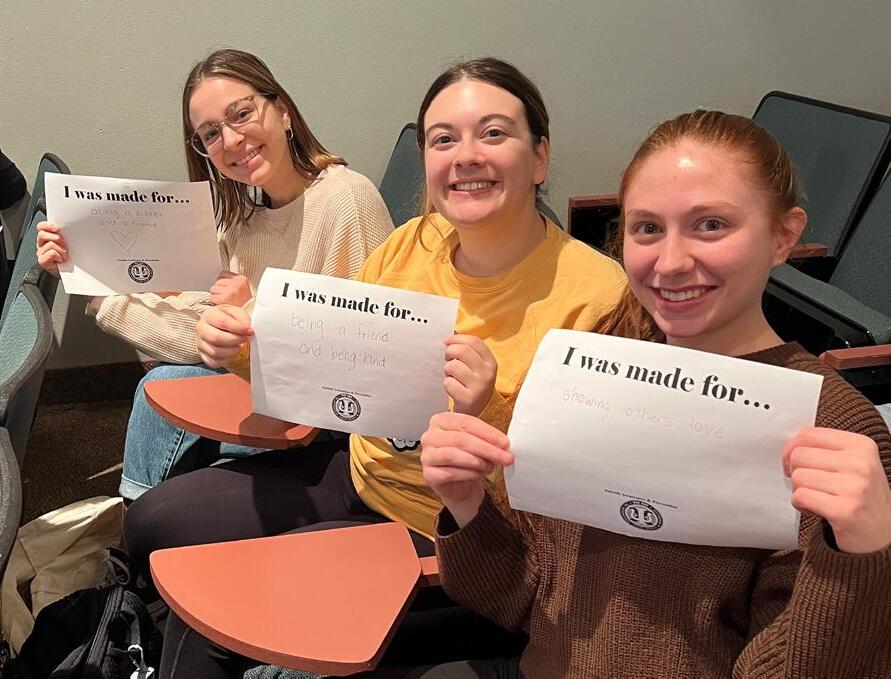
Activities are listed in the following categories:
COMMUNITY SERVICE
• CONVENTION/CONFERENCE
• FUND-RAISING
• INDUCTION CEREMONY
MEETING/SPEAKER EVENT
• RECRUITMENT
• SOCIAL EVENT
Share your chapter’s accomplishments with others in the next issue of Eye on Psi Chi! Chapter officers and advisors are encouraged to visit https://www. psichi.org/page/eye_activity
Submission deadlines*
Fall: June 30
Winter: September 30
Spring: December 15
Summer: February 28
*Reports received (postmarked) after the deadline will appear in the next issue of Eye on Psi Chi
EAST
Marywood University (PA)
MEETING/SPEAKER EVENT: In recognition of National Suicide Prevention Month and as an effort to reduce stigma and begin important conversations, the chapter hosted a suicide awareness and prevention event on September 30, 2022. Dr. Lindsay Morton, assistant professor of psychology and the chapter’s faculty advisor, presented suicide statistics, warning signs and risk factors, common misconceptions, and resources for seeking support for oneself or another in a suiciderelated crisis. Chapter officers facilitated discussions and the ending activity where audience members described their
personal reasons to stay and find out what they were made for in this life.
SOCIAL EVENT: To raise awareness about the mental health resources available to students on and off campus, the chapter created an interactive table to educate and engage peers at a Mental Health Awareness Day event. The “stress-busting” themed table included several activities, all based on research in psychology: a “self-affirmation mirror” that encouraged active statements of self-worth, a “gratitude board” for written expressions of thanks, a “throw it away” activity where students literally trashed a negative thought, and a “self-care playlist” where students each added their selected jam to be broadcasted during the event.
Rochester Institute of Technology (NY)
MEETING/SPEAKER EVENT: The chapter received the 2022–23 Chapter Activity Grant to host a special speaker event called, “The Applications of Psychological Research.” Dr. Rebecca Ashare, associate professor at University at Buffalo, spoke at the event and shared her ongoing interdisciplinary research on cannabis use for symptom and pain management, and its culmination into clinical trials. The event ended with a small reception and a chance for students to speak with Dr. Ashare directly. The event was attended by members from the RIT and SUNY Geneseo chapters, along with other RIT students and faculty.
CHAPTER ACTIVITIES –––––––––––––––––––––––––––––––––––––––––––––––––––––––––––––––––––––––––––––––––––––––––––––––––––––––––––––––––––––––––––––––––––––––––––––––––––––––––––––––––––––––––––––––––––––––––––
ABBREVIATIONS ACHS Association of College Honor Societies APA American Psychological Association APS Association for Psychological Science EPA Eastern Psychological Association MPA Midwestern Psychological Association NEPA New England Psychological Association RMPA Rocky Mountain Psychological Association SEPA Southeastern Psychological Association SWPA Southwestern Psychological Association WPA Western Psychological Association
(Above): Marywood University (PA) Chapter hosting a Mental Health Awareness Day.
(Above right): A Suicide Awareness & Prevention “I Was Made for...” Activity by the Marywood University (PA) Chapter.
(Right): Dr. Rebecca Ashare from University at Buffalo sharing her research for chapter members, faculty, and other students at Rochester Institute of Technology (NY)
COPYRIGHT © 2023 PSI CHI 48 EYE ON PSI CHI SUMMER 2023
(Below): Wilkes University (PA) members helping at the middle school STEM Night.
SOCIAL EVENT: The chapter hosted a Get Into Grad School Night for students interested in applying to graduate school in the fields of psychology. Chapter member and graduate student Michael McTighe discussed common mistakes applicants make on their graduate school applications. Meanwhile, Drs. Tina Sutton and Andrew Herbert shared their personal experiences with graduate school applications and what to look for when choosing a graduate program. Mindy Blake from Career Services shared her advice on constructing a strong curriculum vitae. The event ended with an opportunity for students to ask panelists additional questions.
Wilkes University (PA)
COMMUNITY SERVICE: The chapter held a Mental Health Awareness badge event for a group of 30 senior and ambassadorlevel girl scouts, creating a series of activities centered around destigmatizing mental illness and raising awareness of positive coping strategies.
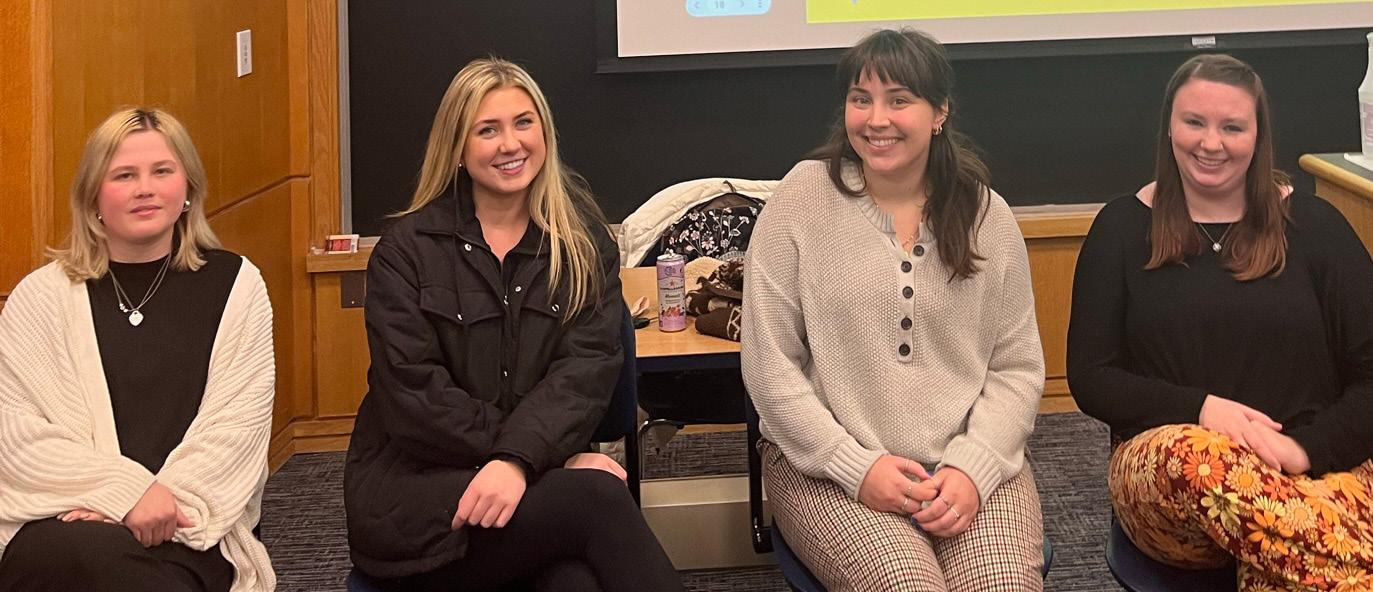
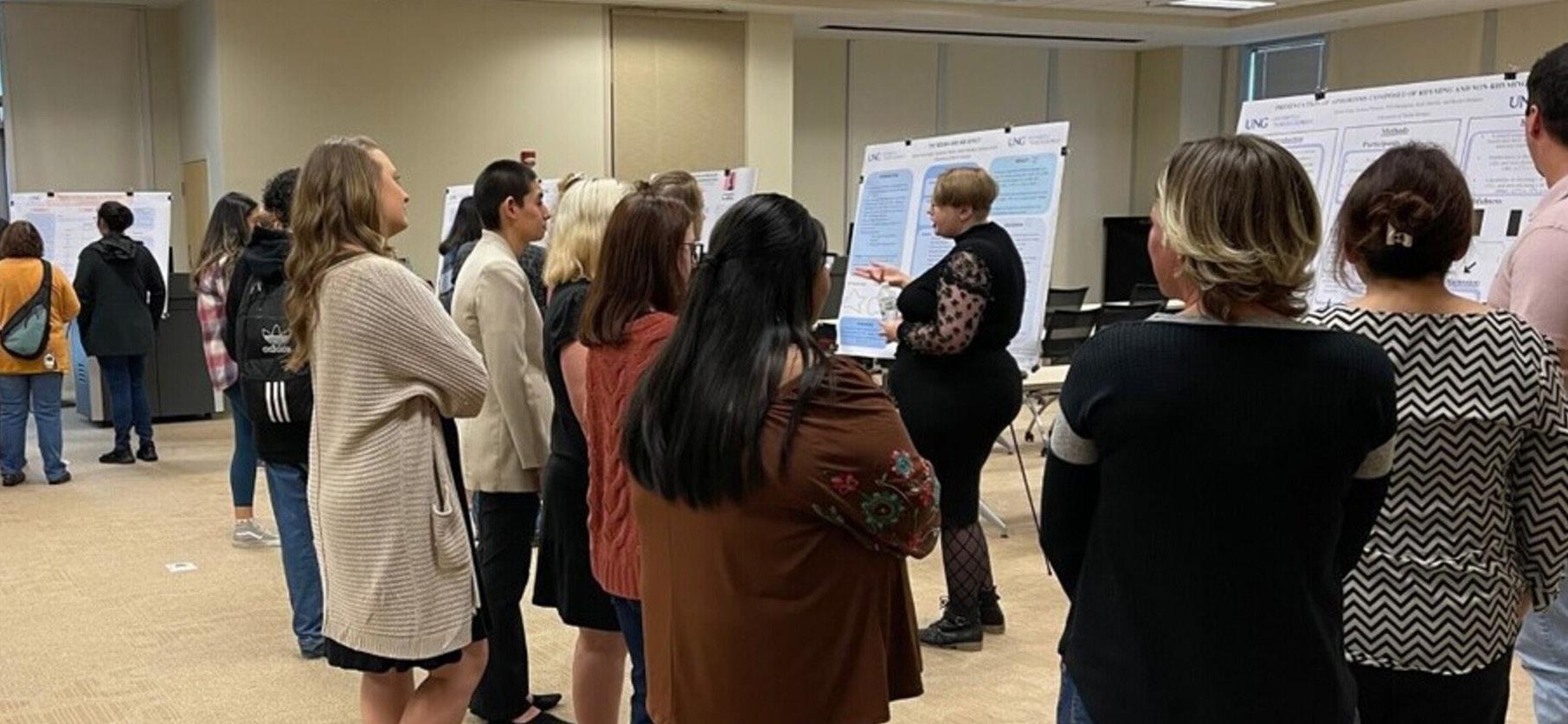
COMMUNITY SERVICE: The chapter participated in STEM Night at a local middle school. To help middle schoolers and their families learn about the brain, sensation, and perception, the chapter led them through a taste experiment to reinforce the importance of the scientific method and the broadness of the psychology field.
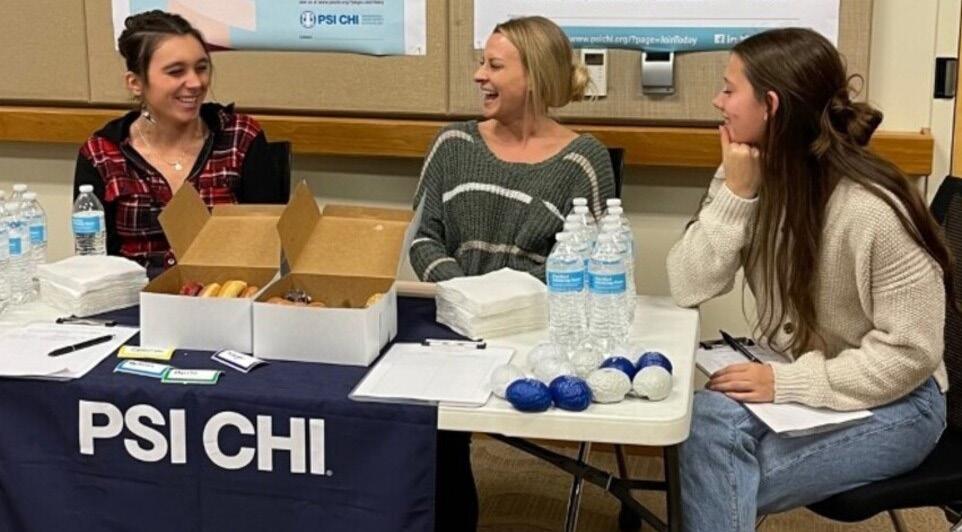
MEETING/SPEAKER EVENT: The chapter
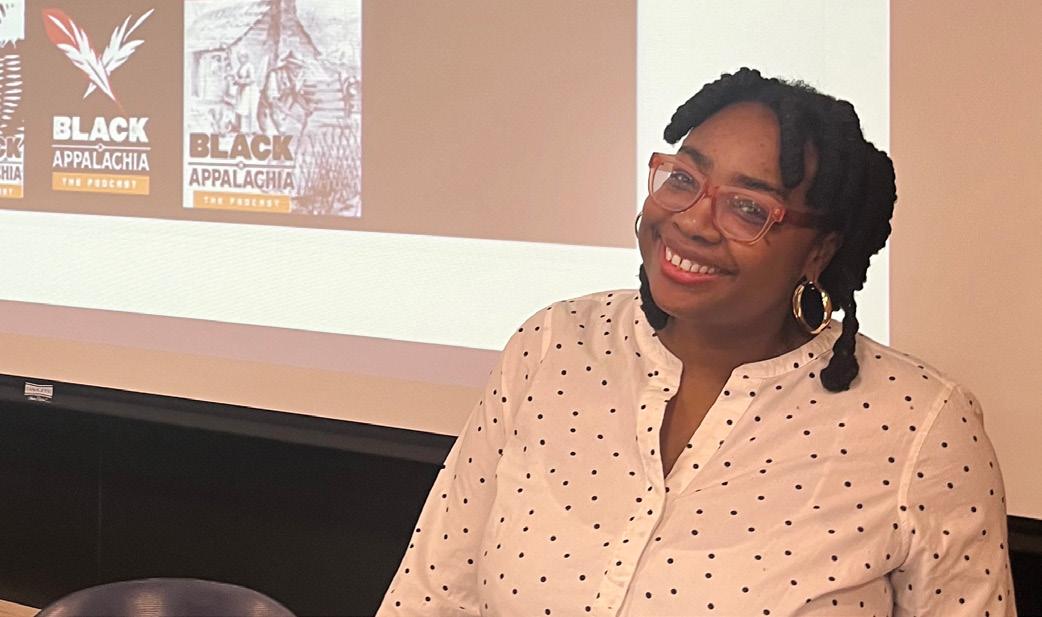
hosted an Alumni Answers Zoom event with alumna Salena Diaz, MA, who is currently a PhD candidate at the University of Hawaii. Salena spoke to the chapter and members of the college community about her path to graduate school. She offered advice regarding how to select and apply to graduate schools as well as suggestions for how to get the most out of the college experience.
SOUTHEAST
University of North Georgia
CONVENTION/CONFERENCE: The chapter hosted a research presentation event where students from many different psychology courses presented
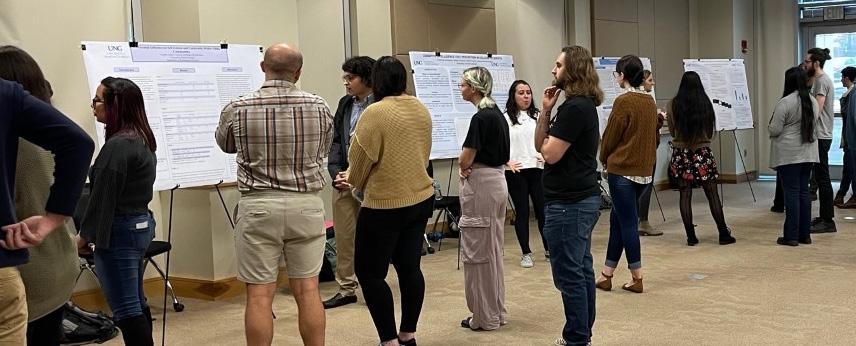
their research findings to the school community. Members helped set up posters, worked booths, and also provided refreshments.
Winthrop University (SC)
COMMUNITY SERVICE: The chapter recently collaborated with the Therapy Resource Group, a nonprofit organization that strives to fill gaps where mental health resources are scarce in the local community. Chapter members painted small figures for use in courtroom dioramas. The dioramas were sold for fundraising and used by lawyers and clinicians to help community members, including children, to understand what happens in courtroom settings. The service
–––––––––––––––––––––––––––––––––––––––––––––––––––––––––––––––––––––––––––––––––––––––––––––––––––––––––––––––––––––––––––––––––––––––––––––––––––––––––––––––––––––––––––––––––––––––––––––––––––––––––––––––––––––––––––––––––––––––––––––––––––––––––––––––––––––––– CHAPTER ACTIVITIES
(Top left): University of North Georgia members providing refreshments to the researchers during the event.
(Top right): West Virginia University PhD students sharing their experiences in their doctoral studies.
(Above left): Students crowding around many of the University of North Georgia research presentations
(Above right): Dr. Enkeshi Thom El-Amin gleams on after discussing her podcast and experience researching Black Appalachians at West Virginia University
49 SUMMER 2023 EYE ON PSI CHI COPYRIGHT © 2023 PSI CHI
(Left): University of North Georgia Chapter filling room with student researchers and faculty.
project allowed members to serve the outside community while building connections within the smaller painting teams. This event also allowed members to bring their creative and artistic talents into the realm of psychology.
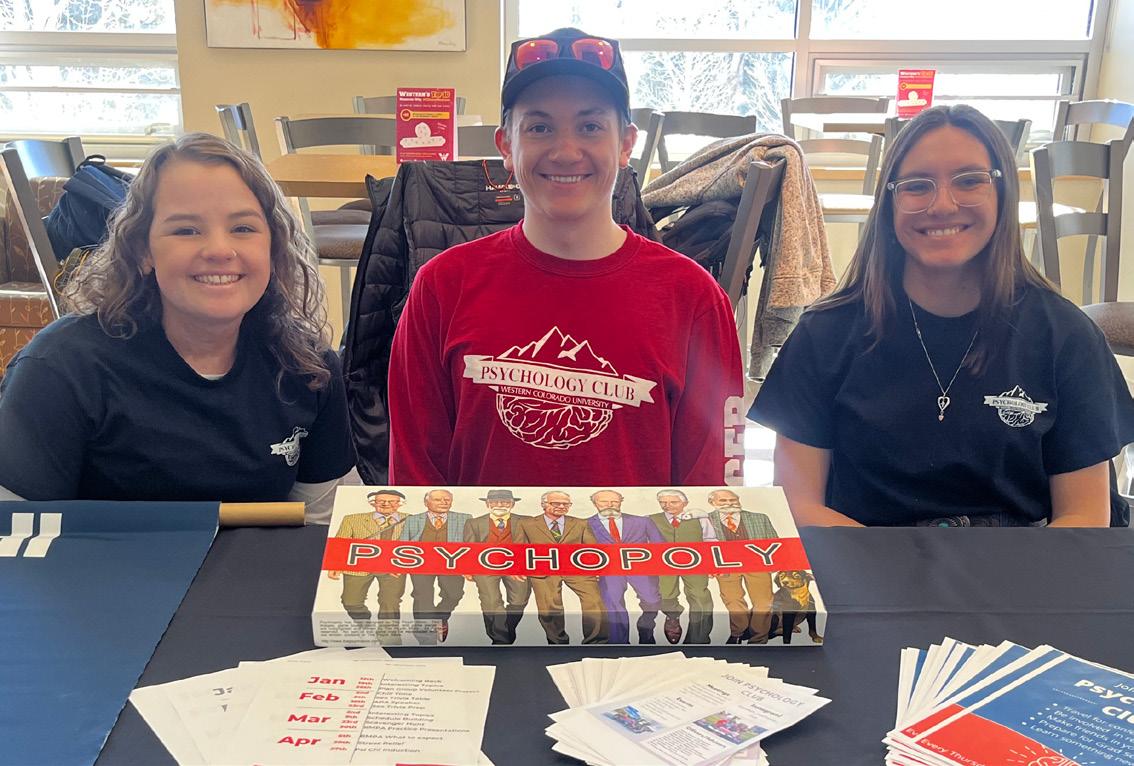
West Virginia University
MEETING/SPEAKER EVENT: Graduate students from the psychology doctoral program (in the areas of behavioral neuroscience and lifespan development) gave advice on graduate school interviews and provided attendees with an inside perspective of their lives in the program.
MEETING/SPEAKER EVENT: Dr. Enkeshi Thom El-Amin, assistant professor in the department of sociology, spoke to chapter members and attendees about her research in the culture and community of Black Appalachians. Dr. El-Amin also described her experiences in podcasting for Tennessee National Public Broadcasting.
ROCKY MOUNTAIN
University of Denver
MEETING/SPEAKER EVENT: The chapter hosted an article discussion
and Q&A for undergraduate members to discuss “ ‘Will talking about race make my child racist?’ dispelling myths to encourage honest White U.S. parent–child conversations about race and racism.” The event’s purpose was to engage undergraduate students with the work of Dr. Sylvia Perry, who visited the University of Denver to speak to the psychology department and related fields about her research. Dr. Perry is a developmental social psychologist exploring the development of racial bias awareness and professor at Northwestern.
SOCIAL EVENT: The chapter held a table for World Mental Health Day
and handed out positivity stickers, succulents, snacks, and giveaways. This was an opportunity to connect with undergraduate psychology students and peers in a welcoming, fun environment.


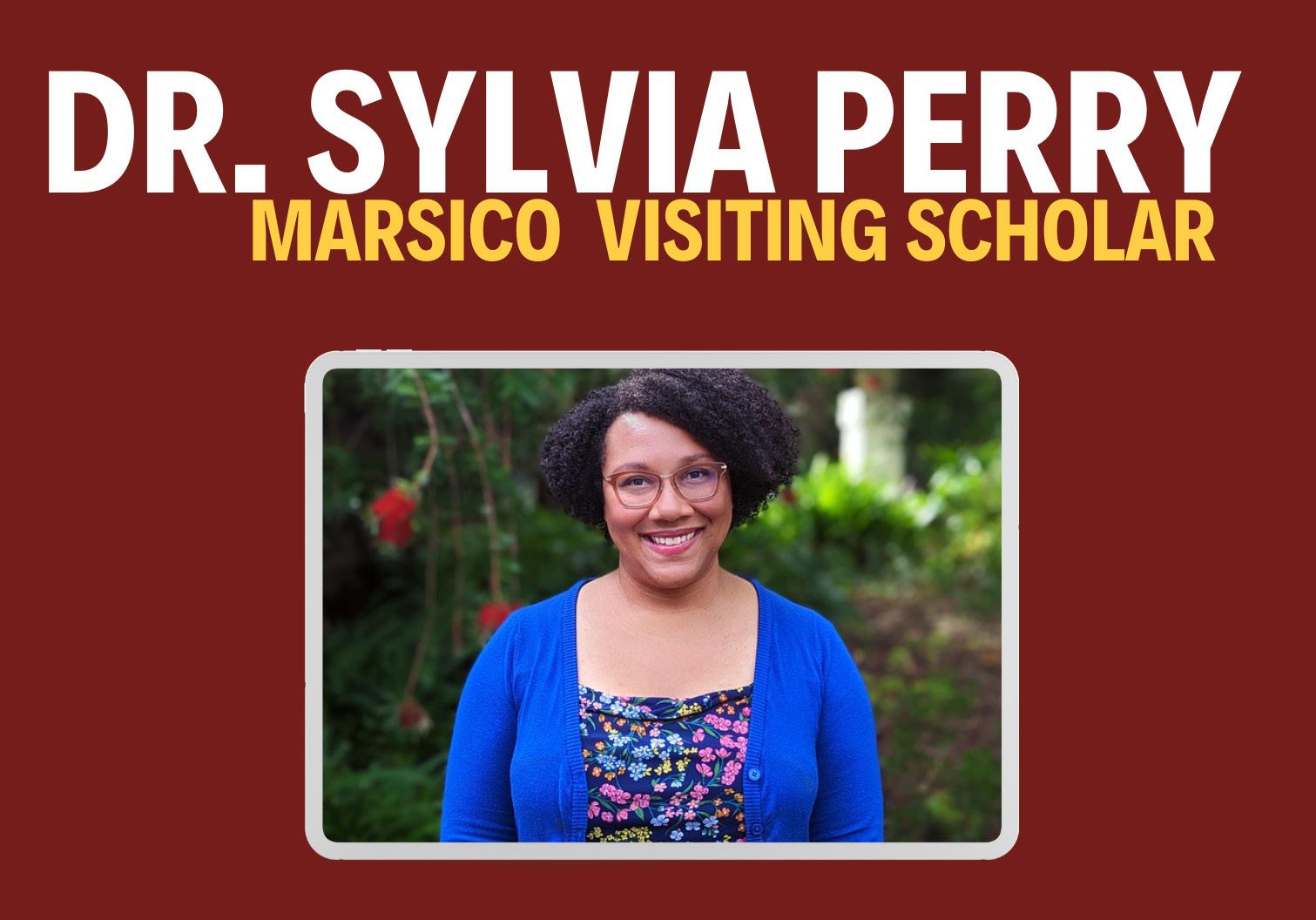
Western Colorado University
SOCIAL EVENT: The chapter cohosted a table with the psychology club to show their support of sexual education for Western Colorado University’s students in effort to combat the taboo topic, providing personal products. The students running the table set up trivia games and prizes in preparation for an upcoming Sex Trivia Night. The tabling event created sparked student interest for the trivia night, as well
CHAPTER ACTIVITIES –––––––––––––––––––––––––––––––––––––––––––––––––––––––––––––––––––––––––––––––––––––––––––––––––––––––––––––––––––––––––––––––––––––––––––––––––––––––––––––––––––––––––––––––––––––––––––––––––––––––––––––––––––––––––––––––––––––––––––––––––––––––––––––––––––––––
(Above): Western Colorado University Chapter members advocate for the student population by promoting sexual education and the annual Sex Trivia night, supported by the psychology club and led by other campus organizations.
(Above right): Western Colorado University members and psychology club officers at the psychology club table for the Admitted Students Day Club Fair.
(Right): Dr. Sylvia Perry visiting University of Denver
50 COPYRIGHT © 2023 PSI CHI EYE ON PSI CHI SUMMER 2023
(Far right): University of Denver’s table for World Mental Health Day.
as the chapter and psychology club.
RECRUITMENT: The psychology club officers attended the Admitted Students Day Club fair to welcome new psychology majors and minors to the chapter group. They discussed different opportunities in the psychology department such as student researching, Psi Chi membership, weekly psychology club meetings, and the annual RMPA convention. The chapter is hopeful to expand even more next year by the attendance from incoming students.
WEST
University of California, Riverside
RECRUITMENT: The chapter connected
and empowered future psychology students and chapter members with welcoming stories through a digital library composed of exclusive interviews with faculty, graduate students, and undergraduates called Love at First Psych!

SOCIAL EVENT: Chapter members competed and won a game of Wordle Browl, a five-word game to correctly guess a word through the use of teamwork. The room was full of excitement and laughter while everyone pursued the title of Wordle Champion!

COMMUNITY SERVICE: The chapter held a community service event through Charity Miles to raise
money for Active Minds, a nonprofit organization that provides mental health awareness and resources for young adults. The chapter collectively walked 1,684 miles and raised $400, while practicing physical self-care.
The University of Victoria (British Columbia, Canada)
COMMUNITY SERVICE: The chapter hosted its annual end-of-semester celebration, supporting the Victoria Shoebox Project. Over 20 students came to enjoy pizza, refreshments, and sweets while wrapping and filling shoeboxes to give to women impacted by homelessness in Victoria. Using


donations from friends, faculty, and community members, the chapter filled 27 boxes, surpassing last year’s 23 boxes and the 25-box goal set for this year. This event was highly successful, positively impacting the community and providing the chapter’s students with a bonding opportunity at the end of the semester.

–––––––––––––––––––––––––––––––––––––––––––––––––––––––––––––––––––––––––––––––––––––––––––––––––––––––––––––––––––––––––––––––––––––––––––––––––––––––––––––––––––––––––––––––––––––––––––––––––––––––––––––––––––––––––––––––––––––––––––––––––––––––––––––––––––––––– CHAPTER ACTIVITIES
(Top left): University of California, Riverside chapter members at Wordle!
(Above left): University of California, Riverside’s Love at First Psych! digital library
(Above right): Some of the University of Victoria (British Columbia, Canada) Chapter officers and members standing with the filled shoeboxes.
(Far Left): A portion of the donations that the University of Victoria (British Columbia, Canada) Chapter collected to support the Victoria Shoebox Project, an organization benefiting women impacted by homelessness.
51 SUMMER 2023 EYE ON PSI CHI COPYRIGHT © 2023 PSI CHI
(Left): With 37 filled shoeboxes wrapped and stacked, University of Victoria's (British Columbia, Canada) Psi Chi copresidents Justin Bonnieux instructs members on the next steps for delivery.





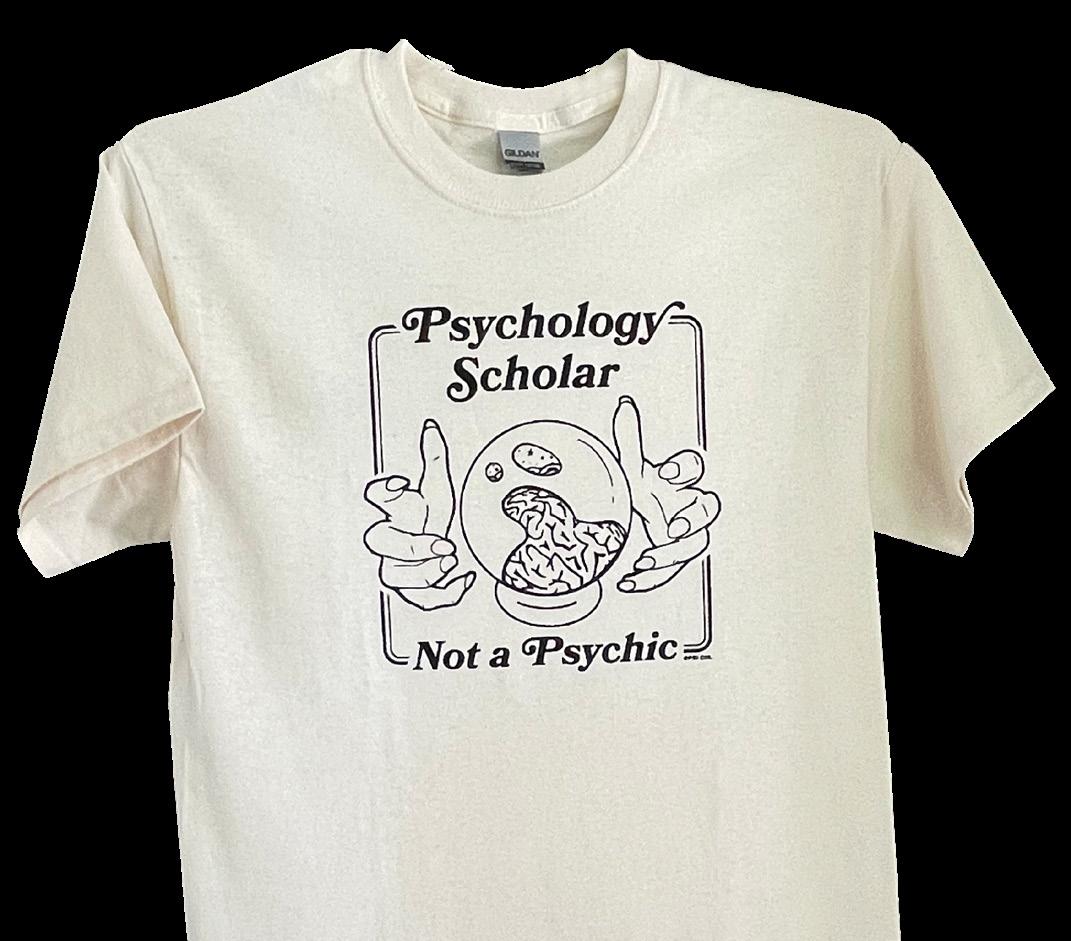
Follow our social account for sales and special discount codes Shop at Store.PsiChi.org Front Back See you at the beach! ADVERTISEMENT









 Shawn R.
PhD University of Central Arkansas
Shawn R.
PhD University of Central Arkansas


 Seungyeon Lee, PhD University of Central Arkansas
Seungyeon Lee, PhD University of Central Arkansas















 The first class of Wenzhou-Kean University Psi Chi members pictured with university faculty and staff at their induction ceremony. Due to pandemic-related restrictions on public gatherings, only a small number of students were allowed to attend the event in person with some guests joining the ceremony through the Internet.
The first class of Wenzhou-Kean University Psi Chi members pictured with university faculty and staff at their induction ceremony. Due to pandemic-related restrictions on public gatherings, only a small number of students were allowed to attend the event in person with some guests joining the ceremony through the Internet.






































































